|
Short term crop loan scheme to farmers at zero percent interest rate will continue
MMNN:06 Feb 2024
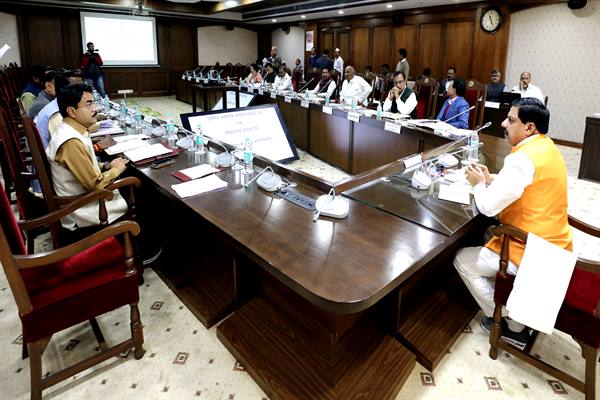
Bhopal :
The meeting of the Council of Ministers was held in the Ministry under the chairmanship of Chief Minister Dr. Mohan Yadav. To boost agricultural productivity, the Council of Ministers has approved continuing the scheme of providing short-term crop loans to farmers at zero percent interest rate in the year 2023-24. Crop loans will be provided to farmers through cooperative banks. In the scheme, the due date of Kharif 2023 season has been kept as March 28, 2024 and for Rabi 2023-24 season, June 15, 2024. Under the scheme, the state government will give 1.5 percent (normal) interest subsidy to all the farmers taking crop loan and 4 percent incentive (additional interest subsidy) to the farmers who repay the loan till the stipulated due date of Kharif and Rabi season. It is noteworthy that in Madhya Pradesh Sankalp Patra 2023, the state government has resolved to provide crop loans to farmers at zero percent interest to boost agricultural productivity.
Approval of operation of child help line at district level in the state
The Council of Ministers approved amendment in the departmental order for smooth and efficient operation of the Child Help Line in Mission Vatsalya. According to the amendment, a helpline unit will be operated by the District Child Protection Unit at the district level. Human resources for this work will be selected through a transparent process by issuing advertisements as per the qualifications prescribed by the Government of India. All the staff of Child Help Line will be hired on contract.
Approval of Madhya Pradesh University (Amendment) Bill
The Council of Ministers approved the proposal to amend the Madhya Pradesh University Act, 1973 through the Madhya Pradesh University (Amendment) Bill, 2024. The Higher Education Department was authorized to take action regarding reinstating and passing the bill in the upcoming assembly session. According to the amendment in the bill, approval has been given to change the designation of Vice-Chancellor in universities to Vice-Chancellor.
other decisions
The Council of Ministers approved the excise policy for the financial year 2024-25 in relation to the execution of liquor shops in the state, local/foreign liquor supply system, execution of retail shops selling cannabis, bhangghota and others. It was decided to increase the annual price of liquor shops by 15% for the year 2023-24.
CACP with member states from western India holds discussions on MSP of Kharif crops
MMNN:02 Feb 2024
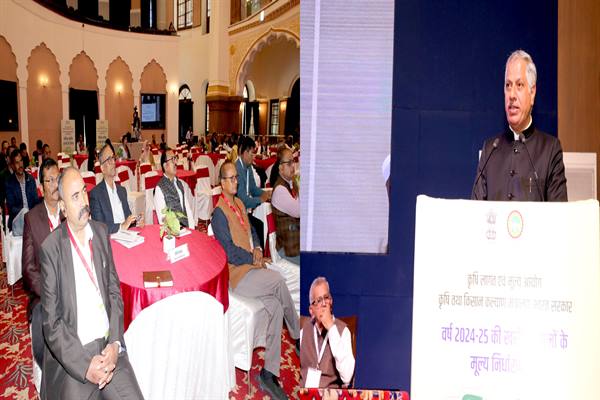
Bhopal :
The Commission for Agricultural Costs and Prices, Union Ministry of Agriculture and Farmers Welfare with the member states from western India discussed in detail about deciding minimum support price for Kharif crops for the year 2024-25 at Kushabhau Thakre International Convention Centre here today.
Madhya Pradesh, Maharashtra, Gujarat, Rajasthan, Union Territory Dadra Nagar Haveli, Daman and Diu participated in the meeting.
The member States also held discussions on strengthening farmers' committees, popularizing custom hiring centres, expanding area of millets in Rajasthan-Maharashtra and the strategic measures to become self-reliant in pulses production.
Chairman, Agricultural Costs and Prices Commission, Government of India, Shri Vijaypal Sharma urged the stakeholders of the Commission, farmers, Government, traders to give recommendations to the Commission on a range of issues including assessment of import-export of Kharif crops, pulses and oilseeds, consumer demand, procurement, cost of production, research and support price.
Member Secretary, Agricultural Costs and Prices Commission, Shri Anupam Mitra asked the states to receive recommendations from the Commission for support prices for paddy, millet, maize, soybean, groundnut, jowar, pulses-oilseed crops and spice crops.
Commission member Shri Ratanlal Daga stressed on strengthening of procurement system, proper arrangement of irrigation as well as robust arrangements for marketing to reduce the cost prices.
Chairman Agricultural Costs and Prices Commission, Maharashtra, Shri Pasha Patel recommended the proposed rates of minimum support price for various Kharif crops mainly soybean and cotton. He informed about the difference by doing a comparative and factual analysis of the rates of different states. He said that crops should be decided according to global warming and rainfall conditions.
The technical session was inaugurated by Additional Chief Secretary Farmers Welfare and Agricultural Development Madhya Pradesh Shri Ashok Baranwal. He informed Commission about irrigation, irrigation pumps, farm mechanization, and production of various crops. He requested to extend the limit imposed by the Government of India on various agricultural produce in procurement.
Madhya Pradesh gains visibility in global agri-export market
MMNN:02 Feb 2024
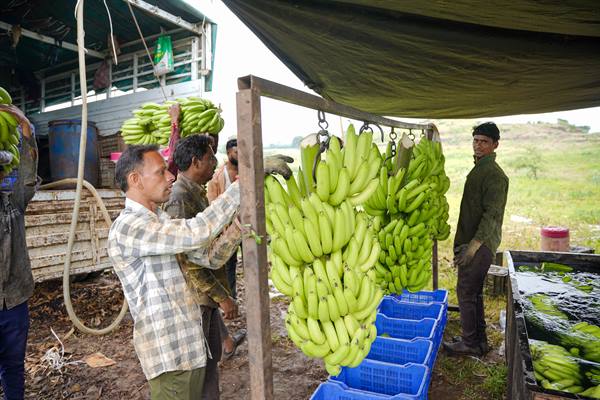
Bhopal :
Madhya Pradesh is gaining visibility in the global agree export market.It is exporting 30 thousand metric ton banana annually from Burhanpur district alone to Iraq, Iran, Dubai, Bahrain and Turkey.The fame of Banana of Burhanpur has gone far and wide. Thanks to the banana growers whose enterprise has earned a distinct identity for Burhanpur. About 19000 banana farmers are cultivating 23,650 acre producing 16.54 lakh metric ton annually. They have enthusiastically harnessed the export opportunities after banana was adopted in One District One Product scheme.
Owing to profound interest of farmers in export market and favourable trading infrastructure and good number of export facilitating units,the banana of Burhanpurhas found good domestic and international market. Mainly G-9, Basrai,Harshali,Srimanthivarieties are commonly grown. Banana is being promoted under Prime Minister Formalization of Micro Food Processing Enterprises Scheme under which Burhanpurhas 30 banana chips processing units. Some are producing banana powder also and exploring markets.
Praveen Patil is happy with his handsome profit. He owns 60 acres in Dapora village, which is 16 km from Burhanpurdistrict headquarters.Dapora is a gram panchayat having nearly 700 households.He learnt basics of banana farming from his father and grandfather.
Praveen informs that last two seasons were good. We got handsome rate between Rs. 2,000 to Rs. 2,500 per quintalaccording to market demands. Not every season goes well. Many a time demand and supply have huge gap.
About the cost of farming Praveen informs that it comes about Rs. 140 per plant. He informs that he plants 300 to 500 plants, which produce 450 to 500 quintals if everything goes well. Excessive rainfall, weather and waterlogging in fields bring harm to the banana plants, which fall prey to cucumber mosaic virus - CMV. There is no option but to destroy infected plants, he adds.
He is elder in 15 number joint family. Two younger brothers stay with him. His son RohalPatil is studying mechanical engineering in a private University at Indore, while ShvetalPatil is studying computer science in the same University. They occasionally participate in farming activity during study intervals.
He further informs that Burhanpur banana has secured good domestic market. Our banana goes to New Delhi and Haryana. I am also in contact with those who are into agriculture export.
Just 19 km from Burhanpur is Ichhapur village where density of banana farmers is quite high. Mostly they practice conventional farming. Rahul Chauhan, a 37- year old farmer owns 25 acres. He became acquainted with various stages of banana cultivation since childhood. He lives in a joint family of 17 members. He is the eldest among four brothers. his son VishwanathPratap Singh Chauhan is studying in 2nd standard while daughter Priya is in 6th class. He has one tube well and a traditional well. He knows well the economics of farming. Elaborating on profit and loss, he says that it all depends on the behaviour of weather and market. Many a time market rates are good but crop is poor. Sometimes, crop is handsome but rates are poor. He is also concerned about the pest attack saying that CMV virus is a the only potential threat to healthy banana plant. He says that we have to root out fully grown-up plants if they catch CMV.
He informs that the days are gone when ancestors had belief that more plants more yield.We are planting in 8 x 5 feet space. Per acre 1,200 plants are grown. In past, it was 1,800 plants per acre. The cost of per plant comes about Rs 140 to 150. One acre gives Rs. 1.5 lakh profit. Thus, I earn Rs. 25 lakh in one season. This includes farming cost, which comes aboutRs. 8 lakh.
Rahul further informs that one acre farming cost is about Rs. 70 thousand. A fully grown-up plant givesa bunch of 15 kg to 20 kg. If cared well, it goes to 30 or 35 kg per bunch. He feels that Mandisystem needs to improve operational functioning in the interest of banana growers. Procedural delay in selling the produce affects prospects of handsome profit.
There are small farmers like Rajendra Chaudhary of Shahpur village, which is 11 km from district headquarters. He has four acres on which he grows 5000 plants. He earns average Rs. 5 lakh. He says that the market in last two three seasons has been extremely favourable to farmers. His son MohitChaudhari is pursuing MBA from a local management college, while younger son Aniket has done diploma in fitter trade from nearby Khaknar government polytechnic.
Banana production has led to emergence of banana chips processing units. Presently,Burhanpur has 30 such units. Yogesh Mahajan runs banana chips making unit MarutiChips. His annual turnover is about Rs. 20 to 25 lakh. He says that abundant availability and constant supply of banana prompted him toopen chips making unit. He purchases direct from farmers. Purchase rate varies according to crop arrival. Average Rs. 5 per kg is the purchase rate from the fields. After processing,one kg chips pack costsRs. 150 as wholesale rate while market retail price is Rs. 200 per kg. About the market management, he says that banana chips are liked for their quality. Quality of chips depends on maintenance of hygiene, frying technique, use of quality edible oil,crispiness. He says that local women have been engaged for chips making. After initial training, they are now skilled. He says that he has good customer base and some outlets in metro citieslike Bhopal. The Burhanpur banana chips is now a household name. He says that banana farmers must get handsome profit so that our chips making units also survive well.Banana growers like GokulChaudhari, TusharPatil, cheered wholeheartedly when Burhanpur recently got Special Mention award under National One District One Product Award-2023.
Interest waiver of Rs 2 thousand 123 crore for more than 11 lakh defaulter farmers
MMNN:9 May 2023
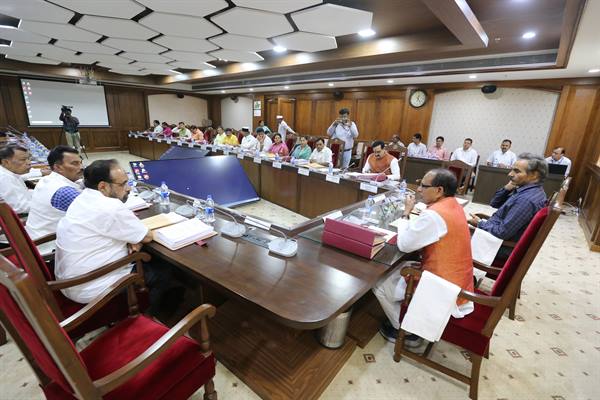
Bhopal :
In the cabinet meeting chaired by the Chief Minister Shri Shivraj Singh Chouhan today at the Mantralaya, the outstanding interest on 11 lakh 19 thousand defaulter farmers up to Rs. The interest waiver scheme was approved to waive the amount of Rs 2 thousand 123 crore. This scheme was approved by the Council of Ministers in accordance with the announcement of Chief Minister Shri Chouhan, "The amount of interest will be paid by the government to those farmers who have become defaulters due to loan waiver". The state government will compensate the defaulter farmers who have outstanding loans of up to Rs. 2 lakh including principal and interest as on March 31, 2023 from Primary Agricultural Credit Cooperative Societies (PACS).
According to the scheme, the farmer should have a loan of up to Rs 2 lakh including short-term crop loan and medium-term converted loan with interest till March 31, 2023. Defaulter farmers will have to apply in their committee to avail interest waiver. The list containing the details of outstanding loan and interest etc. on the defaulter farmers will be made public through a portal at the bank level. Along with this, special facility has been given to the farmers to provide fertilizers for agricultural work. The amount deposited by the farmer in cash in his loan account, he will be able to get fertilizer up to that amount in the form of loan from the committee. The last date of the scheme has been fixed as November 30, 2023. Detailed instructions of the scheme will be issued by the Cooperative Department.
KhandwaCreation of new subdivision in Chhatarpur and Dewas
The cabinet approved creation of new subdivisions at Khalwa in Khandwa district, Gaurihar in Chhatarpur and Tonkkhurd in Dewas. Patwari light numbers 1 to 6, 8 to 15, 43 to 49, 51, 52 of Tehsil Khalwa Tehsil Khalwa in New Subdivision Khalwa and patwari light numbers 7, 16 to 39 of Revenue Inspector Circle Khalwa. A total of 25 lighters and Patwari lighter number 40 to 42, 50, 53 to 71 of the Revenue Inspector Circle Roshni, a total of 23 lighters, thus a total of 71 lighters will be included. After the creation of Khalwa, Patwari Halka No. 1 to 16 of Revenue Inspector Mandal Killaud in Harsud Tehsil Harsud and Patwari Halka No. 17 to 33 of Revenue Inspector Mandal Harsud and Patwari Halka No. 34 to 50 of Revenue Inspector Mandal Chanhera thus total 50 lightweight will be included. 1 steno typist for the efficient operation of the section,
New sub-division Gaurihar in District Chhatarpur will include all Patwari Halka numbers 1 to 74 of Tehsil Gaurihar, thus a total of 74 Patwari Halkas. After the formation of Gaurihar sub-division, the remaining sub-division Lavkushnagar will include Patwari Halka number 1 to 28 of Tehsil Lavkushnagar and Patwari Halka number 1 to 39 of Tehsil Chandla, a total of 67 Patwari Halka. For the efficient operation of the new section, 1 post of steno typist, 2 of assistant grade-2, 3 of assistant grade-3, 1 of vehicle driver and 4 of peon, thus a total of 11 posts have been approved.
The new subdivision Tonkkhurd in District Dewas will comprise all 60 Patwari Halke of Tehsil Tonkkhurd. After the formation of the new subdivision, all the 69 Patwari Halke of Tehsil Sonkutch will be included in the remaining Sonkutch subdivision. For the efficient operation of subdivision Tonkkhurd, 1 post of steno typist, 2 of assistant grade-2, 3 of assistant grade-3, 1 of vehicle driver and 4 of peon, thus a total of 11 posts have been sanctioned.
of revenue departmentRs 129 crore 32 lakh approved for WebGIS 2.0 project
The Council of Ministers made a technical and financial proposal for the next 5 years (2023-2024 to 2027-2028) to implement the WebGIS 2.0 project of the Revenue Department, spending Rs 129 crore 32 lakh (GST extra). Approved to be done.
MoU decision to develop Rewa airstrip as airport
MoU between the authority and the state government to develop the Rewa airstrip by the Council of Ministers as an airport by the Airports Authority of India in the regional connectivity plan of the Government of India. It was decided to execute. As per the demand of the state government, orders have been issued regarding allotment / making available government land available for the existing airstrip and additional land for ATR-72 (VFR & IFR) type aircraft operation.
disposal of public property
The cabinet approved Khasra No. 684/1, ward no. 2 Lavkush Nagar's asset total rakba 5670 square meters for disposal, recommending the highest tender amount of Rs. After depositing 100 percent of the tender amount by the H-1 tenderer, it was decided that the contract/registry proceedings would be done by the district collector.
Formation and Promotion of Farmer Producer Organizations Scheme will be beneficial : Agriculture Minister Shri Patel
Agriculture Minister thanks CM Shri Chouhan on behalf of the farmers of the state
MMNN:5 May 2023
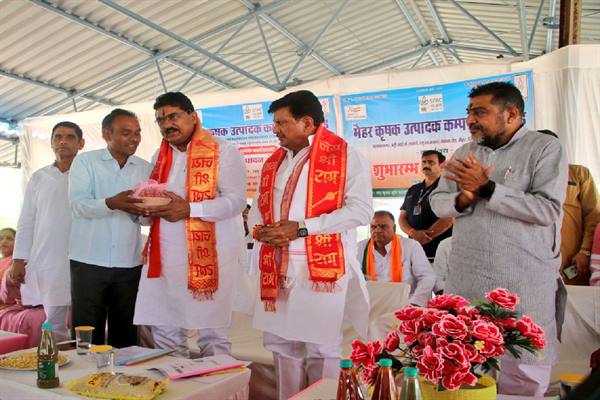
Bhopal :
Farmers Welfare and Agriculture Development Minister Shri Kamal Patel has expressed gratitude to Chief Minister Shri Shivraj Singh Chouhan on behalf of the farmers of the state. He said that the new Farmer Producer Organizations (FPO) Formation and Promotion Scheme made to enrich the farmers would prove to be very beneficial. The scheme was approved in the Cabinet on Thursday under the chairmanship of Chief Minister Shri Chouhan.
Agriculture Minister Shri Patel said that a new plan has been made to encourage formation of minimum 2 farmer producer organizations in each development block in the state. The scheme will be run by the Agriculture Department. Handholding will be provided to the FPOs to be formed under the scheme. This will help the FPO members to use quality inputs and advanced agricultural machinery as well as post harvest techniques. Minister Shri Patel has told that FPO will be linked with the market.
Minister Shri Patel said that a provision of a total amount of Rs 50 crores has been made in this scheme to be operated till the year 2025. In this, a provision of Rs 20 crore 99 lakh has been made for the year 2023-24 and Rs 29 crore one lakh for the year 2024-25. Under the scheme, a maximum of Rs 18 lakh will be provided per FPO for 3 years. FPOs will be provided Rs 2,000 per farmer as equity grant, with a maximum of Rs 15 lakh. The scheme will be implemented by the State Level Implementation Committee constituted under the chairmanship of the Agriculture Production Commissioner.
Minister Shri Patel participates in Israel's 75th Independence Day program
Colorful program held at Delhi Embassy
MMNN:1 May 2023
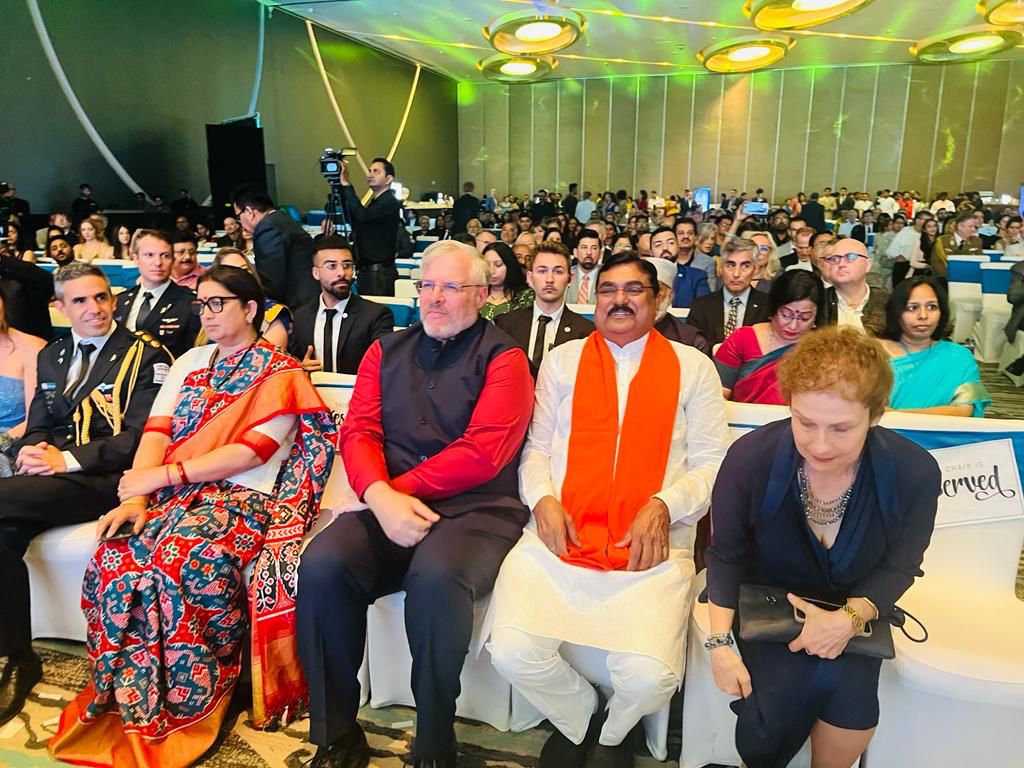
Bhopal :
Farmers-Welfare and Agriculture Development Minister Shri Kamal Patel congratulated Israel for its Platinum Jubilee of Independence and best wishes. Minister Shri Patel attended Israel's 75th Independence Day function as a special guest on 30th April at the Embassy in Delhi.
Minister Mr. Patel was warmly greeted by Israel's Ambassador Naor Gillon along with his colleagues. The Platinum Jubilee of Israel's Independence (75 years) was marked by a colorful cultural program at the Embassy. It was attended by Union Minister Smt. Smriti Irani, famous cricketer Mr. Kapil Dev, guests from different nations and dignitaries.
Agriculture Minister Mr. Patel inaugurated construction works worth Rs. 2.5 crore
Listened to Prime Minister Shri Modi's "Mann Ki Baat" program in Harda
MMNN:30 April 2023
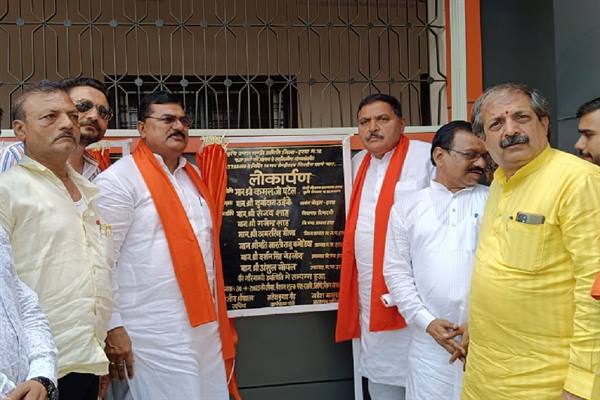
Bhopal :
Farmers Welfare and Agriculture Development Minister Shri Kamal Patel listened to the 100th episode of Prime Minister Shri Narendra Modi's "Mann Ki Baat" program along with local public representatives at Harda Agricultural Produce Market Complex on Sunday. He also inaugurated the newly constructed works in Mandi premises at a cost of about Rs 2.5 crore. District Panchayat President Mr. Gajendra Shah, Mr. Amar Singh Meena and citizens including public representatives were present.
Agriculture Minister Mr. Patel inaugurated a high-rise shed constructed with Rs. one crore 54 lakh from Mandi Board fund in Mandi premises and 18 nos. He also inaugurated the beautification work of farmers' rest house costing Rs 20 lakh.
Agriculture Minister Shri Patel also handed over the lien letters to the beneficiaries in the programme. He handed over the lien letters to Sarvashri Rohit Patel, Ramvilas Masania, Ramnivas Vishwakarma, Kailash, Jitendra, Mahesh Geete, Balkrishna Nagve, Jamunadas and Ravi.
Agriculture Minister Mr. Patel inaugurated construction works worth Rs. 2.5 crore
Listened to Prime Minister Shri Modi's "Mann Ki Baat" program in Harda
MMNN:30 April 2023

Bhopal :
Farmers Welfare and Agriculture Development Minister Shri Kamal Patel listened to the 100th episode of Prime Minister Shri Narendra Modi's "Mann Ki Baat" program along with local public representatives at Harda Agricultural Produce Market Complex on Sunday. He also inaugurated the newly constructed works in Mandi premises at a cost of about Rs 2.5 crore. District Panchayat President Mr. Gajendra Shah, Mr. Amar Singh Meena and citizens including public representatives were present.
Agriculture Minister Mr. Patel inaugurated a high-rise shed constructed with Rs. one crore 54 lakh from Mandi Board fund in Mandi premises and 18 nos. He also inaugurated the beautification work of farmers' rest house costing Rs 20 lakh.
Agriculture Minister Shri Patel also handed over the lien letters to the beneficiaries in the programme. He handed over the lien letters to Sarvashri Rohit Patel, Ramvilas Masania, Ramnivas Vishwakarma, Kailash, Jitendra, Mahesh Geete, Balkrishna Nagve, Jamunadas and Ravi.
No stone will be left unturned to bring the farmers out of the crisis - CM Shri Chouhan
MMNN:28 April 2023
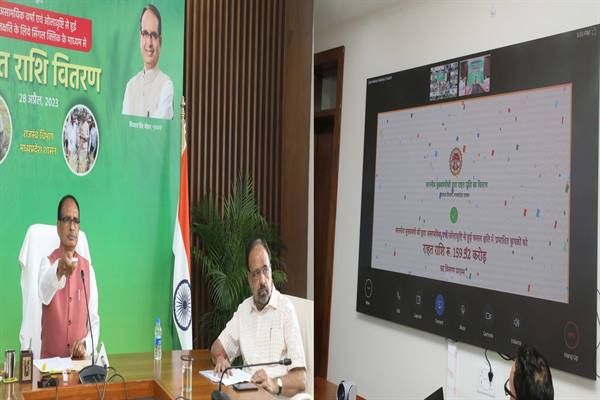
Bhopal :
Chief Minister Shri Shivraj Singh Chouhan said that this time in the state, crops were damaged in three rounds due to hailstorm and untimely rains. The government has decided to distribute the relief amount after conducting a survey of the crops. The government stands with the farmers in the hour of crisis. No stone will be left unturned to bring the farmers out of the crisis.
The Chief Minister said that Madhya Pradesh is the only state where maximum relief amount is given to farmers in case of damage to crops. CM Shri Chouhan was virtually distributing relief amount to farmers affected by untimely rain and hailstorm from residence office Samatva Bhavan today. CM Shri Chouhan distributed relief amount of Rs. 159 crore 52 lakh with a single click. Public Works Minister Shri Gopal Bhargava, Principal Secretary Revenue Shri Manish Rastogi and other departmental officers were present. People's representatives, commissioners-collectors and farmers were connected virtually from the respective districts.
Benefit of crop insurance scheme will also be available along with relief amount
Chief Minister Shri Chouhan said that farmers work hard day and night, only then food grains come home. The government will fully assist the farmers in the time of crisis. Wherever there has been loss of crops, survey will be done and relief amount will be provided. Farmers will also be given the benefit of crop insurance scheme on the basis of crop harvesting experiment. The employees of Revenue, Agriculture and Panchayat and Rural Development Departments have done the survey work. Full care has been taken to get the survey work done properly. CM Shri Chouhan said that the relief money will be deposited in your account, for this I congratulate you a lot.
Loan recovery from affected farmers suspended
Chief Minister Shri Chouhan said that our resolve is to provide full assistance to the farmers. Loan recovery from affected farmers has been postponed. 55 thousand rupees will be given separately on the marriage of the daughter of the affected farmers. Farmers have no need to worry. Will leave no stone unturned in providing ample relief amount. Wheat procurement is going on at the support price. We have decided that if the shine of wheat has gone due to rain, then wheat without shine will also be purchased.
Farmers are fully satisfied with the survey of crops
Chief Minister Shri Chouhan interacted with farmer Shri Rambabu of Vidisha district, Shri Pran Singh of Sagar district, Savita Yadav of Shivpuri and Shri Dayal Singh of Mandsaur. He asked the farmers whether the survey of your crops was done properly or not, are you satisfied or not. All the farmers said that the survey of crops was done very well, there was no problem, we are completely satisfied. The farmers said that the Chief Minister has done a very good job for the poor.
 FPO will pave the way for economic empowerment of farmers: Agriculture Minister Shri Patel
FPO will pave the way for economic empowerment of farmers: Agriculture Minister Shri Patel
Inaugurated the offices of FPO, vegetable and milk producer organizations
Bhopal:MMNN: 26 April 2023
Bhopal :
Farmers-Welfare and Agriculture Development Minister Kamal Patel on Wednesday inaugurated the offices of "Maihar Farmer Producer Organization" at Maihar in Satna district and Gavinath Vegetable and Milk Producer Organization at village Pagarkalan of Majhgawan. He said that the Central Government is paving the way for economic empowerment of farmers through FPOs. Member of Parliament Mr. Ganesh Singh, District Panchayat President Mr. Ramkhelavan Kol, public representatives and villagers were present.
Agriculture Minister Shri Patel said that the work of providing better resources for agriculture is being done by Farmer Producer Organizations (FPOs). FPOs make arrangements for better, quality seeds, fertilizers, medicines etc. to the farmers and also arrange for marketing of the produce. FPOs are being formed continuously in the state. The FPO set up in Maihar will definitely be beneficial for the farmers.
Inaugurating the office of “Gavinath Vegetable and Milk Producer Organization” in Majhgawan, the Agriculture Minister said that the formation of the group will help the farmers. Production will increase if farmers get technical knowledge of vegetables and milk. Packed milk, cream, Latest information will be available regarding butter, curd, paneer, custard, frozen vegetables, so that farmers will be able to get better price for their products.
Agriculture Minister Mr. Patel informed about the various schemes being run by the Central and State Governments in the interest of the farmers. He said that the government has given the ownership rights of their houses to the people living in the villages through the Pradhan Mantri Swamitva Yojana. Farmers are being directly benefited from the Pradhan Mantri Kisan Samman Nidhi and Chief Minister Kisan-Kalyan Yojana. Farmers are being provided subsidy on a large scale in fertilizers and electricity bills. The government is continuously working for the economic empowerment of the farmers.
Agriculture officers should provide authentic services to make future of farmers: Chief Minister Shri Chouhan
MMNN:25 April 2023
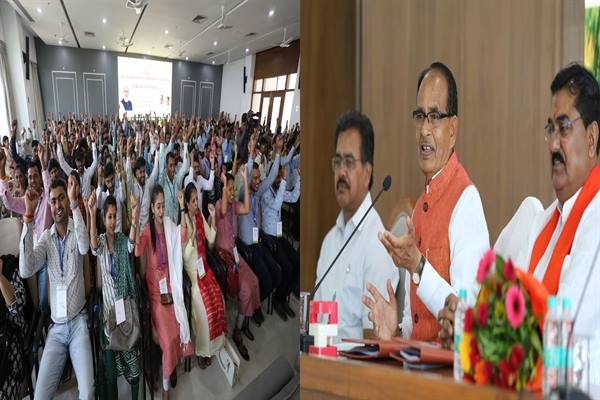
Bhopal :
Chief Minister Shri Shivraj Singh Chouhan has said that the agriculture sector works to strengthen the economy. Madhya Pradesh has made a lot of progress in the field of agriculture. Senior Agriculture Development and Rural Agriculture Extension officers posted in the department have got the responsibility of changing the lives of the farmers. The important responsibility of changing the fate of the farmers of the state and making their future lies on the newly appointed agriculture officers. Madhya Pradesh is far ahead in the agriculture sector. The newly appointed Agriculture Officers should take a pledge that they will become the means of changing the lives of the farmers by rendering services with hard work and authenticity.
Chief Minister Shri Chouhan said that along with the Agriculture Department, a campaign is going on to fill the vacant posts in other departments as well. By August 15, the work of filling about one lakh posts in various departments will be completed. Will make Madhya Pradesh prosperous by giving jobs to the youth. Chief Minister Shri Chouhan today handed over appointment letters to 251 senior agriculture development and rural agriculture extension officers at Chief Minister's residence office Samatva Bhawan. These include 87 women officers.
Agriculture officers should fulfill their responsibilities by working authentically.
Chief Minister Shri Chouhan said that if the newly appointed officers have a dedicated role for the farmers, they will be able to make life meaningful. Congratulating and best wishes to the newly appointed officers, the Chief Minister said that with a positive attitude towards work, we can do the work of changing the lives of the farmers. Through a story, Chief Minister Shri Chouhan mentioned the three perspectives of three laborers doing one work and said that we should consider the responsibility we have got as a good fortune, there is significance in this.
Madhya Pradesh continues to advance in the agriculture sector
Chief Minister Shri Chouhan said that production of food grains has increased by 700 percent in Madhya Pradesh. The contribution of Madhya Pradesh in the country's economy is increasing. The agricultural growth rate of the state has increased. Today Madhya Pradesh is being called the food basket of India. Only Madhya Pradesh produces 10th part of the total food grains production of the country. Madhya Pradesh ranks first in the production of soyabean, pulses, spices and ginger, wheat, second in the production of maize and onion, third in the production of oilseeds and aromatic plants in the country. Along with the use of new techniques of agriculture, organic and natural farming is being promoted in the state.
Chief Minister Shri Chouhan said that there are continuous immense possibilities of work in the agriculture sector. Farming changes the economy. There was a time when wheat used to come to India from other countries. Now the situation is different. Agriculture developed rapidly. When the production increased, the purchases in the market increased, when the wheels of the factories moved, the entire economy was helped. The state had a budget of one lakh crore in the year 2012-13, which has increased from 2 lakh crore in the year 2020-21 to 3 lakh 14 thousand crore in the year 2023. The average annual income per person has also increased in the state. The average annual income per person in the state was once only 11 thousand, which has now increased to 1 lakh 40 thousand. Chief Minister Shri Chouhan gave appointment letters to some officers as a token. He also posed for a group photograph with the newly appointed officers.
Farmers' Welfare and Agriculture Development Minister Kamal Patel said that Madhya Pradesh is leading in the agriculture sector in the country. He also told about the efforts made in the field of agriculture last year. Mr. Patel said that relief amount is also given to the farmers for crop damage. The work of procurement of food grains and payment of amount is done on time. Efforts have been made to provide maximum value to the farmers for their produce. Initially the guests were welcomed with a bouquet. Additional Chief Secretary, Farmers-Welfare and Agriculture Development Shri Ashok Varnwal and Commissioner Farmers-Welfare and Agriculture Development Shri Selvendran were also present. Deputy Director Agriculture Dr. Pooja Singh conducted the operation.
happy with the appointment
Mr. Mukesh Badole of Khargone district, Mr. Mishrilal Vaskel of Dhar district, Ms. Madhu Malviya and Mr. Anil Kumar Ajneria of Sehore district come from ordinary families. All of them told that on getting the opportunity to work for the welfare of the farmers, along with the means of employment, they have got happiness from their heart. We are determined to fulfill our responsibility with full diligence.
Process to fill posts in agriculture department continues
Chief Minister Shri Chouhan today handed over appointment letters to 251 Rural Agriculture Extension Officers and Senior Agriculture Development Officers in the meeting room of Chief Minister's residence. Of these, 241 posts are for Rural Agricultural Extension Officer and 10 posts are for Senior Agricultural Extension Officer. These include 164 men and 87 women. As per rules in the department, appointments are being made to fill the vacant posts at various levels. The process is on to fill a total of 2805 posts. Of these, the maximum number of posts are of 1852 rural extension officers. Apart from this, the posts of Senior Agricultural Development Officer, Laboratory Assistant, Stenographer Class III, Steno Typist, Block Technology Manager, Computer Operator, Accountant and Assistant Technology Manager etc. are included.
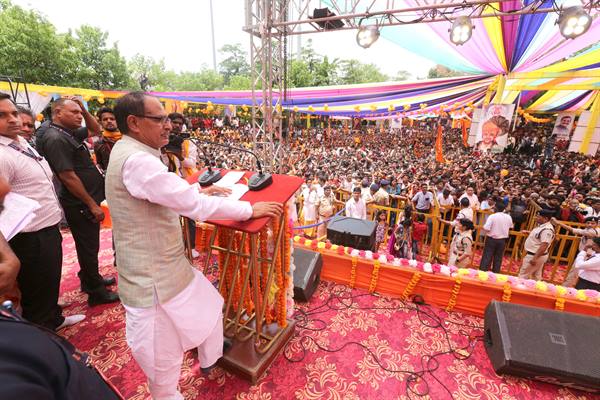 Chief Minister Shri Chouhan will give appointment letters to 253 agriculture officers
Chief Minister Shri Chouhan will give appointment letters to 253 agriculture officers
Agriculture Minister Mr. Patel will be present
Bhopal:MMNN: 24 April 2023
Bhopal :
Chief Minister Shivraj Singh Chouhan will provide appointment letters to agriculture officers on April 25. Farmers-Welfare and Agriculture Development Minister Kamal Patel informed that appointment letters will be given to 243 Rural Agriculture Extension Officers and 10 Senior Agriculture Development Officers on April 25 at 10:20 am at Chief Minister's residence office. He informed that appointments are being made continuously at various levels in the Agriculture Department as per the rules.
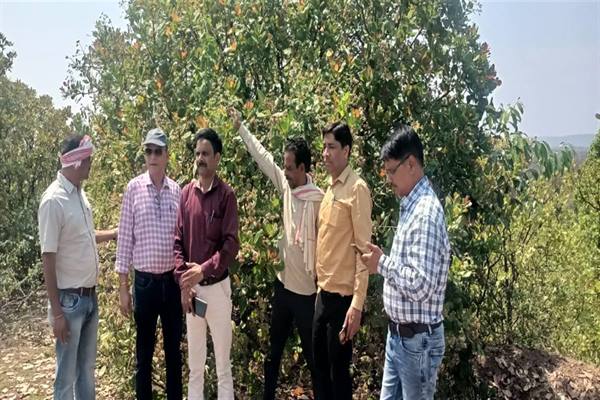 Horticulture commissioner inspected hi-tech bitter gourd farming in tribal area
Horticulture commissioner inspected hi-tech bitter gourd farming in tribal area
Bhopal:MMNN: 24 April 2023
Bhopal :
Horticulture Commissioner, Government of India, Dr. Prabhat Kumar inspected hi-tech bitter gourd cultivation being done by Baigas in tribal areas of Balaghat district. After inspection, Commissioner Dr. Prabhat Kumar praised it.
The commissioner reached village Basinkhar Baiga Tola of tribal-dominated Birsa development block and saw bitter gourd farming. He was influenced by agriculture. He advised the villagers to grow other vegetables. The commissioner said that there is a lot of potential for cashew production in Balaghat district. Tribal farmers should take advantage of this. He advised to plant cashew saplings on the vacant land. He also inspected cashew plantation in village Gowari Bhimlat and village Birsa. During the tour, the Commissioner was accompanied by the Additional Commissioner of the National Cashew Board, Dr. Naveen Kumar Patle was also present. He Dr. Chief Scientist of Krishi Vigyan Kendra Badgaon . RL Discussed with Raut and officials of Agriculture and Horticulture Department regarding the expansion of horticulture farming.
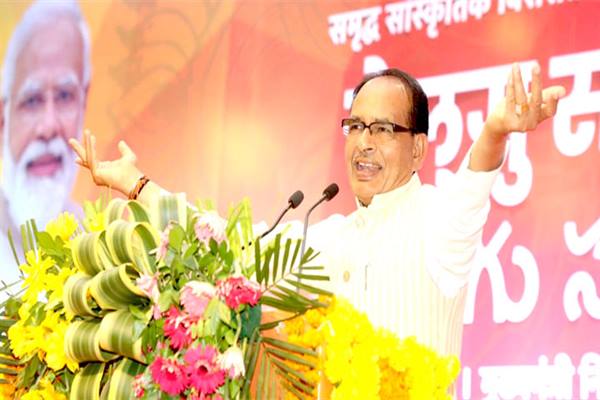 Three years of government, unmatched in agriculture sector
Three years of government, unmatched in agriculture sector
Bhopal:MMNN: 23 April 2023
Bhopal :
India's pride is being sung globally under the leadership of Prime Minister Shri Narendra Modi. In the empowerment of the country, Madhya Pradesh has also started realizing the dream of a strong India with full force. For the last three years, under the leadership of Chief Minister Shri Shivraj Singh Chouhan, continuous efforts were made for the economic empowerment of the farmers of the state. Farmers have got an additional benefit of thousands of crores only by the decision to procure gram, lentils and mustard on support price along with wheat. The state has also set a record of receiving awards by doing excellent work in the field of agriculture. Irrigated by the hard work of the farmers, our state is setting new records everyday. The government is working on the target of providing maximum support price (MRP) of crops to the farmers.
In order to benefit the farmers from April 2020, the present government has taken an unprecedented decision to procure gram, lentil and mustard at support price before wheat, earlier they were procured after wheat. Due to the decision of the government, the farmers directly got an additional benefit of Rs. 1 to 2 thousand per quintal of their produce. Now the farmers are not forced to sell gram, lentil and mustard crops at throwaway prices. Traders had to buy gram, lentils and mustard produce for their industries at more than the support price, farmers directly benefited from this. Gram, lentils, For the last three years, an additional income of more than Rs 10,000 crore is being generated from the sale of mustard and summer moong. This year, summer moong will be purchased at the support price of Rs 7755 per quintal. This will give more additional income to the farmers. Earlier the farmer was forced to sell moong at a low price, not now. Farmer is a strong link of the Indian economy. We are doing everything possible to empower the farmers by giving them more power.
In the interest of the farmers, the state government made efforts up to Delhi and abolished the limit of procurement of 25 quintals of wheat per farmer per day on the support price. Along with this, the daily earning limit of gram, lentils and mustard has been increased from 25 quintals to 40 quintals. The yield of gram was increased from 15 quintals per hectare and mustard from 13 quintals per hectare to 20 quintals per hectare equally. Taking decisions in the interest of the farmers of the state, Union Agriculture Minister Shri Narendra Singh Tomar gave necessary approvals. Due to this, along with economic benefits, the farmers have got freedom from the trouble of taking their produce for sale more than once.
Overall efforts were made in the last three years to make the farmers of the state happy and prosperous. The state government is making continuous efforts to make the farmers prosperous for the prosperity of the state, because when the farmer is prosperous, then only the village will be prosperous and if the village is prosperous, then the state will be prosperous. The prosperity of the country lies in the prosperity of the state. Farmer sons are being encouraged to become industrialists along with farming. For this, efforts are being made to provide them all the necessary resources. The government is also committed to provide facilities for grading, sorting and marketing of the produce to the farmers . Farmers should set up industries related to their agricultural produce and get more prices by preparing other products.
Madhya Pradesh is celebrating the year 2023, the golden jubilee year of the Mandi Board. In the current financial year, the Mandi Board has earned the maximum income of Rs 1681 crore by doing excellent work. 14 mandis of the state are being made hi-tech. Infrastructural development works are being done in all the 259 mandis of the state as per the requirement. Madhya Pradesh is the only state in the country, which has enabled farmers to sell their agricultural produce anywhere from their homes, barns and godowns at their own cost with an Android based application "MP Farm Gate App". 12 thousand 22 farmers have sold 50 lakh quintals of various agricultural produce by using it.The functioning of the Farm Gate App has also received a lot of appreciation from the Central Government.
The government has made all out efforts in these 3 years to benefit the farmers. The government has implemented the e-permission system to make the functioning of mandis more convenient. Now the gate pass can be made by the trader himself for the transportation of agricultural produce. 61 lakh 90 thousand 208 permits have been issued by more than 58 thousand traders in the state. After becoming Agriculture Minister in the present government, orders were issued to conduct all official, correspondence and information related work in Hindi language in the Agriculture Department. "Kamal Suvidha Kendra", a true friend of the farmers, was established (tel number: 0755-2558823) to solve the problems related to the department of the farmer brothers. With special efforts, the regional office of APEDA was opened in Madhya Pradesh,
New dimensions of agricultural modernization have been established in the state. Farmers are continuously being encouraged for natural farming, organic farming, crop diversification. Thousands of Agricultural Producer Groups (FPOs) are being formed. For the expansion and promotion of natural farming, the determined government constituted the "Madhya Pradesh Natural Agriculture Development Board". 72 thousand 967 farmers have been registered on the portal for natural farming of the state .
In the last three years, the government took revolutionary decisions to provide maximum benefits of Pradhan Mantri Fasal Bima Yojana to the farmers of the state. The criteria of 100 hectares of notified crop area was changed to 50 hectares. Forest villages, whose farmers did not get the benefit of the insurance scheme, In order to benefit them, they were included in Patwari circles. During the tenure of the previous government, the scale of finance in Pradhan Mantri Fasal Bima Yojana was increased from 75 percent to 100 percent. In the interest of the farmers, the last date of crop insurance was extended twice. Not only this, for the first time even on government holidays, the bank was opened and insurance was done. The insurance portal of the Government of India was opened with special permission and by getting the entry of the left out farmers, an additional crop insurance claim of Rs 450 crore was given to the farmers. The government deposited the outstanding premium and from the year 2018-19 to the year 2020-21 Kharif, a total of 17 thousand 140Crop insurance claim amount of Rs. crore was provided to the farmers.
Natural Farming Promotion Scheme, One District-One Product Scheme, State Scheme for GI Tag, Crop Diversification Promotion Scheme, Agricultural Infrastructure Fund Operation Scheme, Export Promotion Scheme, State Millet Mission, FPO formation in the last three years in the interest of farmers. Started new schemes like Promotion Scheme, Chief Minister Narwai Management Scheme and Skill Development Training. About 4 thousand posts are being recruited by running a campaign to fill the vacant posts of various cadres in the Agriculture Department. While working in the agricultural produce markets of the state, the important work was done to provide compassionate appointment on various posts to the dependents of 181 officers-employees who died in the cheek of time.
The state government has made a separate provision of agriculture budget for agriculture and allied activities. A budget provision of Rs 53 thousand 964 crore has been made in the agriculture budget for the financial year 2023-24. In this, there is a provision of Rs 16 thousand 996 crore for the Farmers' Welfare and Agriculture Development Department. The budget of the farmer-oriented scheme "Atma" has been doubled to Rs 2,000 crore 94 lakh. The government has made a remarkable provision of Rs 3 thousand 200 crore in the Chief Minister's Farmers Welfare Scheme.
The state received many awards for the farmer friendly work done in the last 3 years and for the remarkable work done in the agriculture sector in the state. The state has been honored with the Excellence Award in the year 2022 by the Government of India for the integration of land records on the Pradhan Mantri Fasal Bima Yojana portal. National Award for "Best Performing State" for maximum utilization of Agriculture Infrastructure Fund (AIF) and "Best Emerging State" award for Millet Mission Scheme. Madhya Pradesh ranks first in the field of wheat exports. The state ranks first in the country in production of pulses, second in production of food grains and third in oilseeds. Our state has the best performance in the whole country in the Good-Governance Index in agriculture and allied sectors.
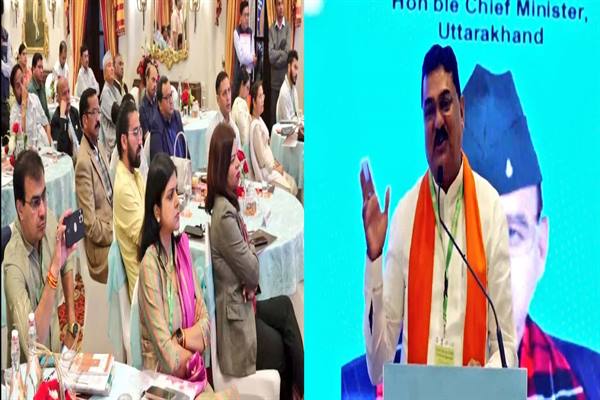 The land of India is the mother of Shri Anna (Millet): Agriculture Minister Shri Patel
The land of India is the mother of Shri Anna (Millet): Agriculture Minister Shri Patel
Bhopal:MMNN: 12 April 2023
Bhopal :
Farmers' Welfare and Agriculture Development Minister Kamal Patel has said that the land of India is the mother of grain (millet). Today it is being produced in 131 countries of the world. Minister Mr. Patel was addressing the national seminar being held in Mussoorie, Uttarakhand on the topic "Millets: Potential and Opportunity". He said that work is being done to convert despair into hope under the capable and successful leadership of Prime Minister Mr. Narendra Modi. With his inspiration, the United Nations has declared the year 2023 as the International Millet Year.The seminar was inaugurated by Uttarakhand Chief Minister Shri Pushkar Singh Dhami.
Agriculture Minister Mr. Patel said that in realizing Prime Minister Mr. Modi's dream of a self-reliant India, the government of Devbhoomi Uttarakhand has also done a national seminar on Mr. Anna while doing important work. Most of the income of the land of sages and sages has been dependent on agriculture. Even today India is an agricultural country. Farmers are the backbone of the economy, this backbone needs to be further strengthened. Prime Minister Shri Modi took care of the farmers and implemented various welfare schemes to make them self-reliant. Minister Mr. Patel welcomed and felicitated all those involved in the seminar on behalf of Madhya Pradesh Chief Minister Mr. Shivraj Singh Chouhan and the farmers of the state.
Agriculture Minister Shri Patel informed that State Millet Mission has been set up in Madhya Pradesh. Through this, 80 percent subsidy will be given to farmers to encourage the production of Shri Anna (coarse grains) like Kodo-Kutki, Samba, Ragi, Jowar-Bajra. Necessary arrangements will also be made for processing, packaging and marketing of the produced crop. He informed that Shree Anna will be served as nutritious food once a week in Anganwadis of Madhya Pradesh. Minister Mr. Patel said that cow rearing is also being encouraged to promote natural farming in Madhya Pradesh. Along with this, the board has also been constituted.
Agriculture Minister Mr. Patel expressed hope that Prime Minister Mr. Modi's initiative will bear fruits in the International Millet Year and India's Mr. Anna will dominate the whole world. He said that positive results will come from the seminar, which will not only benefit the whole country but also the world.
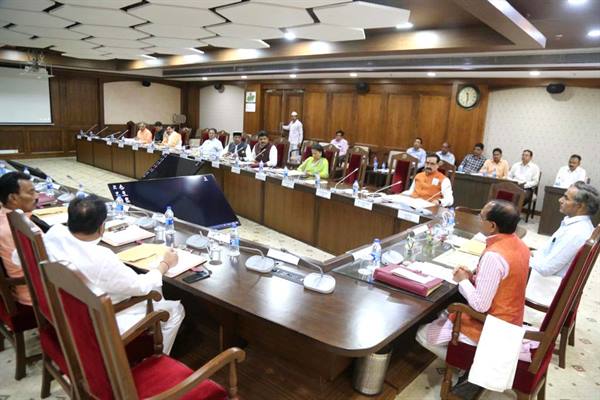 Now farmers will be able to repay Kharif crop loan till April 15
Now farmers will be able to repay Kharif crop loan till April 15
Bhopal:MMNN: 31 March 2023
Bhopal :
The meeting of the Council of Ministers, chaired by the Chief Minister Shri Shivraj Singh Chouhan, began with the singing of Vande Mataram at Mantralaya. Chief Minister Shri Chouhan said that the last date for farmers to repay the loan of Kharif crop is being extended from March 31 to April 15. The decision was taken by the state government to provide loans to the farmers for Kharif crop at zero percent interest rate. The loan repayment period ends today, March 31.
Chief Minister Shri Chouhan said that many farmer brothers and sisters have not been able to deposit this amount. After the expiry of the period they will become defaulter and after being defaulter they will have to pay more interest. In view of this, the last date for repayment of loan for Kharif crop is being extended to April 15, this will facilitate the farmers to repay the loan and they will not become defaulters.
The state government will pay Rs 60 crore for the extended period
Chief Minister Shri Chouhan said that the interest of the extended loan will be paid by the state government, which will amount to about Rs 60 crore. This amount will be filled by the state government on behalf of the farmers. With this, farmers will be able to pay their loan amount in a convenient manner and they will not be able to become defaulters.
 Madhya Pradesh Budget 2023-24: Government made this provision for agriculture, horticulture and animal husbandry
Madhya Pradesh Budget 2023-24: Government made this provision for agriculture, horticulture and animal husbandry
Bhopal:MMNN: 02 March 2023
Budget 2023-24 Madhya Pradesh for agriculture and allied sector
On March 1, 2023, the Madhya Pradesh government has presented the state budget. This budget was presented by the Finance Minister of Madhya Pradesh Mr. Jagdish Deora. The focus has been on women, youth and farmers in the budget. Madhya Pradesh government has kept Rs 3 lakh 14 thousand 25 crore in the budget 2023-2024. Whereas in the last year 2022-23, the budget was Rs 2 lakh 79 thousand 697 crore.
The Madhya Pradesh government has opened its treasury for the farmers in its budget, the government has kept the agriculture budget of Rs 53,964 crore for the year 2023-24. This year, apart from continuing the ongoing schemes, many new schemes have also been announced in this budget. The budget 2023-2024 for the schemes of agriculture, animal husbandry, horticulture and cooperative sector is as follows: -
Provision made for these main schemes of agriculture sector in the budget
- The government has made a provision of Rs 5,510 crore for the Atal Krishi Jyoti Yojana in this year's budget. Under the scheme, subsidy is provided to the farmers by the government on the electricity connection of the agricultural pump, so that the farmers can get cheap electricity.
- A provision of Rs 3200 crore has been made for the Farmers Welfare Scheme. Under the scheme, an amount of Rs 4,000 is given in two installments by the state government to the beneficiary farmers of the state's Pradhan Mantri Kisan Samman Nidhi Yojana.
- The government has made a provision of Rs 2001 crore for the Pradhan Mantri Fasal Bima Yojana for this year. Under the scheme, farmers are compensated for the loss of crops due to natural calamities.
- The government has made a provision of Rs 1000 crore for the Chief Minister's Farmers Crop Procurement Assistance Scheme
- A provision of Rs 350 crore has been made for interest waiver scheme for defaulter farmers eligible for loan waiver scheme.
- A provision of Rs 270 crore has been made in the budget for the National Agriculture Development Scheme.
- A provision of Rs 152 crore has been made for the Sub Mission on Agriculture Extension (ATMA).
- A provision of Rs 129 crore has been made for SMAM, a scheme being run to provide subsidy on tractors and other agricultural machinery to the farmers.
- Madhya Pradesh State Millet Mission will be started to increase the productivity and increase the value addition of crops like Coarse Cereals Kodo, Kutki, Ragi, Sawa, Jowar, Bajra etc.
- A provision of Rs 600 crore has been made for interest subsidy on short-term loans to farmers through cooperative banks.
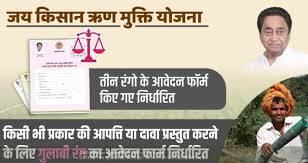 Jai-Kisan Crop Loan Waiver Scheme
Jai-Kisan Crop Loan Waiver Scheme
Bhopal:MMNN: 19 January 2019
Farmers of the state are enthusiastic to derive benefit from the Jai Kisan Crop Loan Waiver Scheme. More than 12 lakh 85 thousand farmers have submitted their loan waiver applications in gram panchayats on January 15 and 19 in the first five days of the scheme. Nearly 5 lakh 38 thousand 283 applications have been submitted today itself. The application forms submitted by the farmers include 60 percent green, 38 percent white and 2 percent pink. So far 7 lakh 48 thousand 868 green, 4 lakh 89 thousand 509 white and 46 thousand 624 pink applications have been submitted.
It may be mentioned that applications for loan waiver will be received from the farmers till February 5, 2019 under the prescribed implementation procedure. According to the estimation of the Farmers Welfare and Agriculture Development Department, total 54 lakh loan waiver forms are expected to be submitted till February 5.
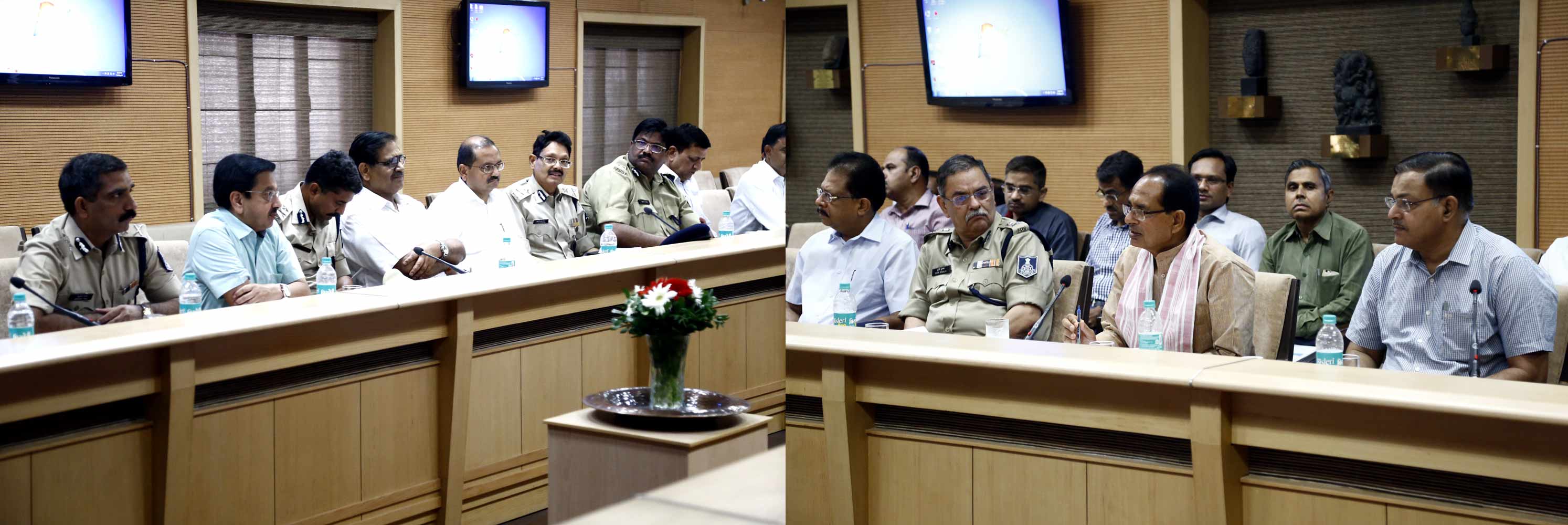 Purchase of gram, red lentils and mustard to continue till June 9: CM Shri Chouhan
Purchase of gram, red lentils and mustard to continue till June 9: CM Shri Chouhan
Bhopal:MMNN: 24 May 2018
Chief Minister Shri Shivraj Singh Chouhan has said that the purchase of gram, red lentils and mustard on Minimum Support Price. It will continue if need arises. He issued instructions that all essential arrangements have been made for farmers in the Mandi. He instructed to extend the last date of wheat procurement also as per need. Shri Chouhan was reviewing procurement on Minimum Support Price at the Mantralaya today.
CM Shri Chouhan said that arrangements should be made with the participation of farmers in the Mandi. Behave cordially towards farmers. Arrangements in Mandi should be pro-farmers. There should be better arrangements of tea and snacks, buttermilk and shade. Waiting time should be reduced. Number of weighing scales be increased and premises should be extended. He assured farmers about 100 percent crop purchase. Shri Chouhan instructed to make the system of issuing SMS and token more effective.
Shri Chouhan told the officials to keep constant vigilance over the purchase work. Primary information of the problem should be obtained at local level promptly and should be monitored. Problems should be resolved promptly. He reviewed arrangements of jute bags, transport, storage and payment. Shri Chouhan obtained information of the progress in the work of depositing the amount given for garlic to farmers accounts.
Chief Secretary Shri B.P. Singh, Director General of Police Shri R.K. Shukla, Principal Secretaries, divisional commissioners of concerned departments and Inspector General of Police were present on the occasion.
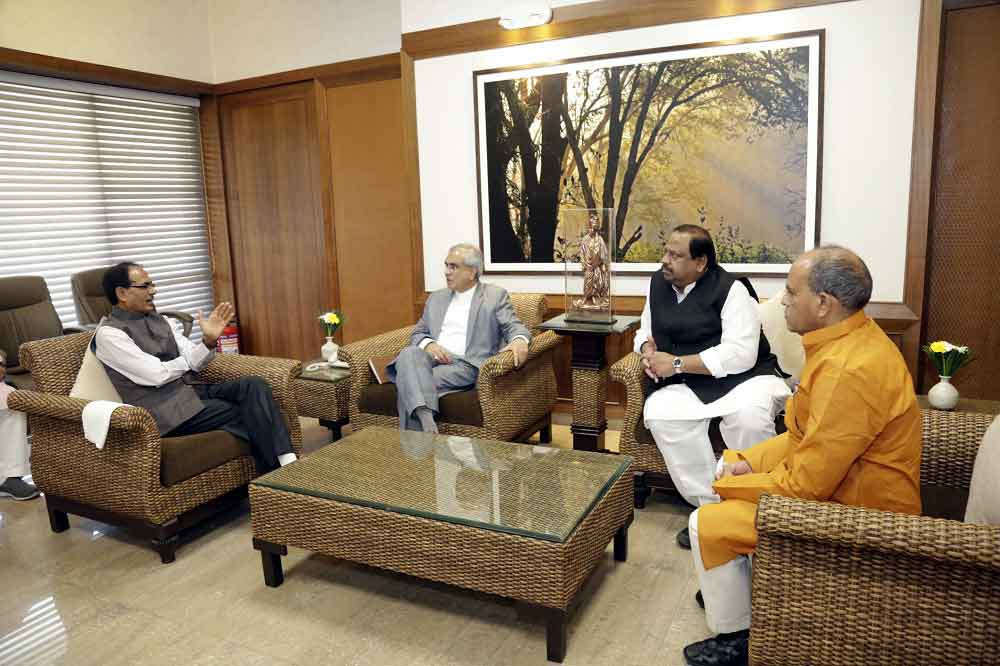 Need to implement Krishak Udyami Yojana in other states also
Need to implement Krishak Udyami Yojana in other states also
Bhopal:MMNN: 22 March 2018
Vice Chairperson of NITI Ayog Dr. Rajiv Kumar today paid a courtesy visit to Chief Minister Shri Shivraj Singh Chouhan at the Mantralaya. Among others present during the visit were Vice Chairperson of State Planning Commission Shri Chetan Kashyap, Farmer Welfare and Agriculture Development Minister Shri Gaurishankar Bisen, Energy Minister Shri Paras Jain and Chief Secretary Shri B.P. Singh.
CM Shri Chouhan gave information about the efforts being made to improve income of farmers and to promote agriculture based industries in state. Telling him about the Krishak Udyami loan scheme to promote farmers to set up industries and to encourage agriculture based industries, the CM said that 15 percent subsidy, five percent interest grant till 7 years and bank guarantee is given by the government under the scheme. The scheme provides loan of Rs 10 lakh to Rs 2 crore. Efforts will be made to get at least 3 thousand industrial units set up this year under the scheme.
Shri Chouhan told that irrigation sources are being expanded speedily to increase agriculture productivity of farmers. In the last one and a half decade, irrigated area has increased from 7.5 lakh to 40 lakh hectares. This will be further taken to 80 lakh hectare only then will near about 80 percent area of the state be irrigated. He said that the state has initiated the Bhavantar Bhugtan Yojana to ensure fair price of the crops to the farmers besides increasing their productivity. This Yojana is useful for both the government and the farmer. This ensures fair price of crops to the farmer and saves the expense on procurement process. Under this scheme, Bhavantar amount of 25 lakh metric tonne crop has been paid so far.
Vice Chairperson of NITI Ayog Dr. Kumar praised the Krishak Udyami Yojana of Madhya Pradesh government. He expressed the need to implement the scheme in other states also. Dr. Kumar said that the Ayog will conduct an intensive study of the scheme. He told that it is essential to make schemes based on needs, problems and resources of particular state to bring the concept of cooperative federalism into existence. He said he is touring all states in the country to study the uniqueness of each state. He held a discussion on the schemes and concepts proposed by the Ayog
 Efforts on to improve Bhavantar; Crop Survey through satellite
Efforts on to improve Bhavantar; Crop Survey through satellite
Bhopal:MMNN: 27 February 2018
Chief Minister Shri Shivraj Singh Chouhan has said that Bhavantar Bhugtan Yojana will be made better. Manual Survey System of crop registration under Bhavantar will be changed. Efforts are being made to conduct survey work through satellite to avoid human errors. He said that farmers are being encouraged to store crops so that they are able to sell their crops at a fair price in the market. On storage of crops, the farmers will get immediate payment of 25 percent of crop value by the bank. The interest however will be paid by the government. The scheme has become popular among farmers. Farmers are demanding inclusion of other crops also. The CM was replying to queries during Shikhar Sammelan held by a news channel.
CM Shri Chouhan told that public supports people who work. The government has attempted to realize inclusive development in state. Several social security schemes including Re one per kg wheat, fee payment of higher education of outstanding students, free medical treatment, land to landless etc. have been implemented after dialogue with the public. Government efforts have led to bumper production in agriculture sector. The new challenge is to fetch fair price to farmers for hard work. Efforts are being made in the direction of agricultural product value promotion. An additional Rs 265 besides Rs 1735 support price per quintal wheat will be given to farmers due to drought situation.
He said that apart from stern action on corruption, arrangement of laws for delivery of public service, confiscation of property, e-tendering, e-measurement an e-payment has been made to improve the system. There will be only one cadre of teachers. About 2 lakh teachers have been appointed in the last few years. Very soon recruitments will be made for 40 thousand teachers posts. At least 50 small and big irrigation projects are in progress in Bundelkhand. Efforts were made to fill Chandel era ponds. Dam is being planned on Kane-Betwa. Government has increased irrigated area from 7.5 lakh to 40 lakh hectare which has been done before time. Plan is to further increase it to 80 lakh hectare.
He told that a bill will be brought soon to regulate fees in private schools. Youth Empowerment Mission has been made to provide new opportunities to youths. Efforts will be made to upgrade skills of 7.5 lakh youths and provide self-employment to 7.5 lakh youths. All houses in rural areas will have own toilets by October 2, 2019. Medical college has been opened in Sagar for better health services. This year seven new medical colleges will be opened. Treatment scheme up to Rs 5 lakhs will be effectively implemented in state.
During a discussion, the Chief Minister informed that the bill related to death penalty to rapists of minors has been sent for approval to the President. On law and order system he said that no big listed dacoit gang exists in state, SIMI network has been busted. Naxalism has ended in borders of Balaghat. He told that Rs 2 lakh crore investment has been made during two global investor summit 2014-2016 in state. He gave details of states progress while telling about the situation of the state about a decade and a half ago. He said the state has surplus power. Rs 85 thousand crore will be spent on urban development. The state tops in Pradhan Mantri Gramin Sadak and Awas Yojana. Drinking water supply and power supply has been improved.
 Farmers getting benefits of organic farming
Farmers getting benefits of organic farming
Bhopal:MMNN: 23 February 2018
Organic farming is being promoted by the Farmer Welfare and Agriculture Development Department in Madhya Pradesh. Agriculture cost of farmers who have adopted organic farming has reduced and they are also availing other benefits including fuel.
Panna Farmer Ramkishore Nagaich of Pawai village in Panna district has established a gobar gas plant with the help of the Farmer Welfare Department from which he has received several benefits.
Ramkishore Earlier would always use chemical fertiliser in his field. Because of this the fertility of his agricultural land was reducing thus affecting agricultural production. He also discussed about it to the field officials of Agriculture Department. They advised him to use gobar gas plant in his house. He had 6 milching cattle and he started using their cow dung in the plant. He also started using the cow dung to make organic fertiliser. Today his agricultural cost has come down to a great extent. There is improvement in soil health also. Now Ramkishore is no longer dependent on the market for fertiliser and fuel.
Mandsaur Farmer Kamlesh who hails from village Berkhedadev of Mandsaur district has been farming with chemical fertiliser since all these years. With the fertility of the soil waning, agricultural production was also coming down. He spoke about this with the field officials of the Farmer Welfare and Agriculture Development Department. Kamlesh was then given information about the process of making organic fertiliser. He was also told about organic tonic, organic kaadha to keep away pests.
He was also told about use of gaumutra for Jeevamrit, Beejamrit, Jaivik Kaadha made out of vanaspatik leaves, jaivik tonic made from cow dung cakes and vermiwash. Says Kamlesh that by adopting organic farming, soyabean production has increased from 20 quintal to 25-30 quintal per hectare. Besides, wheat production which was 55 quintal per hectare, has now increased to 70 quintal per hectare. Organic farming is now fetching Kamlesh an additional income of nearly Rs 40 thousand in a year.
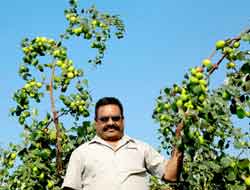 Apple Ber is being sold with Patel Agriculture Farms Trade mark
Apple Ber is being sold with Patel Agriculture Farms Trade mark
Bhopal:MMNN: 20 February 2018
Farmers are being encouraged in Madhya Pradesh to grow horticulture crops along with the traditional crops. Shri Hukum Singh, the farmer of village Bhagwatpura of Makdon Tappe of Ujjain district has earned handsome profit by growing horticulture crop on his farm.
Hukum Singh holds 200 bigha land. He used to grow traditional crops like soybean, wheat and gram on his agriculture land. Hukum Singh had grown variety of apple ber on his two and half bigha land besides traditional crops last year. This variety of ber of Thailand has a shape and taste like apple. He decided to sell ber of unique taste in packaging under the brand name this time. His brand received a good response in Indore and Bhopal as well. His brand Patel Krishi Farm has also established its image in the surrounding mandis of Ujjain due to the good taste. Situation has become such that whenever ber load reaches mandis, its get sold immediately.
Hukum Singh says that this variety of ber is being purchased in the market at the rate of Rs. 35 to 40 per k.g. He has used bare minimum chemical fertliser in the ber crop. Conducting new experiments, he has also grown kaghzi lemon on 7 bigha and custard apple on 5 bigha land. He says that the officers of the Horticulture department have given him the technical guidance to grow fruits, which has become fruitful to increase the income.
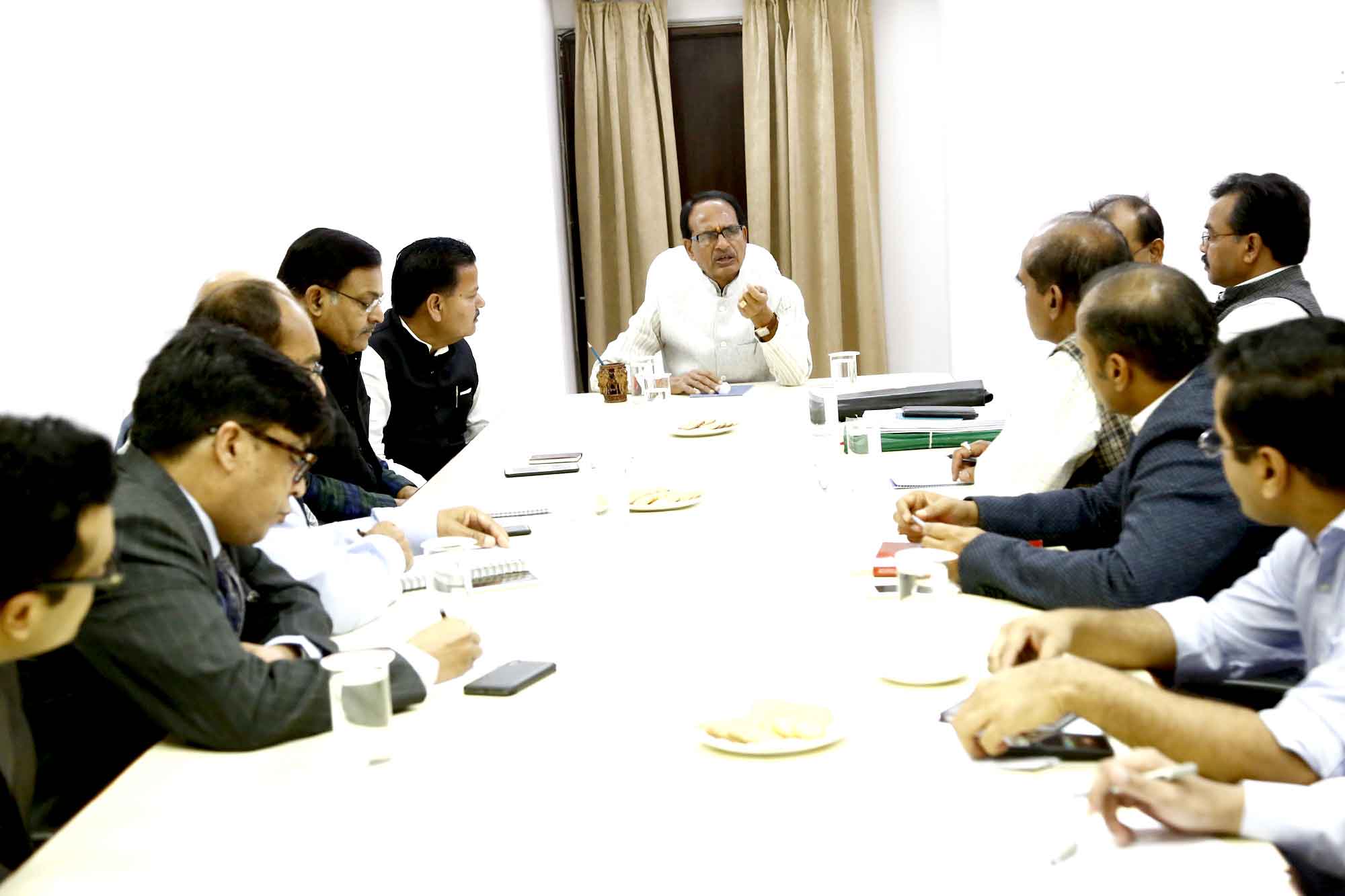 Farmers Need not Feel Sad, Full Compensation to be Provided against Crop Loss: CM Shri Chouhan
Farmers Need not Feel Sad, Full Compensation to be Provided against Crop Loss: CM Shri Chouhan
Bhopal:MMNN: 14 February 2018
Chief Minister Shri Shivraj Singh Chouhan has appealed to the hailstorm affected farmers that they should not worry at all in this hour of crisis. Full compensation will be provided against the crop loss. In his appeal to the farmers, he said that crop loss effects life and it also affects childrens future, but there is no need for the farmers to be worried and feel sad. Relief amount including crop insurance amount will fully compensate the crop loss. The government is with farmers every moment in this hour of crisis. Farmers will not face any kind of problem and there is no need for them to be worried.
Moreover, Shri Chouhan mentioned that damage caused to the crop by hailstorm will be fully assessed with transparency. Survey teams will be formed to ascertain the loss and activity to paste assessment of loss in panchayats will be started soon. In case of objection raised on the assessment by any person then it will be rectified immediately. The entire government is with farmers. We will not let farmers bear the loss. Earlier to this, CM Shri Chouhan gathered information about the crop loss in the hailstorm affected areas by convening a high level meeting at CM House.
According to the initial information, the hailstorm has caused damage to the crop of 621 villages of 13 districts. The maximum damage to the crop has been caused in Bhopal, Vidisha, Sehore district of Bhopal division. Moreover, there is an information of substantial damage to the crop in Seoni, Chhindwara, Balaghat, Dewas and Hoshangabad. About 27 thousand hectare area has been affected by the hailstorm. The Chief Minister Shri Chouhan has given instructions to begin the survey work immediately to assess the loss by forming teams of patwaris, gram sevaks, agriculture field staff and public representatives.
Chief Secretary Shri B.P. Singh, Additional Chief Secretary Finance Shri A. P. Shrivastava, Agriculture Production Commissioner Shri P.C. Meena, Principal Secretary Agriculture Shri Rajesh Rajoura, Principal Secretary Revenue Shri Arun Pandey, Principal Secretaries to CM Shri Ashok Varnval and Shri S.K. Mishra besides other Senior Officers were present in the meeting.
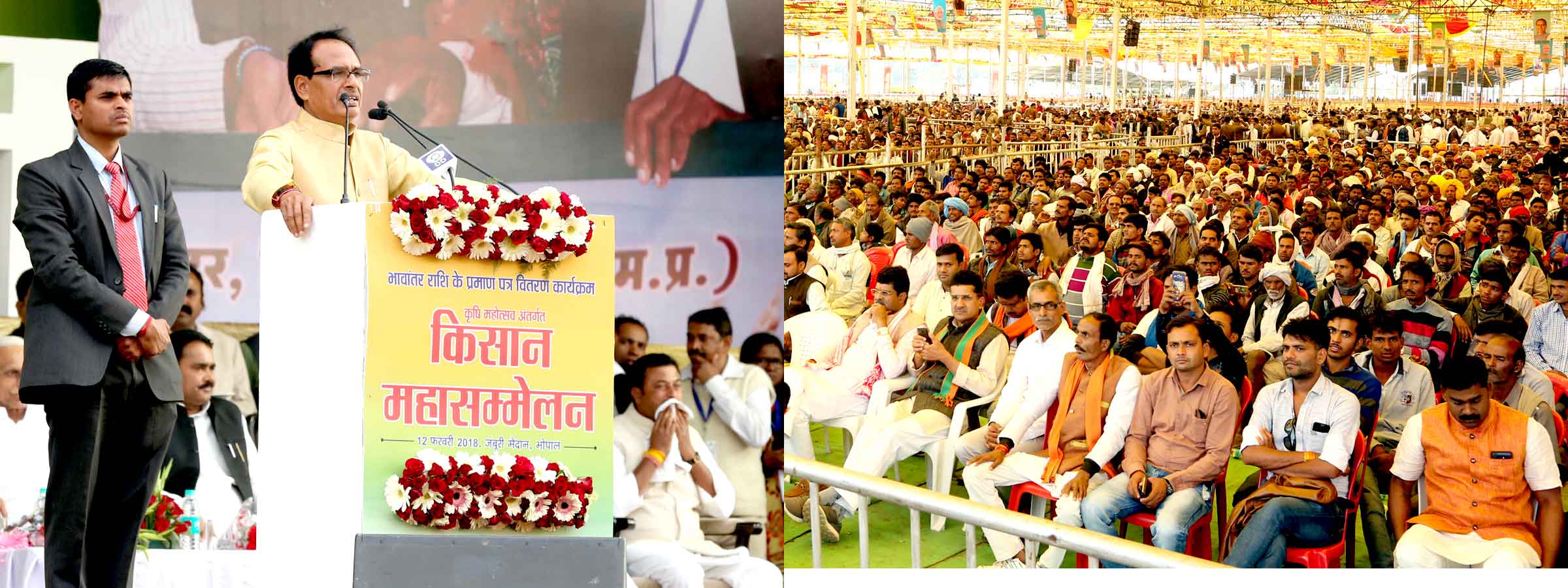 Government listens to farmers and works also for farmers
Government listens to farmers and works also for farmers
Bhopal:MMNN: 13 February 2018
Government listens to the farmers and works for their welfare also. This was said by farmers who had come to take part in the Kisan Maha Sammelan at Jamboori Maidan here today. Farmer Tilakram of Shikarpur in Sehore district is happy with the announcements made by Chief Minister Shri Shivraj Singh Chouhan. He is of the opinion that they will be benefitted with the incentive of Rs 200 on the support price of wheat.
Shri Ramprasad and Shri Bhanwarlal of Khilchipur tehsil in Rajgarh district view the announcements of CM Shri Chouhan at the Kisan Maha Sammelan as a government that works in the interest of farmers. They said that the cost in farming has increased but the government has given them a huge relief by giving them the incentive on support price on wheat.
Farmer Shri Bhanwarlal of Gadiakhedi villahe of Kalapipal tehsil in Shajapur district is also happy with the CMs announcements at the Kisan Maha Sammelan. He said that Rs 200 incentive to farmers on the support price of wheat per quintal this year is a major announcement. Shri Bhanwarlal says that he grows wheat crop on most part of his land.
Umrao Singh, resident of Rasulia village of Kakadia panchayat , District Bhopal, Shri Kale Khan of Bhanpura village of Bhopal district said that the government not only listens to the farmers but also works for their welfare.
Dayal Singh Gurjar of Mengra Navin village said that CM Shri Chouhan made these announcements as he understand the pain and suffering of farmers. He said that the Bhavantar Bhugtan Yojana will be successful in the true sense only when the farmer gets his payment on time. He lauded the payment of interest on storage in a gap of one month. Shri Narayan Singh Gaur of Vagsi village said that God does not just give, he showers you with blessings. This was proved correct at the Kisan Maha Sammelan organized at Jamboori Maidan today by announcements of pro-farmer schemes like CMs Productivity Scheme, Mukhyamantri Rin Samadhan Yojana, One thousand Custom Hiring Centres, Krishak Yuva Udyami Yojana etc. He said that the Chief Minister will get the blessings of thousands of families.
Scheduled Caste farmer Shriram said that the CM has given them much, let him be happy always. Shri Vishwanath of Sumer village told that we are happy if the farmers get their crop insurance money, foodgrain material on time and fair price for their produce. Works like providing Khasra copies to farmers, demarcation, grading system in krishi upaj mandia, making farming a beneficial profession, Rs 25 thousand value for cultivation on one acre and increasing rakba on irrigation will have far-reaching results. This Sammelan will prove to be historic for the welfare of farmers.
Chief Minister Shri Chouhan made several announcements in the interests of farmers at the Kisan Mahasammelan at Jamboori Maidan in Bhopal. Giving their reactions on the Mahasammelan, the farmers said that farmers will now get fair price for their produce now that they are being provided four months storage facility for their produce and the storage expense will be borne by the state government.
Mangilal Kharpa and Mahendra Singh of Rajedi village of Rajgarh district welcomed the CMs announcement to boost gau-palan along with farming. He said that now 15 thousand beneficiaries will be benefitted from Acharya Vidyasagar Gau-Samvardhan Yojana in the whole year. He also said that cowsheds should be operated up to gram panchayat level through public participation for good results. Gajesingh of Berkheda Patahani of Bhopal district expressed joy at the decision of changing kisan credit cards to RuPay cards. With this decision farmers will get cash faster and they will be in a position to use it for farming purposes. Prahlad Singh of Chirouli village in Sanchi block of Raisen district said he is happy for inclusion of onion under Bhavantar Bhugtan Yojana. He said that farmers are not getting fair price for their onion crop since the last few years. This decision will provide relief to onion producing farmers.
Farmer Ramgovind of Maina village of Gunnaur tehsil in Panna district said he is happy that the responsibility of custom processing and servicing center has now been handed over to farmers. Farmers of Goyla and Vedannagar village of Shajapur considered the facilities given to sharecropper farmers by the state government are significant.
Giving a similar reaction to the announcement of keeping crop in godown/warehouse on government expense to ensure fair price to farmers for their produce under Bhavantar scheme, Bhai Bheema Sahu and Gulchand from Dhavla village of Prabhatpattan block of Multai tehsil in Betul district said Saab Jase to kisan ji jayenga, bahut badhiya baat kahi hai mukhyamantri ne.
Mangilal and Meherban Singh of Maujipur village of Shajapur district were so happy that they said Rajaji ki jai ho, small farmers were in great difficulty, now they will get help
 Irrigation facility to farmers topmost priority: PR Minister Dr. Mishra
Irrigation facility to farmers topmost priority: PR Minister Dr. Mishra
Bhopal:MMNN: 9 February 2018
Public Relations, Water Resources and Parliamentary Affairs Minister Dr. Narottam Mishra said that making irrigation facility available to farmers is topmost priority. He said that the government is not doing any favour on the farmers instead it is fulfilling its responsibility. Dr. Mishra was addressing farmers of Bhagour village in Datia district.
PR Minister Dr. Mishra said that there are 926 farmers in Bhagour who will receive Rs 59 lakh 98 thousand 246 as drought relief amount. He told that relief amount is being given to only 517 farmers who have submitted their documents. He urged the remaining farmers to submit their papers to the patwari or tehsildar so that they too can get their relief amount soon. He said that a major area of Bhagour has already received irrigation facility. The remaining rakba will also be provided irrigation facility through Khairi canal as soon it begins. He said that there was maximum water scarcity in 35 villages. This problem has been solved through surface tap water scheme. Giving information about the Pradhan Mantri Sahaj BIjli Har Ghar Yojana, the PR Minister told that free power connections will be provided to all.
PR Minister told farmers that they should get registered under Bhavantar Bhugtan Yojana without fail so that they get fair price for gram, masoor, mustard, onion etc. He urged them to get registered under insurance scheme also. Several peoples representatives and villagers were also present during the programme.
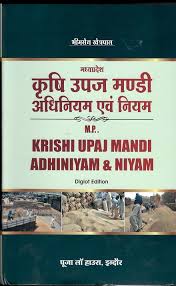 Farmers Getting Meals on Concessional Rate in 257 Krishi Upaj Mandis.
Farmers Getting Meals on Concessional Rate in 257 Krishi Upaj Mandis.
Bhopal:MMNN: 8 February 2018
Several kind of facilities are being provided by the Madhya Pradesh State Agriculture Marketing Board to the farmers arriving in the krsihi upaj mandis to sell their crops . The Farmers Welfare and Agriculture Development Department has implemented a scheme to provide meals to the farmers on concessional rates, to enable them to get good food with convenience in the premises of mandis itself.
Meal at the rate of Rs. 5 is being provided to the farmers in 257 krishi upaj mandis of the state. The Mandi Board has provided an amount of over Rs. One crore in the form of grant to the krishi upaj mandis for this activity. Meals arrangement on the concessional rate have been made by A and B category mandi committees by their own resources, whereas the grant is being given by the state government for meals arrangement in C and D categories mandis.
Agriculture Marketing Award Scheme
Agriculture Marketing Award scheme is being implemented by the Agriculture Marketing Board to ensure that farmers must come to sell their agriculture produces in the mandis only. Under the scheme, draws are held twice a year on the occasion of Narmada Jayanti and Balram Jayanti in krishi upaj mandis.
Thirty five h.p. tractor is given to the farmer for bumper draw in A category mandis, whereas agriculture equipments up to Rs. 50 thousand cost is given in B, C and D category mandis as per the draw. Beside this, cash rewards are also being given to the farmers in mandis. Awards worth Rs. One crore 50 lakh were given to 880 farmers during the last 2 years to encourage them.
The Madhya Pradesh State Agriculture Marketing Board is a three tier level organization in the state with its head office at Bhopal. The Board has 7 regional offices situated in Bhopal, Indore, Ujjain, Gwalior, Sagar, Jabalpur and Rewa. Two hundred 57 mandis and 287 up-mandis are functional in the state. There are 1321 haat-bazaars in the state.
 Rs 1450 crore Bhavantar amount to be paid to 10.58 lakh farmers.
Rs 1450 crore Bhavantar amount to be paid to 10.58 lakh farmers.
Bhopal:MMNN: 7 February 2018
Payment under Bhavantar Bhugtan Yojana is being made to farmers for their produce in Kharif-2017 in Madhya Pradesh. Payment of Rs 1449 crore 91 lakhs will be made to 10 lakh 58 thousand farmers under Bhavantar Bhugtan Yojana in state.
Farmers will be given benefit under the Bhavantar Bhugtan Yojana for maize in January and tuar in February, March and April. In October-2017, one lakh 36 thousand farmers selling crops in the mandis will be paid Rs 146 crore 73 lakh under the scheme. In the month of November, 5 lakh 26 thousand farmers will receive a payment of Rs 773 crore 32 lakh. Nearly 3 lakh 97 thousand farmers will receive payment of Rs 620 crore 75 lakhs for their agricultural produce in their bank accounts on February 12, 2018
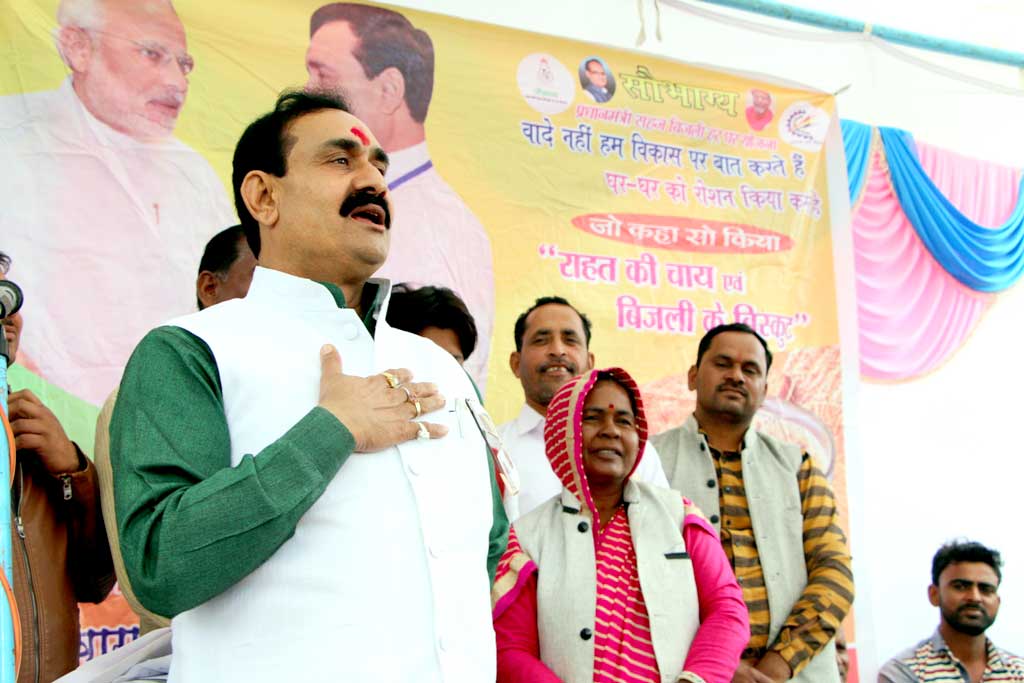 PR Minister explains Bhavantar Bhugtan Yojana to farmers in villages of Datia like a teacher.
PR Minister explains Bhavantar Bhugtan Yojana to farmers in villages of Datia like a teacher.
Bhopal:MMNN: 7 February 2018
Public Relations, Water Resources and Parliamentary Affairs Minister Dr Narottam Mishra is explaining Bhavantar Bhugtan Yojana to farmers, just like a teacher. Dr Mishra today, reaching to different villages of Datia district, told the farmers about different schemes including Bhavantar Bhugtan Yojana, while interacting with common men specially farmers. The Public Relations Minister, before this, had informed farmers about beneficial provisions of Bhavantar Bhugtan Yojana in many villages.
The Public Relations Minister reached village Bargany, Jigna and Sonagiri in Datia district and gave information about number of benefitted farmers and amount given under Bhavantar Bhugtan Yojana. He informed that new registration for Rabi season will start from February 12.For drought relief amount, Aadhar number and mobile number etc. should be given to Patwari or Tehsildar by farmers. He informed benefitted persons in Sinaval, Sevani, Morera villages. The Public Relations Minister appealed to farmers to get benefit from this important scheme. He told the farmers that Rs 4400 for gram and Rs 800 per quintal for onion will be paid to farmers under the scheme.
Public Relations Minister Dr Mishra also informed about Saubhagya Yojana. He told the villagers that free electricity connection is being provided to every person under the scheme. The state government is committed to provide benefit under the scheme to every door easily. Public Relations minister was welcomed in all villages. Public Relations minister visited village Dang Karera also.
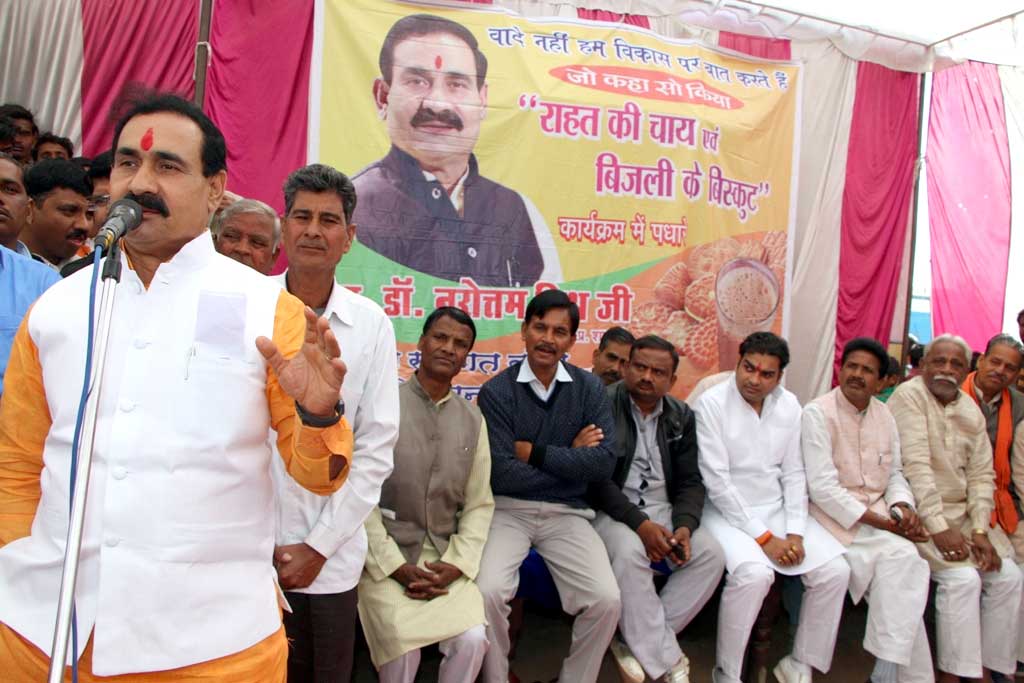 System to give one and half time of cost to farmers under consideration: Minister Dr. Mishra.
System to give one and half time of cost to farmers under consideration: Minister Dr. Mishra.
Bhopal:MMNN: 6 February 2018
Public Relations, Water Resources and Parliamentary Affairs Minister Dr Narottam Mishra gave information about the free electricity connections to farmers under Saubhagya Yojana while visiting various villages of Datia. Dr. Mishra first reached Bahadurpur village. He said that the Central Government is planning to implement a system soon, so that farmers can get one and a half time of cost of their crops. If famers get lesser value for their crops, amount will be given on the line of Bhavantar Bhugtan Yojana. Public Relations Minister informed that Rs 42 lakh 10 thousand 52 and Rs 15 lakh 72 thousand will be given to 536 farmers in Bahadurpur and 292 farmers in Maharajpur respectively.
Public Relations Minister reached Niraval and Makauni
Public Relations Minister informed villagers about the government schemes in village Niraval. He informed that 479 farmers will get Rs Rs.19 lakh 20 thousand in Niraval; 318 farmers will get Rs 19 lakh 56 thousand in Bidniya, 344 farmers will receive Rs 15 lakh 30 thousand in Bhavanipur and 424 farmers will receive Rs 20 lakh 24 thousand and 145 farmers of Khairi will get Rs 14 lakh 34 thousand amount.
Dr. Mishra reaches Chirula by motorcycle
Dr. Narottam Mishra reached village Chirula by motorcycle to meet farmers. He addressed the farmers and said that 989 farmers will get Rs 42 lakh 68 thousand in Chirula as a relief. Rs 28 lakh 58 thousand will be given to 528 farmers in Kararikhurd and Rs six lakh 45 thousand relief will be given to 75 farmers in Vilhar village.
MBA degree holder Subir adopts advanced farming
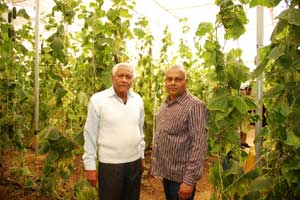
Bhopal, 2 February 2018
MBA degree holder Subir Chaturvedi of Devri village of Gram Panchayat Kachgawan in Katni district is engaged in farming of horticulture crops in poly house through advanced horticulture techniques. He has worked as an advertising marketing manager in a national newspaper from year 1998 to 2006. He also worked as a senior branch manager in a private insurance company from year 2006 to 2012.
Subir came to Katni and settled down for the sake of his family and adopted horticulture which was quite different from his profession. Under the guidance of Horticulture Department, Subir first produced capsicum in a poly house. Now he is producing cucumber in his poly house. Subir got a grant for poly house construction under Protected Farming Scheme of the Horticulture Department. With this grant he got the poly house constructed at a cost of Rs 17 lakh 80 thousand on half an acre area. In this Rs 8 lakh 90 thousand grant amount was given to Subir by the Hortriculture department.
Subir did come across certain technical problems at first during capsicum production in the beginning but it got solved. Through this he earned an income of Rs 4 lakh through capsicum production within 7 months. Later Subir cultivated Italian cucumber in his poly house through he generated an income of Rs 2 to 3 lakhs in just 2 to 3 months. Subir is still cultivating cucumber in his poly house. Subir Chaturvedi is now included in the progressive farmers’ list and is preparing to produce other advanced horticulture crops.
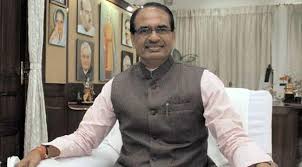 Union Budget is Pro Poor and Farmers: CM Shri Chouhan.
Union Budget is Pro Poor and Farmers: CM Shri Chouhan.
Bhopal:MMNN: 1 February 2018
Chief Minister Shri Shivraj Singh Chouhan said that the Union Budget tabled in the Parliament is a pro poor and farmers’ budget. This budget will provide relief to the common men of the country. CM Shri Chouhan was giving his reaction on the budget at Mantralaya here today.
CM Shri Chouhan mentioned that this budget will realize the dream of the Prime Minister Shri Narendra Modi for building New India. This revolutionary budget will help in eradicating poverty and for creating employment opportunities. Remarkable steps have been taken in the budget for the farmers and poor. It has solutions to double the farmers’ income and will strengthen rural economy. Shri Chouhan stated that the strict steps taken by the Prime Minister in the economy sector has started yielding good results. This budget will facilitate more speed to the fast growing Indian economy.
Shri Chouhan mentioned that the budget is focused on poor welfare agenda in the budget. The budget mentions, construction of one crore houses in one year for the poor in the rural areas. A revolutionary decision has been taken for the health sector. Under this, medical treatment expenses of up to Rs. 5 lakh for 10 crore poor families will be borne by the government. Announcement has been made for one medical college in each 3 parliamentary constituency. Also, a revolutionary initiative has been taken in the education sector. Eight crore poor women will get rid of smoke through Ujjawala Yojana. Provisions have been made for agriculture sector in the budget to fix support prices of kharif and rabi crops by adding 50 percent profit in the input cost and arrangement of 10 lakh crore loan. Rural areas will experience major transformation owing to the provision of Rs. 14 lakh crore made for rural infrastructure in the budget. Employment opportunities will increase due to the investment in the infrastructure development in rural areas. Stressing on micro irrigation, provision has been made to form micro irrigation fund. Baans Mission will also facilitate more employment opportunities. Free electricity will be supplied to the houses of 4 crore poor under the Soubhagya Yojana. An increase of 20 percent has been made in the budget for scheduled caste and tribe. This is important for the upliftment of weaker section. A sum of Rs. 148 lakh crore will be spent for the expansion of railways. Two lakh 50 thousand villages will be linked with broad band. Ten main places will be developed in the form of tourist places. Provision of Rs. 3 thousand 794 crore has been made for MSME’s loan, which will help increase in employment opportunities. The revolutionary initiative to eradicate poverty and to increase employment opportunities has been taken in the budget.
58 mandis of state connect with National Agriculture Market Scheme
Bhopal, 24 January 2018:
To ensure that farmers of the state get the right price for their produce, 58 krishi upaj mandis have been connected with “e-NAM” trading portal. Farmers can sell their agricultural produce through this system. While on the one hand the information concerned with the trader who makes the bid is kept secret, the farmer also gets the benefit of the competition among the traders on the other hand. Another benefit is that traders of other Mandi areas and out of the Mandi area can directly make the bid of gins on the e-NAM portal. This enables farmers to get benefits of local market besides outside markets.
National Agriculture Market (e-NAM) is a PAN India electronic trading portal which is a good medium of current Krishi Upaj Mandi Samiti for construction of an integrated national market for agriculture related produce. e-NAM portal is capable of providing single window services for information and services related to all krishi upaj mandi samitis. Inflow and prices of agriculture produce in Mandi premises, purchase and sale of trade proposals, provisions of responses to trade proposals have also been included along with other services under this scheme.
e-NAM portal was started by Prime Minister Shri Narendra Modi in April-2016. It was started with pilot project in Pandit Lakshminarayan Sharma Krishi Upaj Mandi Samiti Karond, Bhopal in Madhya Pradesh. By connecting to National Agriculture Market, any krishi upaj mandi can participate in the National Business Network. When the farmers bring their produce to the mandi for sale at local level, they have the alternative to sell their produce to traders from other states also through internet along with local traders.
Work is in progress to connect e-NAM portal with weights and measures. One thing special about the portal is that the payment of produce sold by the farmers is deposited in their accounts the same day. As many as 15 krishi mandis of Bhopal division, 9 mandis of Indore division,12 of Ujjain division, 6 of Gwalior division, 5 of Sagar division, 9 of Jabalpur division and 2 mandis of Rewa division have been connected to the National Agriculture Market.
Telangana’s Officers Visit Bhopal to Gather Information about Bhavantar Yojana
Bhopal, 8 January 2018:
he fame of Bhavantar Bhugtan Yojana launched by the State Government to provide reasonable prices to the farmers for their agriculture produces has started reaching outside the state now. Officers of Telangana State reached Bhopal on Tuesday to gather information about the Bhavantar Bhugtan Yojana. The team of Telangana’s Officers will study the Bhavantar Bhugtan Yojana, arrangements of marketing besides other schemes related to minimum support price till January 12.
The members of the team included Shri P. Ravi Kumar-J.D.S. Hyderabad, Shri E. Mallesham - D.D.M. Hyderabad and Officer Shri Ajmira Raju- Selection Grade Secretary A.M.C.
Skill Development Center and Krishi Upaj Mandi to be Started at Naigarhi: CM Shri Chouhan

Bhopal, 27 December 2017:
Chief Minister Shri Shivraj Singh Chouhan in a district level Antodaya Mela at Naigarhi of Rewa District held during the Vikas Yatra said that a Micro Irrigation Project has been prepared to provide irrigation facility to 236 villages of Naigarhi area, the work related to the project will be started shortly. Efforts will be made to provide irrigation water in areas which remain deprived of irrigation facility after the survey. He made announcement for opening krishi upaj mandi and skill development center in Naigarhi. Shri Chouhan dedicated and laid foundation of various development works costing Rs. 187.14 crore on the occasion.
Moreover, CM Shri Chouhan announced to name Government Higher Secondary School -Naigarhi and Dhera Higher Secondary School after Thakur Gopal Sharan Singh and Shaheed Ram Sajivan Jaiswal respectively. He said that construction of Mini Stadium at Naigarhi and Dharmashala in the campus of Ashtbhuji Mata Mandir at Devtalab will be carried out. Shri Chouhan mentioned that dream of every child for education will be realized. Benefit of Muhkya Mantri Medhavi Vidhyarthi Yojana will be provided to the students, scoring 70 percent and above marks in 12th class. He informed that houses have been sanctioned to 25 thousand poor under the Pradhan Mantri Awas Yojana. Out of these, the construction of over 11 thousand houses has been completed.
Furthermore, Shri Chouhan stated that a law is being enacted to give death penalty to the culprits committing heinous crimes against the girls. Additional required amount will be made available for Gou-Abhyaran in Basawan Mama area. Shri Chouhan further said that a scheme for electricity bill of Rs. 200 per month for poor will be implemented soon. This will help eradicating over and under billing.
Minister for Industry Shri Rajendra Shukla and MLA Shri Girish Gautam distributed benefits of Rs. One crore 49 lakh under various schemes to 52 beneficiaries during the programme. Member of Parliament Shri Janardan Mishra, MLA Shri Divyaraj Singh and other Public Representatives were present on the occasion
PR Minister Dr. Mishra distributes soil health card to farmers
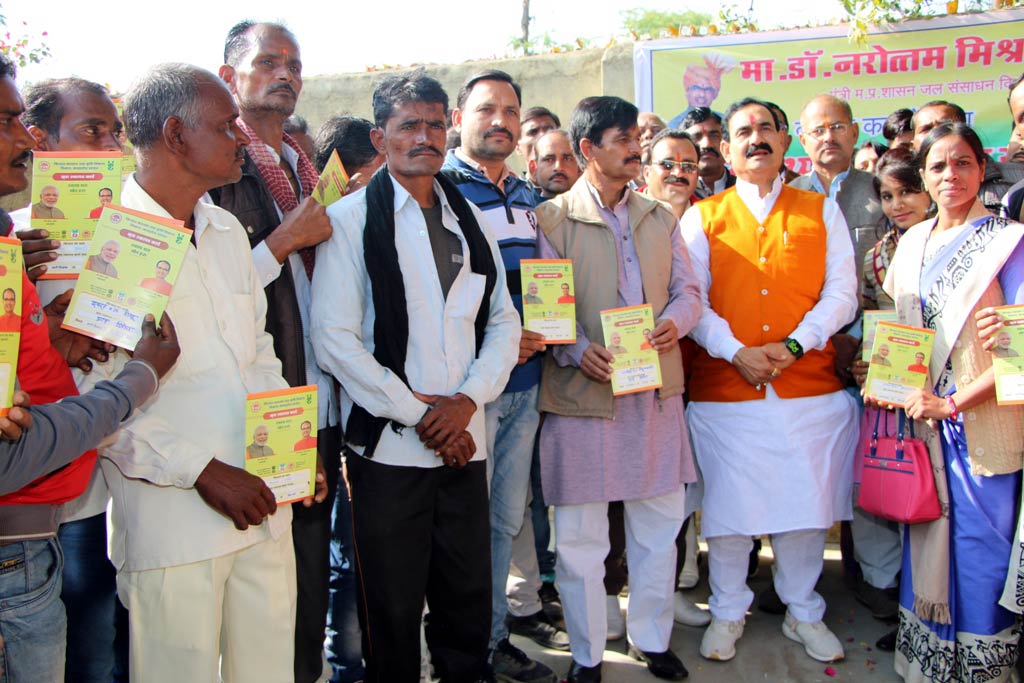
Bhopal, 22 December 2017:
Public Relations, Water Resources and Parliamentary Affairs Minister Dr. Narottam Mishra today distributed soil health cards to farmers in Datia. Dr. Mishra told farmers to avail benefits of the state government schemes to increase their income. These schemes have become a strong medium of improving economic situation. He said that the health examination of soil will ensure advanced farming and increased production.
Dr. Mishra at National Service Scheme Camp
Dr. Narottam Mishra took part in the conclusion programme of National Service Scheme camp of Government Higher Secondary School at Badouni in Datia district. He said that qualities of leadership, cooperativeness and community labour are developed in students through NSS which improves the personality of students.
Multi-gym inaugurated
PR Minister Dr. Mishra inaugurated multi-gym at Badouni. He appreciated the efforts made to start the gym. Public representatives were present during the programme.
Assistance to victimized family
Dr. Mishra presented assistance of Rs 4 lakh to a family affected by snakebite. Recently Mithilesh Kushwaha of Bahadurpur village died of snakebite.
80-year-old farmer Athhilal yearly income is Rs 4 lakh
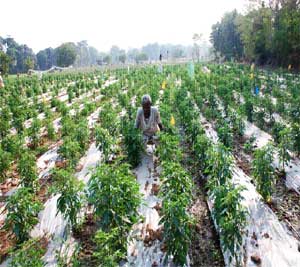
Bhopal, 18 December 2017:
Athhilal Kushwaha, a resident of Majhgavan in Katni district is still growing vegetables on his land at 80 years of age. For this he is taking all benefits of government schemes. He is earning Rs 4 lakh yearly through vegetable production
thhilal is currently growing lay finger, peas, chilly, cabbage and capsicum. He has constructed a shade net house under Protected Farming Scheme on one acre in his field. For this he received a grant amount of Rs 14 lakh 20 thousand from the Horticulture Department. Along with shade net house, they are also making use of mulching and drip irrigation for improved production.
He is receiving 100 times more benefit from using mulching and drip irrigation. Drip irrigation saves water and mulching also helps in controlling weeds. Now work of four hours can be finished in one hour. A batter is made through drip and pesticides are easily sprayed on plants thus saving labour.
Entire Country’s Eyes Set on Bhavantar Bhugtan Yojana: CM Shri Chouhan
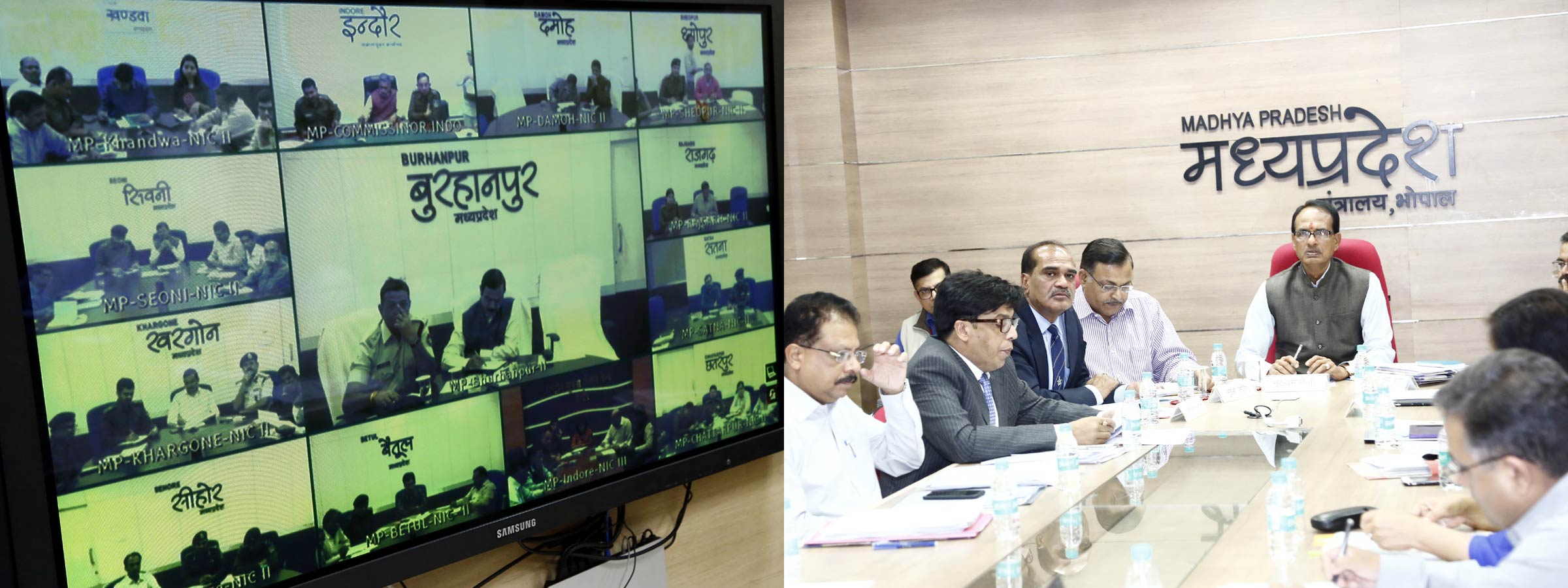
Bhopal, 20 November 2017:
Chief Minister Shri Shivraj Singh Chouhan has said that Bhavantar Bhugtan Yojana is a wonderful scheme to protect farmers' interest. Eyes of the entire country are set on Bhavantar Bhugtan Yojana. He clearly instructed the officers to ensure that the correct difference amount should be deposited in the bank accounts of the farmers. Under the scheme, first payment will be made to 1.35 lakh farmers together on November 22.
Chief Minister Shri Chouhan was discussing Bhavantar Bhugtan Yojana in detail with district collectors through Video Conferencing at Mantralaya today. On this occasion, Chief Secretary Shri BP Singh and other senior officials were present. The Chief Minister clearly told the officials that all formalities should be completed within time with utmost care for payment of price difference so that farmers can get fair value of their produce on time. No lapses will be tolerated in this regard. The farmers who sold produce between October 16 and 31 under the scheme will be paid directly in their bank account on November 22. He said that farmers, who missed the registration, will be given registration facility between November 15 and 22.
Shri Chouhan asked collectors of Hoshangabad, Harda, Bhopal, Dewas, Sehore and Narsinghpur districts to visit Krishi Upaj Mandis to take stock of the situation for low rates of Urad. Cancel the bid if necessary, so that farmers get the fair price for produce.
He instructed to upload and verify information on the portal so that payment can be made on time. Shri Chouhan also instructed to ensure payment of insurance claim of kharif crop to farmers. They said that there should be no shortage in it. This scheme is like a 'Sanjvanee' for farmers. Under this, payment of around Rs 8000 crore will be made to farmers.
Principal Secretary, Agriculture, Dr Rajesh Rajora informed that due to the implementation of Bhavantar Bhugtan Yojana, arrivals have increased in Mandis. Besides, the farmers of Madhya Pradesh are also getting higher prices on their produces as compared to farmers of other states. Proper arrangements of sale have been made. Model rates have been displayed in all mandis. Agriculture Commissioner, Shri PC Meena and other officials were present in the meeting
Arrival of crops increased in Mandis due to Bhavantar Bhugtan Yojana, farmers getting good value
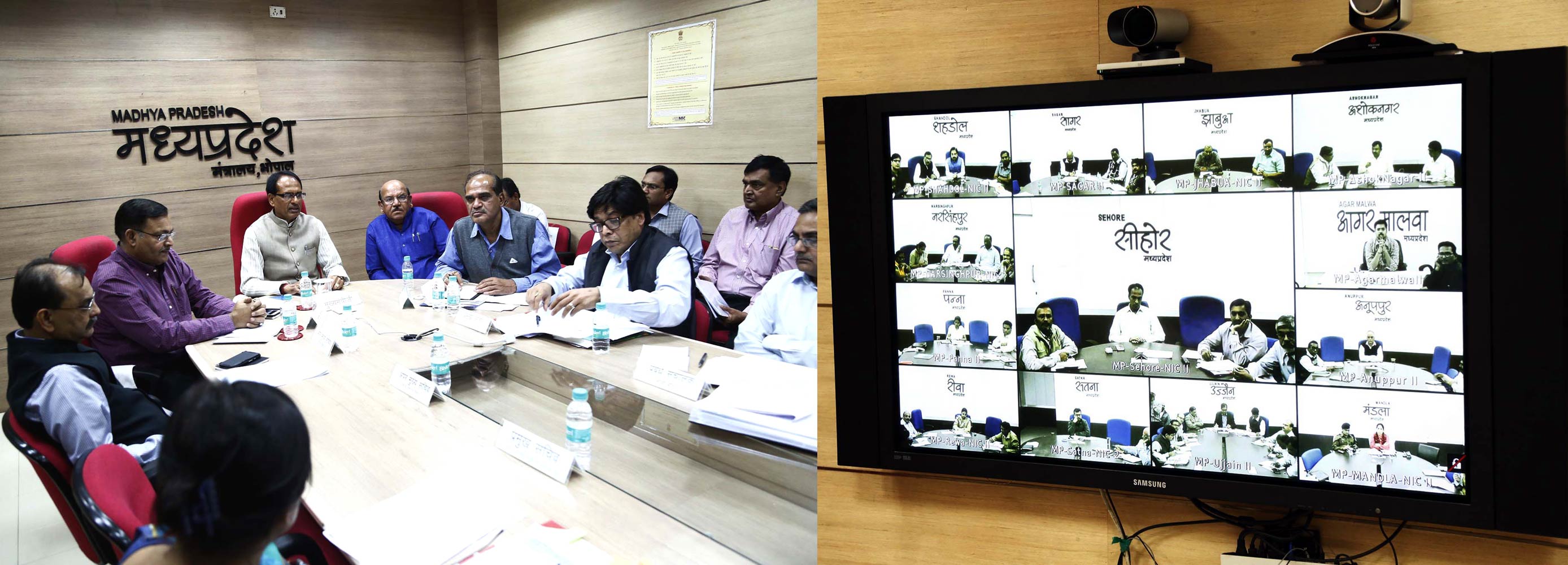
Bhopal, 13 November 2017:
Chief Minister Shri Shivraj Singh Chouhan apprised himself about the execution of Bhavantar Bhugtan Yojana through video conference with divisional commissioners and collectors today at Mantralaya. Collectors said that confusions prevailed earlier about Bhavantar Bhugtan Yojana are minimized now. Consequently, arrival of crops has increased. Farmers are satisfied on getting good value of crops. Crops are hitting 20 weekly markets in remote areas of tribal districts. These weekly markets have been included due to arrival of the crops. Apart from this, 51 up-mandis too have been activated where farmers are coming with considerable quantity. So far, 171 lakh metric tonne grains have reached mandis. Mandis have generated revenue of Rs 28 crore in last one month alone.
The Chief Minister appreciated all the collectors for making the scheme successful by working proactively in the interest of the farmers. He said that this is the time to extend support to farmers. They are in crisis. Bhavantar Bhugtan Yojana is a mean to serve the farmers. This will help in giving historic justice to farmers. He issued instructions to make monitoring teams more active and vigilant for giving right value to farmers. He said that those who created negative perception regarding the scheme, should not be given the same opportunity again.
Chief Minister Shri Chouhan asked collectors to send message through SMS about the payment being made under the scheme to 1.55 lakh registered farmers selling their crops between October 16 and 31 in mandis byNovember 20. The Chief Minister instructed district and divisional level monitoring teams to visits mandis.
Shri Chouhan said that payment of price difference to farmers who sold their crop between October 16 and 31 should be ensured. He said that full transparency must be maintained in payment process. Farmers should be served by extending support and no opportunity should be given to anti-farmer people to defame this farmer-friendly scheme.
Shri Chouhan instructed to carry out verification of all farmers' bank accounts. He said that sowing area, production etc. should also be verified cautiously apart from bank accounts. He instructed to collect detail of bank accounts of registered farmers and avail them to mandis and deposit the money in farmers account. He said that farmers will get opportunity to put their any type grievance.
The Chief Minister said that amount of price difference of the 15 days will be deposited in farmers' account on Farmers' Convention to be held in Ujjain on November 20.
He said that farmers' trust in Bhavantar Bhugtan Yojana is increasing. All confusions have gone. He said that some so-called anti-farmer people had tried to spread misleading information about the scheme, they did not succeed.
Shri Chouhan said that farmers should know how much value they have got for their crop. Each farmer should get benefit of this scheme. If real farmers have missed registration under the scheme due to some reason, collect their detail and register them after verification. Registration facility will be opened for such farmers between November 15 and 22. He instructed collectors of cotton producing districts to make special arrangements for cotton procurement and monitor it. It was informed that 15500 quintals have been procured at minimum support price at 8 centers in the state.
The Chief Minister asked the collectors to encourage farmers to take benefit of storage grant scheme as well. In the Scheme, the amount of grant has been increased from Rs seven to Rs 9.90 per quintal per month. He said that offline applications will be registered online soon.
Collectors appreciated
The Chief Minister appreciated the efforts made by collectors of Shahdol, Jhabua and Alirajpur districts to bring the produce of tribal farmers to mandis. Special vehicles were arranged for collection of tribal farmers' produce in these districts. Total 2000 quintal grains reached Mandis in Shahdol district. Nodal officer was appointed for each village so that every farmer can be given benefit of Bhavantar Bhugtan Yojana.
The Chief Minister said that the implementation of Bhavantar Bhugtan Yojana has been taken in mission mode. He instructed to continue such efforts in the future as well for this historical decision for farmers.
Take action against those who are spreading misleading information about tribal's land
Discussing other issues with divisional commissioners and collectors, Chief Minister Shri Shivraj Singh Chouhan said that some anti-social persons and groups are spreading misleading information that the government is making legal provision to sell their land to non-tribal people.
Shri Chouhan asked divisional commissioners and collectors that keep an eye on such persons and take strict action against them for spreading misinformation. The Chief Minister clarified that the government is not making any such legal provision nor has any intention to do so.
He said that people of tribal community were the owners of their land and will always be the same. He said that such anti-social elements are spreading misinformation in tribal dominated districts and they should not be paid attention. He asked collectors that tribal community people should be made vigilant and they should be alerted for not being misled by such people.
Chief Secretary Shri BP Singh and other senior officials were present in the video conferencing.
International Training on Agricultural Engineering Technologies for Enhancing
Productivity and Profitability in Agriculture Sector at ICAR-CIAE, Bhopal
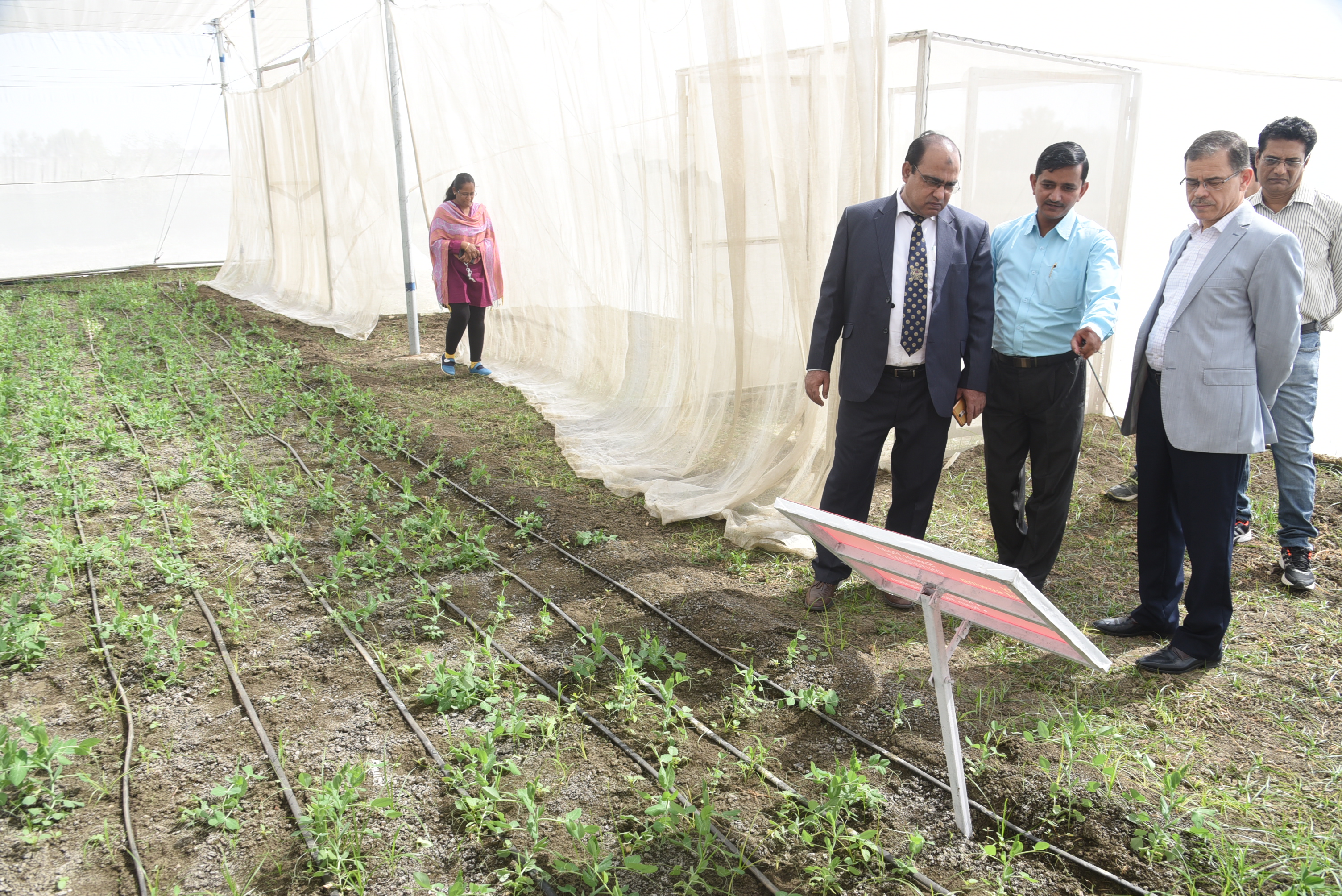
Bhopal, 6 November 2017:
An International Training of African-Asian Rural Development Organization (AARDO) on
Agricultural Engineering Technologies for Enhancing Productivity and Profitability in
Agriculture Sector commenced on 24 October, 2017 at ICAR-Central Institute of Agricultural
Engineering (CIAE), Bhopal. The training sponsored by AARDO and Ministry of Rural
Development, GOI was attended by eight participants; one each from Bangladesh, Egypt,
Lebanon, Malaysia, Palestine, Sri Lanka, Sudan and Zambia.
During this 14 days (Oct. 24 to Nov. 6, 2017) training programme, knowledge about
technologies and equipment for agricultural production, irrigation and drainage, processing and
value addition and renewable energy was imparted through lectures, presentations, practical
sessions, hand-on experience and field visits.
Valedictory function of the training was held on Nov. 6, 2017. Secretary General of African-
Asian Rural Development Organization (AARDO) His Excellency Eng. Wassfi Hassan El Sreihin.
Dr. KK Singh, Director, ICAR-Central Institute of Agricultural Engineering presided over the
function.
The Secretary General of AARDO informed that AARDO was formed in 1962 in recognition of
need for cooperation among countries in the field of agriculture and rural development. He also
told that AARDO is an autonomous inter-governmental organization with 32 member countries.
AARDO realizes its objectives, among others, by way of human resource development which is
based on training programmes, workshops, seminars, study visits, deputation of experts, etc.
AARDO strategies are broadly focussed on four areas, viz. human resource development,
financing of development pilot projects, dissemination of information and networking. He
further stated that keeping in view of the vast experience and technological know-how
available in India in the field of Human Resources Development; arrangements have been made
with the Government of India for the award of training fellowships to the officials from AARDO
member countries. Having realized that agriculture is one of the most influential professions in
rural development, AARDO has been supporting training programmes for agriculture
professionals in its member countries and there is no better organization in India than Indian
Council of Agricultural Research (ICAR) to host such training programmes. In the specific area of
Agricultural Engineering, AARDO has been collaborating with ICAR-Central Institute of
Agricultural Engineering (CIAE), Bhopal since 2010 and all its programmes have been highly
effective in imparting appropriate technical know-how to the participants.
In his presidential address, Dr. KK Singh, Director, ICAR-CIAE told that over more than four
decades of its existence, ICAR-CIAE has developed many technologies highly relevant to
marginal, small and medium scale farmers. The institute is an active collaborator to various
international agencies like AARDO, UN-EPCAM, WAAP, USAID, SAARC, etc. He further added
that this course aimed at enlightening the participants in the areas of: Agricultural
Mechanization, Post-harvest Mechanisation, On-farm Energy Management and Agricultural
Mechanization Strategies; relevant to the member countries of AARDO and informed that this
is fifth time that ICAR-CIAE has organised training for participants of AARDO member countries.
He informed that the discussions during the current training helped the scientist of the institute
to understand geographic, social, economic and political scenario of the participating countries
and hoped that this programme would prove to be stepping stone towards formation of
collaborative developmental projects in future. He assured that ICAR-CIAE would extend all
support in the field of agricultural engineering to the AARDO and stakeholders of its member
countries.
Earlier, participants shared their experiences during training and expressed that they could
gather a lot of new information which would prove very important for rural development in
their respective countries. They also expressed that getting to know geographical and social
framework of central India and relishing local cuisine has been a memorable experience for
them. On this occasion, course director of the training, Dr. Nachiket Kotwaliwale presented a
detailed report on the proceeding of 14-days training and Dr. PC Bargale presented vote of
thanks to the sponsors, participants, training faculty and all the dignitaries.
Collector authorised for open auction for sale-purchase outside Mandi premises under Bhavantar Bhugtan Yojana
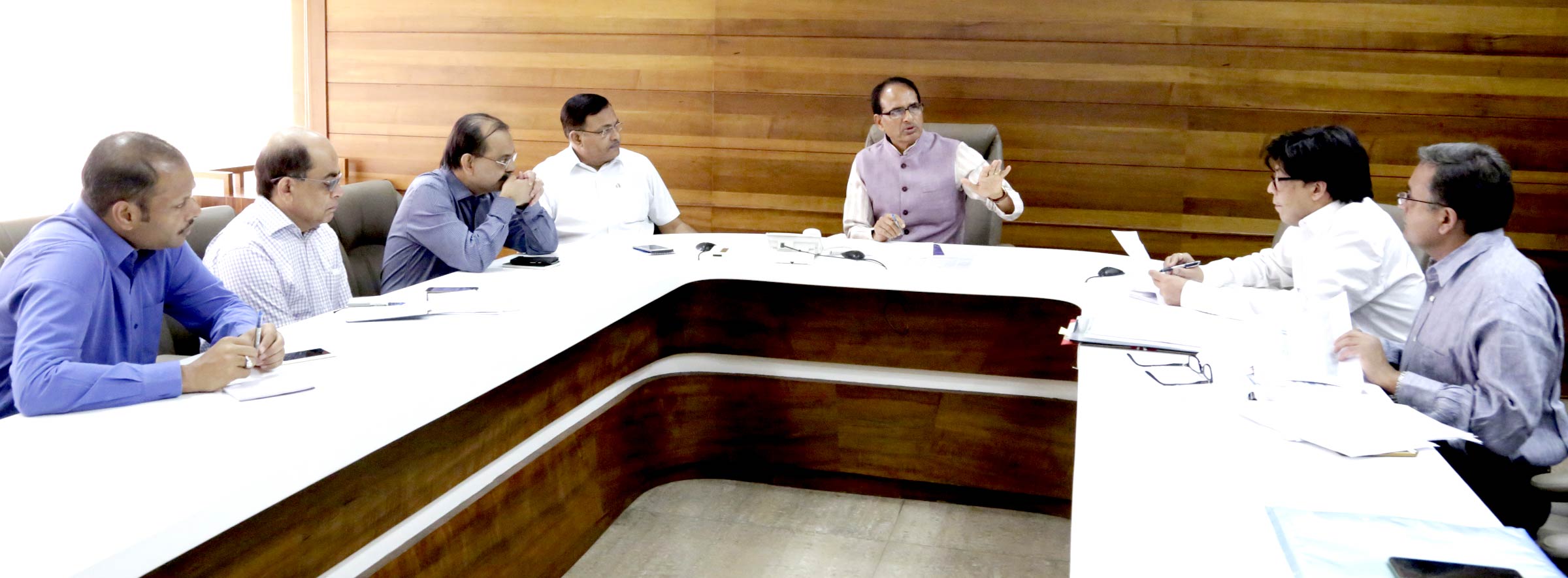
Bhopal, 3 November 2017:
The State Government has authorised district collector to arrange open auction for sale-purchase outside Mandi premises under the Bhavantar Bhugtan Yojana. According to the order issued by the Farmers Welfare and Agricultural Development Department, such places which are not notified for Krishi Upaj mandi/ up-mandi, district collector will declare them special premises after getting approval in district level committee of the scheme. The places need to be used as Krishi Upaj Mandi in the wider interest of farmer, will be declared special premises.
It would be necessary to declare special mandi premises that there should be minimum 5 active traders in the premises, who have a license number in their name. At the same time, there will be minimum one inspector, four assistant sub-inspectors, and proper arrangement of transparent auction, digital weighing and payment in the premises.
It will be clarified that Mandi Fee and receipt of payment to farmers is being verified before exit of produce purchased by the licensed traders and any type of deduction on the payment of farmers such as Tulai / Hammali and others Commissions etc. are not being done.
Such special premises will be considered only under the notified premises of their respective original Mandi /Up-Mandi. In such special premises, the income received from agricultural marketing arrivals, purchasing and sale fees and Mandi fee will be recorded on the portal, quoting in the form of outer premises/ weekly Haat. These premises will be temporary premises for the period of the scheme
Bhavantar Bhugtan Yojana to be Continued: Farmers must not Come in Any Ones Entrapment
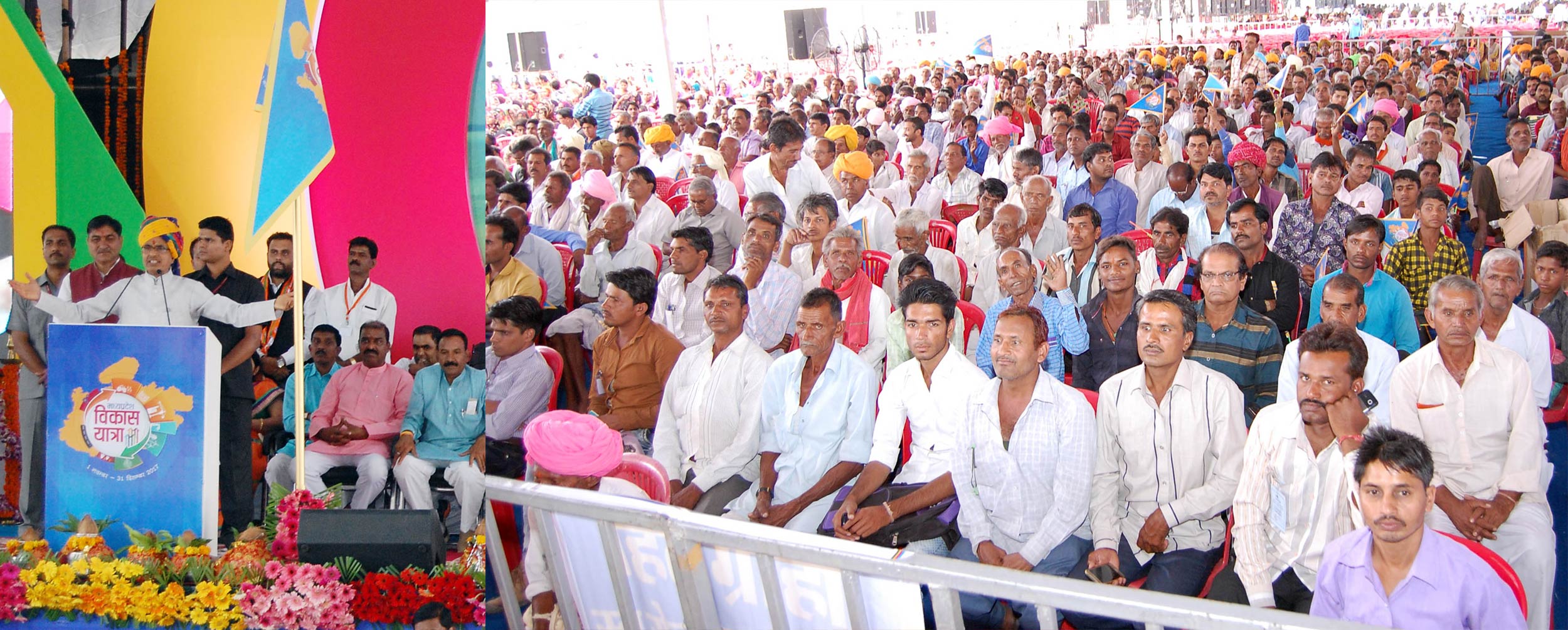
Bhopal, 1 November 2017:
Chief Minister Shri Shivraj Singh Chouhan said that Bhavantar Bhugtan Yojana will be continued in the interest of the farmers. He further mentioned that people of the opposition is creating confusion about this scheme. . Shri Chouhan made appeal that farmers should not come in any ones enticement. He stated that he is a son of a farmer and understand the pains and problems of the farmers.
CM Shri Chouhan was addressing the inaugural function of Vikas Yatra on the occasion of Madhya Pradesh foundation Day in village Bhanpura of district Mandsaur. He dedicated unit -2 of Bhanpura Canal Project on the occasion. He also dedicated and laid foundation of development and construction works costing about Rs. 500 crore of Mandsaur district today. These projects will irrigate 37 thousand 700 hectare land of 130 villages Moreover, Shri Chouhan announced that keeping in view the scanty rainfall in the state, temporary electricity connections will be provided to the farmers for a period of 2 months. Shri Chouhan said that the government will provide pucca house to every poor person of the state during the next 3 years. He further stated that land lease (patta) will be given to every poor person for his/her present house and the government will also provide them houses.
Inaugurating the Pradesh Vikas Yatra from village Bhanpura, Shri Chouhan said that our Madhya Pradesh will become an example of constant development now. Speed of development will not break in any condition. He gave credit to the hard labour of the farmers for over 20 percent growth rate of the state achieved constantly during the last 5 years. Shri Chouhan stated that Madhya Pradesh has no more a Bimaru State. Irrigation facility was provided on just 7.5 lakh hectare land of the state in the past. The irrigation area has been increased to 40 lakh hectare area with the efforts of the government. Congratulating the farmers of Garoth and Bhanpura area, Shri Chouhan said that this is happened first time that water is being supplied from Gandhi Sagar to every farm and house of Bhanpura and Garoth tahsils by laying pipeline through underground canal. He mentioned that this area now will enrich with crops.
Shri Chouhan made announcement for approval of Rs. 800 crore for Shamgarh-Suwasra Irrigation Project. The project on completion will facilitate irrigation on 40 thousand hectare land of 180 villages. He further announced for survey to supply water to the village of Manasa of Neemuch district. Shri Chouhan mentioned that the approval will be given for irrigation projects as demanded by the local public representatives on the basis of survey and its report. All kind of new construction works will be carried out in Dudhakhedi Mataji Mandir. Positive steps will be taken for 100 beds hospital in Garoth. Shri Chouhan mentioned that all the obstacles related to establishment of food park in Daloda will be removed. Tolas and Majras (Settlements) of Garoth area will be made revenue villages. Electricity will be provided to all the deprived families within next 2 years.
Benefit certificates of over Rs. 24 crore of various government schemes were distributed to total 17 thousand 892 beneficiaries of Garoth and Bhanpura blocks in the programme. The Chief Minister Shri Chouna also distributed benefits to 25 beneficiaries symbolically.
Local MP Shri Sudhir Gupta and MLA Garoth Shri Yashpal Singh also addressed the programme. MLAs Shri Jagdish Devda, Shri Omprakash Saklecha, Shri Dilip Singh Parihar, President Jila Panchayat Smt. Priyanka Dr. Mukesh Giri Goswami, Chairman Farmers Welfare Commission Shri Ishwarlal Patidar, Chairman District Cooperative Bank Shri Madanlal Rathore, Office Bearers of Panchayat Raj Institutions, Public Representatives and Citizens in large number were present in the programme.
Farmers getting fair price after Bhavantar Yojana
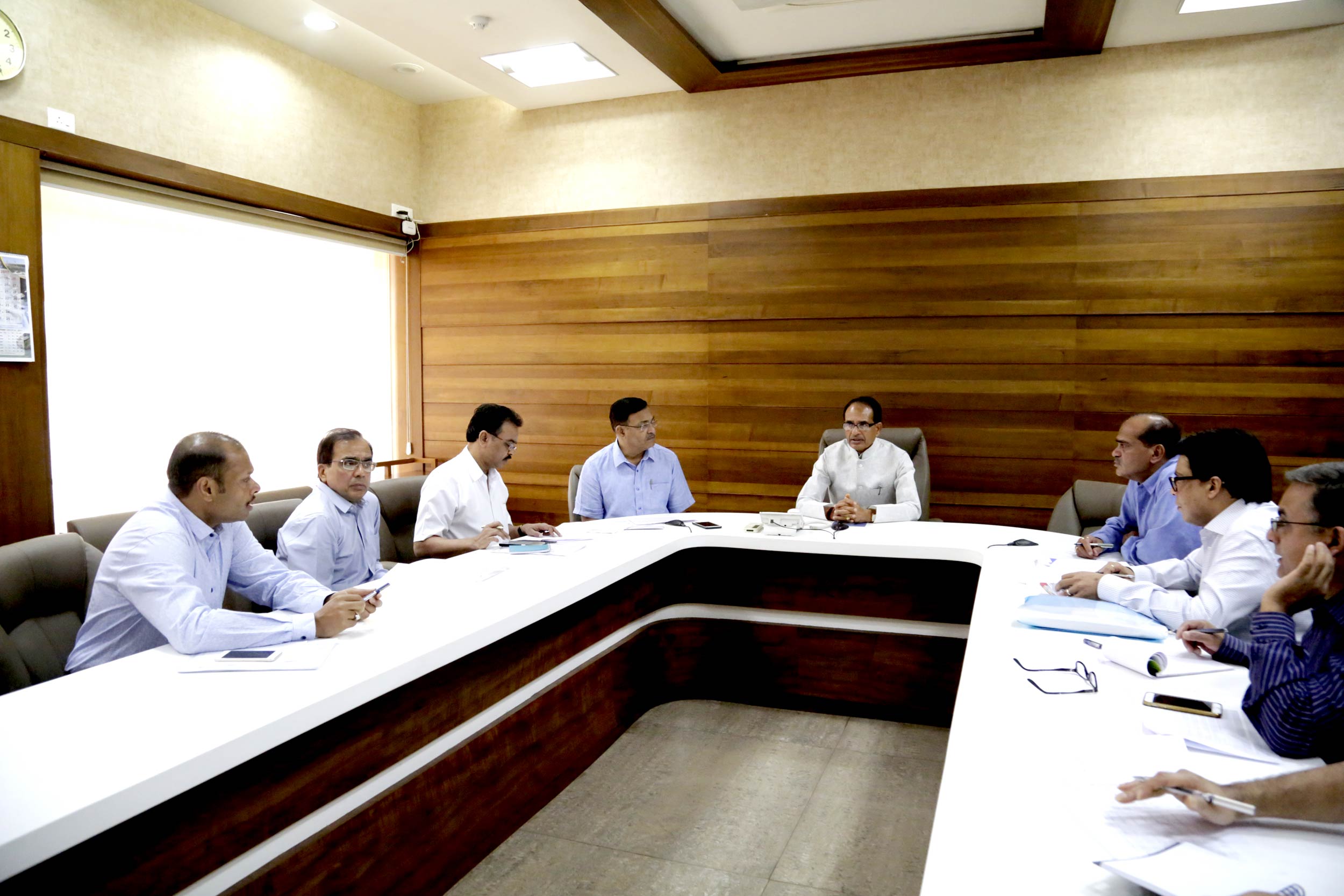
Bhopal, 1 November 2017:
Chief Minister Shri Shivraj Singh Chouhan today reviewed the Mukhya Mantri Bhavantar Bhugtan Yojana at the Mantralaya. He issued instructions to ensure all arrangements for display of model rates of produce in the mandis and their purchase.
Chief Secretary Shri B.P. Singh, Additional Chief Secretary Home Shri K.K. Singh, Commissioner Agriculture Production Shri P.C. Meena, Principal Secretaries to the CM Shri Ashok Vernwal and Shri S.K. Mishra, Mandi Commissioner Shri Faiz Ahmed Kidwai and senior officer were present.
It was told that action has been taken against anti-social elements who have been disturbing the mandi atmosphere. Cash payment to farmers has begun and they are now not facing any kind of problem. The Chief Minister issued instructions to all the senior officers to visit the mandis and redress grievances of farmers immediately.
During the review it was told that farmers are receiving fair price for urad and moong yield after Bhavantar Yojana. It has also been told that the Bhavantar Yojana has neither made any negative effect nor has the price of the produce reduced. Farmers are also not facing any loss. Mandi trade is being undertaken peacefully and farmers are getting their cash payment. Collectors and related administrative officers are taking care of the arrangements.
Directions to provide fair price to farmers for their produce at any cost
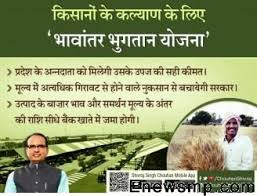
Bhopal, 31 October 2017:
Chief Minister Shri Shivraj Singh Chouhan today conducted a detailed review of the Bhavantar Bhugtan Yojana at a meeting of high level officials at his residence. He directed to ensure that the farmers must get fair price for their produce at any cost. Chief Secretary Shri B.P Singh and other senior officials were present at the meeting.
Shri Chouhan said that control rooms should be set up in the districts to remove the myths being spread regarding Bhavantar Bhugtan Yojana. He told to make proper arrangement for immediate redressal of the farmers’ grievances on the toll free number. He told to entrust responsibility of the districts to the senior officials so that they can go to the mandis and ensure proper implementation of the scheme and redress grievances of farmers on the spot.
The Chief Minister clarified that traders will not have to face any obstruction in cash payment to farmers against their agricultural produce. He said that cash payment of Rs 50 thousand must be made to the farmers on sale of agricultural produce.
Madhya Pradesh tops in farmers welfare and agriculture development
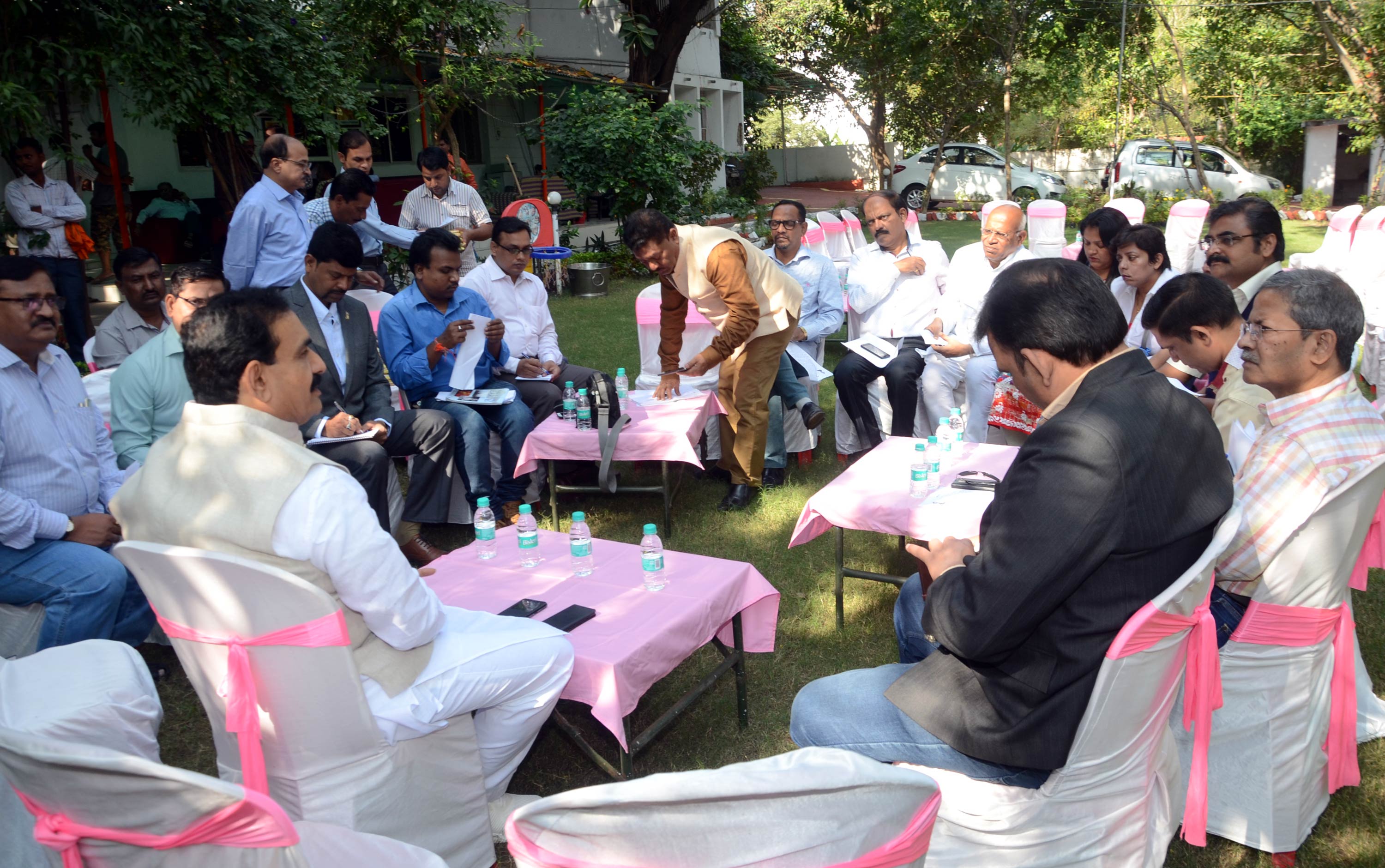
Bhopal, 30 October 2017:
The media of neighbouring state has started taking interest in the remarkable progress made in various areas of development and public welfare in Madhya Pradesh. In this context, a delegation of journalists from Maharashtra state has arrived in the state. The delegation visited various places in the state, saw the development works, apprised themselves with the innovations and met the farmers and entrepreneurs to get acquainted with the condition of the state.
The journalists delegation also met the Public Relations Minister Dr. Narottam Mishra at the latters residence. Welcoming the delegation on their visit to the state Dr. Mishra said that the state has made remarkable progress through the implementation of schemes related to agriculture, education, employment, industry and women and child development related directly to the common man in the state. Dr. Mishra said that the state has witnessed a historic achievement of rise in irrigation area from 7 lakh hectare to 40 lakh hectare in the last 14 years in state. It is due to the six-time rise in irrigation area that Madhya Pradesh has received the Krishi Karman Award consecutively. Work of providing water for irrigation to every field has been taken up on priority. He said that Chief Minister Shri Chouhan has ensured adequate power supply to every section after implementing power feeder separation system in Madhya Pradesh on the lines of Gujarat.
Dr. Mishra said that several schemes of Madhya Pradesh are now being implemented in other states also. These include Ladli Lakshi Yojana, Cycle Supply Scheme. Mukhya Mantri Teerth Darshan Yojana. The PR Minister said that the recently launched Bhavantar Bhugtan Yojana is proving useful for farmers who are now receiving a respectable price for their produce in the market. Dr. Mishra gave information about the activities of parliamentary affairs and public relations in the state. They were given specific information about the provisions and schemes for being awarded under different categories and to give accreditation, insurance scheme, Shraddhanidhi yojana for journalists. The journalists told Dr. Mishra that they were very happy to witness the natural beauty of Madhya Pradesh specially Bhopal. They have acquired new information during their visit to various institutions.
The journalists delegation from Maharashtra met Commissioner Agriculture Production of Madhya Pradesh Shri P.C Meena and Principal Secretary Farmers Welfare and Agriculture Development Dr. Rajesh Rajoura on October 29. They collected information about schemes implemented in the field of agriculture for farmers by the state government and achievements of the state. The Journalists were told by Commissioner Agriculture Production Shri P.C. Meena that the effective work plan for doubling income of farmers in Madhya Pradesh is being complied with. The state has been receiving the Rashtriya Krishi Karman Award for the last five years consecutively.
Principal Secretary Dr. Rajora has informed that Madhya Pradesh tops in the country in production of pulses, oil seeds, grams, masoor, soybean, guava, tomatoes and garlic. Similarly, Madhya Pradesh holds second rank in the country in production of wheat, arhar, sarson, amla, oranges, peas and coriander. The agriculture production of Madhya Pardesh was 2.14 crore metric tonne in the year 2004-05, which has grown to 5.44 crore metric tonne in the year 2016-17. He further added that the state government has given priority to implement the recommendations of Dr. Swaminathan Commission to redress the grievances of the farmers beside development of the agriculture sector. The Krishi Cabinet has been formed in Madhya Pradesh in the interest of the farmers. Moreover, Dr. Rajora informed that the Bhavantar Bhugtan Yojana is being implemented in the state first time in the country for the crops of soybean, groundnuts, sesame, ramtil, maize, moong, urad and arhar. Registartion of the farmers have been made on the portal under the scheme. Over 16 lakh farmers of the state have registered themselves for different crops in this scheme. He further informed that free registration was carried out from September 11 to October 15. Crops have started arriving in the krishi upaj mandis of the state. The difference between minimum support price and the model sale price is being deposited in the bank accounts of the farmers.
Journalists Visit Tribal Museum and Archeology Museum
Delegation of Journalists also visited Tribal Museum of Culture Department, State Museum of Archeology Department and Shaurya Smarak. On this occasion, it was informed that Madhya Pradesh is located at the center point of the country geographically. The borders of Madhya Pradesh touch borders of 5 states. Glimpses of these states are clearly visible in the tribal culture of the state. Different phases of the life of tribal culture , festivals, and ceremonies like marriage etc. are displayed in the museum in the interesting and attractive manner. Museum has been established with an objective to watch tribal community in totality and to understand their life.
Delegation of Journalists from Maharashtra also visited State Museum of Archeology Department. Person in-charge of the State Museum informed that the Museum houses 16 galleries. The State Museum has been constructed at the cost of Rs. 12 crore. Pre-historic fossils, excavated material, metal idols, records, idols, royal collection, textile, freedom struggle, postal stamps, autographs, manuscripts, pictures, currencies and arms etc. are being exhibited nicely in the galleries of the museum.
Seed Federation to have its brand like IFFCO, KRIBHCO: MoS Shri Sarang
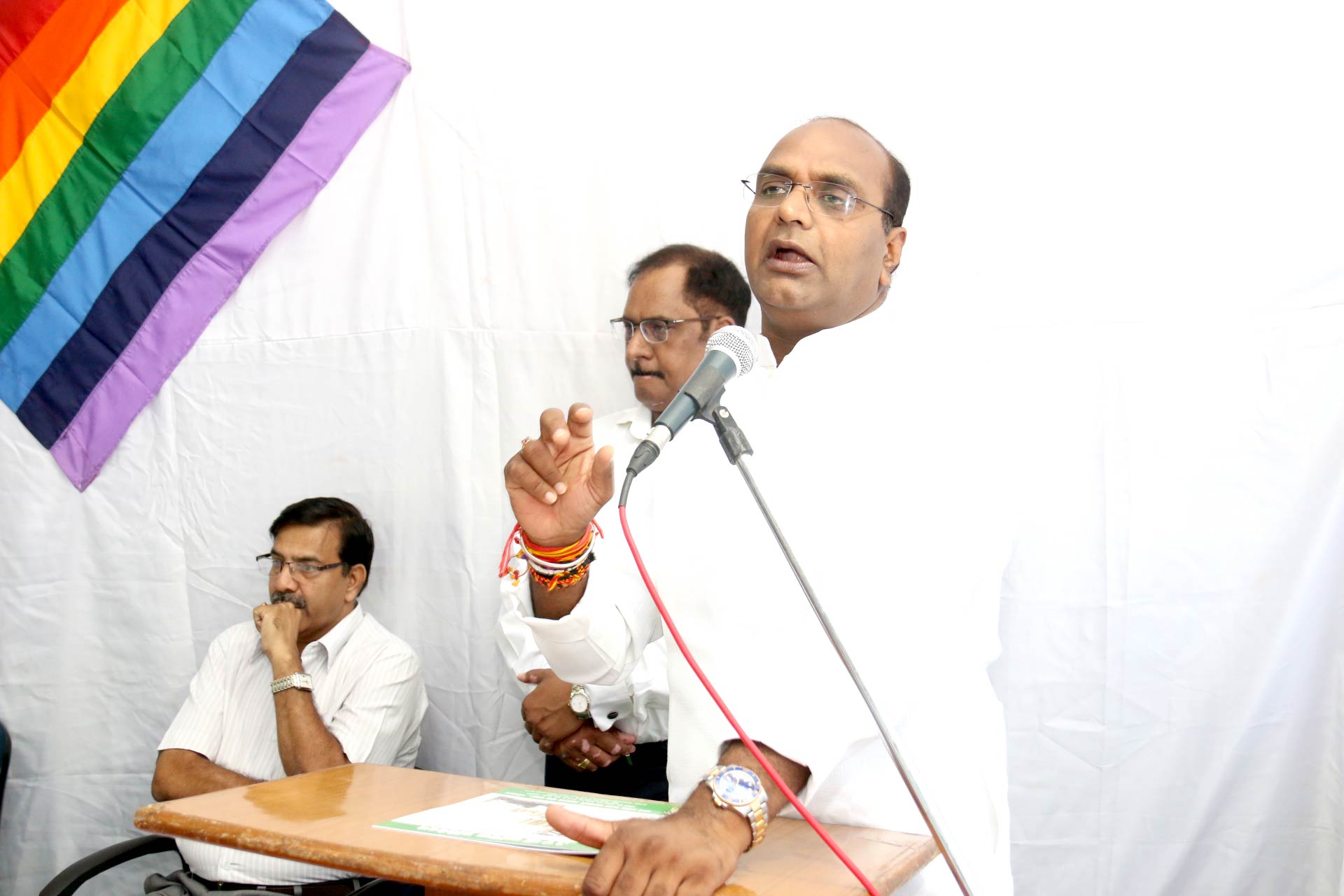
Bhopal, 27 September 2017:
Minister of State for Cooperative Shri Vishwas Sarang said that Seed Federation is preparing to introduce its brand like IFFCO and KRIBHCO. Execution is being made by forming short term and long term schemes by Seed Federation. Minister of State Shri Sarang was addressing the annual general meeting of State Cooperative Seed Federation.
Shri Sarang said that Seed Federation will have its brand. Quality of seeds will be maintained. Marketing of seeds will be done through seed producer committees through this brand. He said that execution on this plan has already started. This is a long term plan. The Minister of State said that logistic facility has been given to committees as part of short term scheme to ensure sale of seeds of seed producer committees. Shri Sarang said that seed federation will implement suggestions of seed producer committees. Marketing chain of seed societies will be made through the federation.
The Minister of State for cooperative Shri Sarang said that the areas will be earmarked which are suitable for seed production and seeds producer committees are producing the seed there. Cluster involving one or more district will be formed. The committees will be given technical and scientific inputs for seed production. Supply of this seeds in the areas where it is in demand will be ensured.
Annual report, budget and income and expenditure of the federation was approved in the meeting. Managing director of seed federation Shri RK Ghiya, MD, Apex Bank, Shri Pradip Nikhra, MD, Seed Certification Board, Shri KS Tekam, officers of concerned departments and office-bearers of seed producer committees were present in the meeting.
Samagra Swachhta Diwas organized by ICAR-CIAE at village Prempura in
Bhopal district
Bhopal, 25 September 2017:
Swachhta Hi Seva campaign under Swachh Bharat Mission implementation
programme is being organized in a big way at ICAR-Central Institute of Agricultural
Engineering, Nabibagh, Bhopal since 15 th Sept, 2017. Various activities related to
cleaning, plantation, sanitation, hygiene have been organized by the Institute within
the campus and nearby areas during first week of Swachh Bharat Mission Pakhwara.
As part of the campaign, Samagra Swachhta Diwas was organized by the
Institute, in Prempura village on 24 th Sept, 2017, located at 22 km from CIAE. More
than 250 staff members of the Institute performed Shramdaan and contributed in
the developing of a proper toilet facility in the village. Village Sarpanch Smt Kamla
Yadav and more than 100 farmers and rural women of Prempura village took part in
the activity. The staff of CIAE and villagers together carried out cleaning and made a
big area Parthenium free near Panchayat Bhavan and High School premises. On the
same day, creation of toilet facility in the village was also initiated by digging of pit
to free women of village from open defecation.
Addressing at this occasion, Dr. CR Mehta, In-charge Director, ICAR-CIAE appealed
the villagers to adopt the cleanliness measures to be fit and healthy. He emphasized
the need to have proper public toilet facility also within the village and assured them
of Institutes support in developing the same. Dr. M. Din, Chairman, Swachhta Hi
Seva campaign committee also addressed the gathering. Dr. U.R. Badegaonkar, I/c
KVK spoke about vermicomposting for cleaning of the village and earning profit
Progressive farmer Mr. Rajmal Yadav thanked for institute for adopting the village for
nutritional security and Samagra Swachata Diwas
Demand for soyabean as food and animal feed is rising in India: Scott Sindelar, Minister Counselor, Agriculture Affairs, USDA
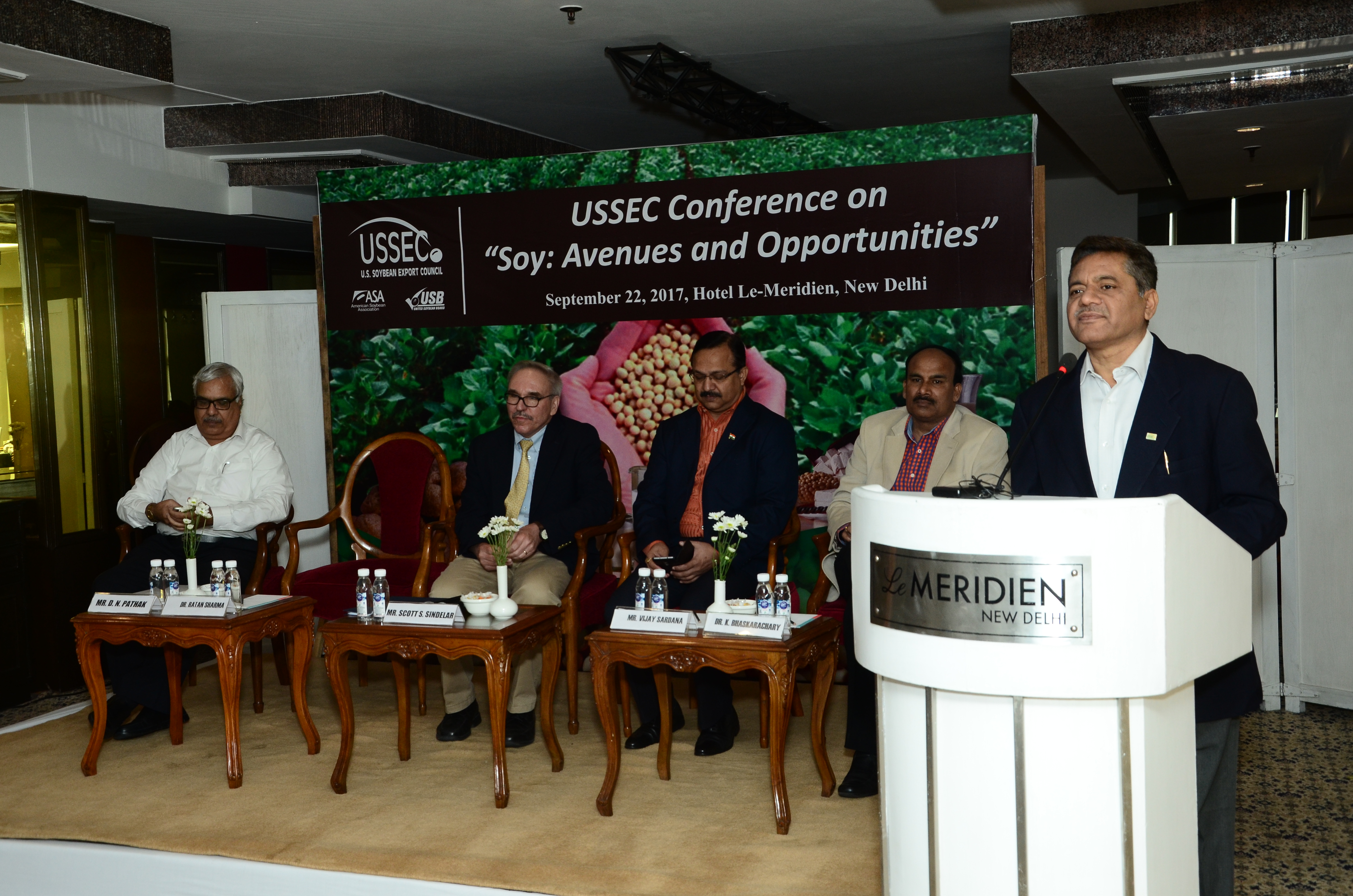 Bhopal, 25 September 2017:
A conference on the Soy: Avenues and Opportunities was organised by the US Soybean Export Council (USSEC) by involving its various stakeholders from the industry, government, academia, agri policy experts, US department of Agriculture (USDA and National Institute of Nutrition etc at Hotel Le Meridien, New Delhi.
Addressing on this occasion Mr. Scott Sindelar, the Minister Counselor of Agriculture Affairs at the American Embassy, New Delhi Said" If India wants to increase production of soyabean to meet domestic demand, it should allow use of innovative technologies, including genetically modified organism or GMO or allow imports from global market".
He said the existing processing capacity can be utilised by importing oilseed and highlighted that India's neighbour like Bangladesh is buying from overseas market. India is fifth largest producer of soyabean in the world with production of around 10-12 million tonnes, while the US at the top with 120 million tonnes output.
Mr. Vijay Sardana, an agriculture policy and trade expert spoke about addressing the nutritional challenges and creating employment through soy food business. Vijay replied the query on the GST and the regulatory matters. Dr. Prabodh Halde, head regulatory affairs, Marico covered the regulatory norms on the edible oil and other processed food products. Dr. Jyoti Prakash Tamang, Dean Sikkim University talked about various fermented soy food product and its commercialization in India. Mr. D N Pathak, Executive Director of the Soy Processors Association of India (SOPA) stated that soy food is one of the fastest growing businesses in India with an annual growth of 8 to 10%. Mr. Pathak advocated that our government should consider including soy in the school feeding and social welfare programs by framing proper policy on this. Mr. Indranil Chatterjee from the DuPont Nutrition presented about the protein rich foods and beverages made by using soy protein isolates and concentrates.
Speaking on the role soy can play in health and nutritional security of India, Dr. Ratan Sharma; head Soy Food Program of the USSEC stated that Soybean is one of the very few plants those provide a high quality protein with minimum saturated fat. Soybean helps people feel better and live longer with an enhanced quality of life. Soybeans contain all the three macronutrients required for good nutrition, as well as fiber, vitamins, minerals. Soybean protein provides all the essential amino acids in the amounts needed for human health. Protein in just 250 grams of soy bean is equivalent to protein in 3 liters of milk or 1 kg of mutton or 24 no’s of eggs. In addition to being a rich source of nutrients, soybean has a number of phytochemicals (isoflavones), which offer health benefits along with soy protein. Soy protein and isoflavones together contribute to a number of health benefits such as, cancer prevention, cholesterol reduction, keeping heart healthy, combating osteoporosis and menopause regulation. Being low in glycaemic index soy plays a very important role in maintaining the low sugar levels in diabetics.
Dr. Sharma discussed about various soy products including of the soymilk, tofu, soy nuggets, soy fortified wheat flour and gram flour, soy based Dal Analogue, and suggested that these products have been made by using high end processing technology, tasty and highly safe for consumption. He further emphasised that soy could be a wonderful solution to reduce the protein calorie malnutrition in India, and our government should include soy as a main nutritional ingredient for various supplementary nutrition and welfare programs to ensure a healthy young generation.
Dr. Sharma further explained about the nutritional quality of the soy oil from USA. Besides the regular nutritious soy oil US has developed high oleic soy oil. High oleic soy oil is being very popular as industry preferred substitute for partially hydrogenated vegetable oils and are used in all manners of processed foods especially the snack foods for deep frying. High oleic soy oil is free from trans fats as well as lower in saturated fat and contains three times more of beneficial monounsaturated fatty acid compared to conventional soy oil.
As per Dr. sharma recently in August 2017 US Food and Drug Administration FDA approved Bunge North Americas petition for a qualified health claim linking soybean oil consumption to reduced risk of heart disease. Soybean oil is the US most commonly used ingredient and top dietary source of polyunsaturated fats. Soy oil is the second largest edible oil used in India. Soybean oil is considered heart-healthy oil as its cholesterol-free and low in saturated fatty acids it contains 61 % poly-unsaturated fatty acids. Two fat components essential for health and wellbeing, linoleic and linolenic acids, are also found in the right proportions in soybean oil. It is also a good source of vitamin E. Like fish oils, soybean oil contains omega-3, known to be protective against heart disease and cancer.
Discussing about the Soy food business opportunities in India Dr. Sharma very clearly mentioned that raw material plays a major role to produce a quality product delivering proper nutrients and making a tasty product. Food specialty soybeans are not grown in India limiting the growth of soy food sector in lack of desired quality product with limited value addition possibilities. Dr. Sharma highly recommended the food specialty soybeans from USA which produces an excellent quality soy food with much better acceptability of the end product and excellent value addition possibility when compare with the Indian soybeans.
Recently soy food processing has been immersed as a very good source of creating the employment opportunities on a small, medium and large scale. India is the fifth largest producer of soybeans but in lack of awareness on its nutrition and the proper processing technologies this product is not getting the acceptance in the Indian diet. Although the soy food processing sector is growing at a faster rate of 10% annually but still needs to develop with a pace to bridge the protein gap of the country.
This program was attended by a large number of people from the soy food industry, trade associations, nutrition professionals, scientists and professionals from the multinational companies from all over the country along with the representatives from the press and media. The U.S. Soybean Export Council (USSEC) is a dynamic partnership of key stakeholders representing U.S. soybean producers, commodity shippers, merchandisers, allied agribusinesses and agricultural organizations. Through a global network of international offices and strong support in the U.S., USSEC provides trade and technical services as well as market access support in order to build a preference for U.S. soy and soybean products.
Punjab and MPs agriculture universities to sign MoU
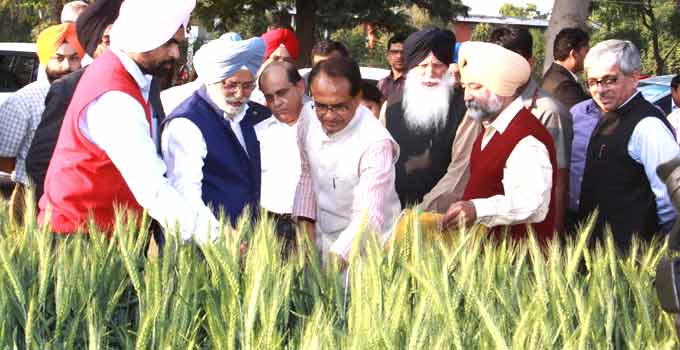 Bhopal, 8th March, 2016:
An MoU would soon be singed between Jabalpur University of Madhya Pradsh and Punjab Agriculture University for exchange of agriculture techniques and research.
This was decided during discussions between Chief Minister Shri Shivraj Singh Chouhan and his Punjab counterpart Shri Prakash Singh Badal at Ludhiana on Sunday.
Punjab's Deputy Chief Minister Shri Sukhbir Singh Badal also paid a courtesy visit to Shri Chouhan.
Earlier, the Chief Minister visited Punjab Agriculture University. Shri Chouhan.
He witnessed new researches in agriculture, development of varieties of mustard, drip irrigation, new varieties of mushrooms and their product, advanced agriculture implements and treatment of crop diseases.
Punjab's ACS Agriculture Shri Suresh Kumar, Agriculture Minister Sardar Tota Singh and university's Pro-Vice Chancellor Shri B.S. Dhillon were also present on the occasion.
The Chief Minister also witnessed an exhibition on the premises of the university. The university also gave presentations before Shri Chouhan.
The Chief Minister lauded activities of the university.
Empowerment of farmers by creating awareness about new agricultural technologies and to spread scientific temper is the need of the hour
 Mr. Ranjan Mukherjee Additional Director General, Prasar Bharti, is inaugurating the media workshop on “communicating Science & Biosafety” Makhanlal Chaturvedi National University, in Bhopal today.
Empowerment of farmers by creating awareness about new agricultural technologies and to spread scientific temper is the need of the hour. While delivering the key note address at the regional media workshop on communicating Science and Bio safety for Media Personnel at Makhanlal Chaturvedi National University of Journalism and Communication, (MCNUJ&C) Bhopal today, Mr. Ranjan Mukherjee, Addl. Director General, Prasar Bharati said that the agricultural research results should go from lab to land so that the farming community will be benefited for increasing agricultural production.
 Prof. B.K. khutiala, Vice Chancellor, Makhanlal Chaturvedi National University, is inaugurating the media workshop on “communicating Science & Biosafety” Makhanlal Chaturvedi National University, in Bhopal today.
Water conservation and irrigation technologies and information about high yielding varieties are to be informed to the farmers by media by rationality, enquiry and method apart from content. 62 national agricultural universities and 642 Krishi Vigyan Kendras in India are doing a commendable work in agricultural research. Kisan Channel of Doordarshan started by the Prime Minister of India aims at agricultural science communication and educating the farmers about relevant agricultural technologies and providing scientific information for increasing the agricultural production. Kisan channel will be a pioneer in creating journalistic standards in scientific reporting. Radio, Television and Print Media are mass communication channels to create awareness about agriculture biotechnology and bio safety. While delivering the inaugural address, Prof. B.K. Kuthiala, Vice Chancellor of MCNUJ&C, Bhopal said that media plays a key role in communicating science to farmers in modern farming techniques and agriculture operations for benefiting the farmers.
 Prof. B.K. khutiala, Vice Chancellor, Makhanlal Chaturvedi National University, Mr. Ranjan Mukherjee Additional Director General, Prasar Bharti, and Dr. P.J. Sudhakar, ADG, PIB Bhopal are at the media workshop on “communicating Science & Biosafety” Makhanlal Chaturvedi National University, in Bhopal today.
The Green Revolution, India is a big success story in agriculture sector. The scientific innovations and research should be over-all welfare of society. Radio is a mass media which popularize the hybrid varieties of rice which was known as ‘Radio Rice’. Bio safety also includes saving the man from the mankind. Media should search for the truth and it should have a truthful reporting and objectivity. Speaking on the occasion, Dr. P.J. Sudhakar, Addl. Director General of PIB, Bhopal said that the government has taken several measures on bio safety which includes setting up of Institutional Bio Safety Committee on Recombinant DNA (IBSE), Review Committee on Genetic manipulation and Genetic Engineering Appraisal Committee. The Bio safety regulatory system is governed by rules under the Environment Protection Act, 1986.
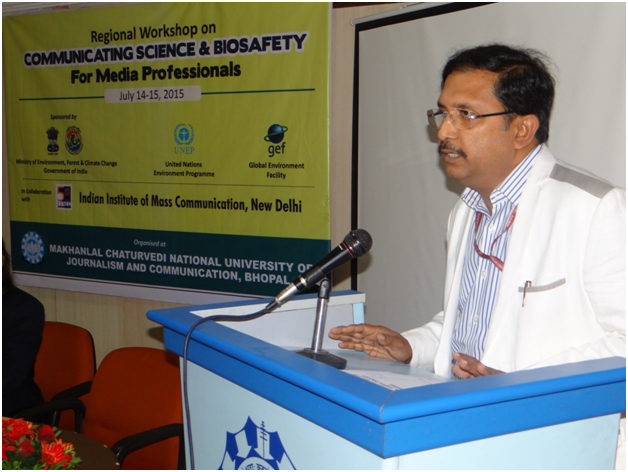 Mr. Ranjan Mukherjee Additional Director General, Prasar Bharti, is addressing the media workshop on “communicating Science & Biosafety” Makhanlal Chaturvedi National University, in Bhopal today.
The biological warfare should not happen for the betterment of the society and world. The Cartagena Protocol for bio-safety of United Nations framed important guidelines for the biosecurity and biosafety. Indian parliament passed several legislations like Plant Varieties and Farmer’s Rights Act, Geographical Indications Goods Act and Bio-Diversity Act for fulfilling the obligations of UN Convention on bio-diversity. Prof. Geeta Bamezai of IIMC explained the objectives of the workshop.
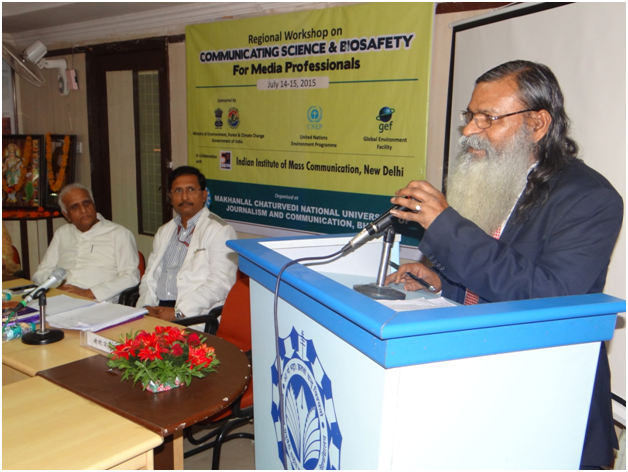
Dr. P.J. Sudhakar, ADG, PIB Bhopal is addressing the media workshop on “communicating Science & Biosafety” Makhanlal Chaturvedi National University, in Bhopal today.
Dr. P. Sasikala, HOD, New Media Technology, MCNUJ&C welcomed the gathering. Dr. Anand Pradhan proposed the Vote of Thanks. The two day workshop is organized by Indian Institute of Mass Communication with the collaboration of Ministry of Environment & Forest and Climate Change. UNEP (United Nations Environment Program) and GEF (Global Environment Facility) are the international organizations that are associated with the project. Dr. Rayies Altaf, Project Coordinator of IIMC also participated in the workshop.
Price Stabilisation Fund
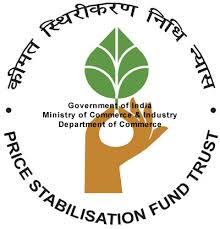 Union Agriculture Minister Shri Radha Mohan Singh while inaugurating National Conference on The Department of Agriculture & Cooperation has approved the Price Stabilisation Fund (PSF) as a Central Sector Scheme, with a corpus of Rs.500 crores, to support market interventions forprice control of perishable agri-horticultural commodities.
PSF will be used to advance interest free loan to State Governments and Central agencies to support their working capital and other expenses on procurement and distribution interventions for such commodities. For this purpose, the States will set up a revolving fund to which Centre and State will contribute equally (50:50).
The ratio of Centre-State contribution to the State level corpus in respect of North East States will however be 75:25. The revolving fund is being mooted so that requirements for all future interventions can be decided and met with at the State level itself. Central Agencies will, however, set up their revolving fund entirely with the advance from the Centre.
Procurement of these commodities will be undertaken directly from farmers or farmers’ organizations at farm gate/mandi and made available at a more reasonable price to the consumers. Initially the fund is proposed to be used for onion and potato only. Losses incurred, if any, in the operations will be shared between the Centre and the States.
Detailed guidelines for the scheme have now been approved and are available on the departmental website www.agricoop.nic.in .
Concerted Efforts Needed to Produce Clean Spices at Competitive Prices says Radha Mohan Singh
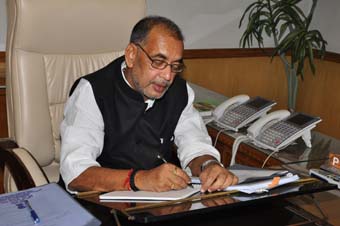 Union Agriculture Minister Shri Radha Mohan Singh while inaugurating National Conference on Development and Export of Spices in Pusa campus, New Delhi today, said that concerted efforts are needed to produce clean spices at competitive prices in order to sustain India’s share in world market speaking on the occasion he said that. Spices farmers have been facing the problem of low productivity, fluctuating prices coupled with biotic and abiotic stress resulting in low farm income. However, efforts of diversification, unfolding of nutraceutical and health benefit of spices and farming system models have provided better opportunity for improving income from spices, he added.
Shri Singh said that ICAR-Indian Institute of Spices Research Calicut and National Research Centre on Seed Spices Ajmer have pioneered in developing a number of high yielding varieties and production technologies.
Shri Radha Mohan Singh said that Spices Board under the Ministry of Commerce & Industry has been spearheading activities for excellence of Indian spices with respect to quality and hygiene of high level. The Board functions as an important link between the Indian exporters and the importers abroad and supports Indian spices brand building amongst the importing countries which is really needed to realize the slogan of Brand India and Make in India, he added.
Referring to India’s status in World Spice Trade, Shri Singh said that the export earnings showed a spectacular growth during the period from 2005-06 to 2013-14 as the earning increased from 592.9 million US $ to 2267.67 million US $. The volume of spices exported increased from 350,363 metric tons in 2005-06 to 817,250 metric tons in 2013-14.
Shri Singh said that Spices have been playing an important role in the Indian agrarian economy as it accounts for 5% of the agriculture GDP of the country. The agro-climatic conditions in the country provide an ideal habitat for the natural growth of various spices. There is a long list of 75 spices grown in India but chillies, black pepper, ginger, turmeric, cardamom, cloves, nutmeg, coriander, saffron and cumin are commercially more important. Shri Singh said that today, India is the largest producer, consumer and exporter of spices in the world.
PM urges fast-tracking of pro-farmer initiatives, chairs high-level meeting on PradhanMantri Krishi Sinchai Yojana
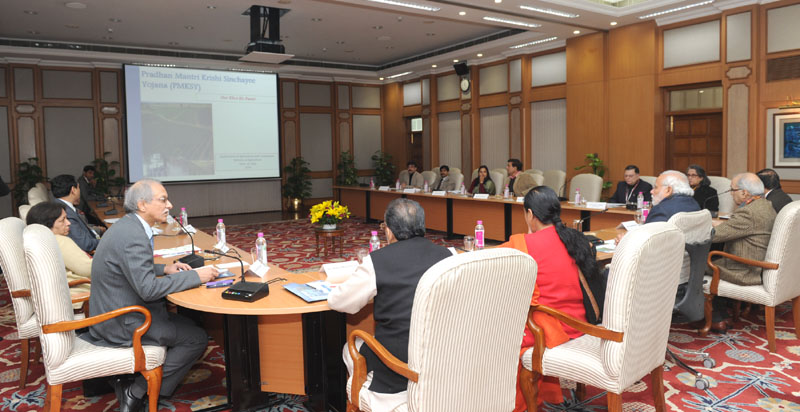 In yet another initiative aimed at benefiting farmers, the Prime Minister has asked concernedDepartments and Ministries of the Union Government to fast-track the Pradhan Mantri KrishiSinchai Yojana. Today's meeting follows yesterday's decision by the Union Cabinet, in whichamendments to the Land Acquisition Act, 2013, were cleared. The amendments include thepro-farmer step of bringing 13 most frequently used Acts for Land
Acquisition for the CentralGovernment Projects into the purview of the Land Acquisition Act, thus benefiting a largenumber of farmers whose land is acquired for such projects. Chairing a high-level meeting involving the Ministries of Agriculture, Water Resources, RuralDevelopment, the Prime Minister called for a multi-pronged approach to the ultimate goal ofproviding irrigation for every farm through the Pradhan Mantri Krishi Sinchai Yojana.
The Prime Minister noted that NREGA had been used over the past few years for creation andaugmentation of irrigation assets. He said that NREGA should be integrated with the overallplan of Pradhan Mantri Krishi Sinchai Yojana.
He also called for precise monitoring ofoutcomes in this regard. At the macro-level, the Prime Minister asked the Ministry of Water Resources to identify river-interlinking projects that could be immediately taken up. The Prime Minister called for comprehensive mapping and identification of water bodiesacross the country.
He said satellite imagery and 3D photography could be used to guidevillages to best possible sources of irrigation.
The Prime Minister has asked concerned departments to look into the possibility of identifyingprogressive farmers, who could take the lead in implementing water conservation andinnovative irrigation techniques.
The Prime Minister has also called for integrating water recycling projects of key towns andcities, to irrigation in nearby rural areas. He emphasized the importance of generatingconsciousness among people towards water conservation. The Union Minister for Water Resources, Ms. Uma Bharati, and the Union Minister forAgriculture, Shri Radha Mohan Singh, were present on the occasion.
INDIAN AGRICULTURE AT A GLANCE
* Agriculture continues to be the backbone of Indian economy.
* Agriculture sector employs 54.6% of the total workforce.
* The total Share of Agriculture & Allied Sectors (Including Agriculture, Livestock, forestry and fishery sub sectors) in terms of percentage of Gross Domestic Product is 13.9 percent during 2013-14 at 2004-05 prices. [As per the estimates released by Central Statistics Office]
* For the 12th Plan (2012-17), a growth target of 4 percent has been set for the Agriculture Sector
* As per the 4th Advance Estimates of Production of food grains for 2013-14, total food grain production is estimated to be 264.77 Million Tonnes.
GROWTH STRATEGY
In order to keep up the momentum gained during the 11th Plan and achieve the targeted growth rate of 4% during the 12th Five Year Plan as also the ensure focused approach and to avoid overlap, all the ongoing 51 schemes of the Department have been restructured into five missions viz. National Food Security Mission (NFSM), Mission for Integrated Development of Horticulture Mission (MIDH), National Mission on Oil Seed and Oil Palm (NMOOP), National Mission for Sustainable Agriculture (NMSA), and National Mission on Agricultural
Extension & Technology (NMAET); five Central Sector Schemes viz. National Crop Insurance Programme (NCIP), Intergrated Scheme on Agri-Census & Statistics (ISAC&S), Integrated Scheme of Agriculture Marketing (ISAM), Integrated Scheme of Agriculture Cooperation (ISAC) and Secretariat Economic Service; and one State Plan Scheme viz. Rashtriya Krishi Vikas Yojana.
Recognizing the importance of Agriculture Sector, the Government during the budget 2014-15 took a number of steps for sustainable development of Agriculture. These steps include enhanced institutional credit to farmers; promotion of scientific warehousing infrastructure including cold storages and cold chains in the country for increasing shelf life of agricultural produce; Improved access to irrigation through Pradhan Mantri Krishi Sichayee Yojana; provision of Price Stabilisation Fund to mitigate price volatality in agricultural produce; Mission mode scheme for Soil Health Card; Setting up of Agri-tech Infrastructure fund for making farming competitive and profitable; provide institutional finance to joint farming groups of “Bhoomi Heen Kisan” through NABARD; development of indigenous cattle breeds and promoting inland fisheries and other non-farm activities to supplement the income of farmers.
Details of the Initiatives are as follows:
* Rashtriya Gokul Mission
India ranks first among the world’s milk producing Nations are such 1998 and milk production peaked at 137.97 million tonnes in 2013-14. India has the largest bovine population in the world. The bovine genetic resource of India is represented by 37 well recognized indigenous Breeds of cattle and 13 breeds of buffaloes. Indigenous bovines are robust and resilient and are particularly suited to the climate and environment of their respective breeding tracts. Rashtriya Gokul Mission a project under the National Program for Bovine Breeding and Dairy Development is being launched with the objective of conserving and developing indigenous Breeds in a focused and scientific manner. The potential to enhance the productivity of the indigenous breeds through professional farm management and superior nutrition, as well as gradation of indigenous bovine germplasm will be done with an outlay of Rs. 550 crores.
* Rail Milk Network
In order to promote Agri Rail Network for transportation of milk, overs have been placed by AMUL and NDDB on behalf of Dairy Cooperative Federations for procurement of 36 new Rail Milk Tankers and will be made available by Railways. This will help in movement of milk from milk surplus areas to areas of demand providing dairy farmers with greater market areas.
* An allocation of Rs. 50 crore for development of indigenous cattle breed has been provided.
* ‘Blue Revolution’ for development of inland fisheries being initiated with a sum of Rs. 50 crore
* Target for providing institutional agricultural credit to farmers during 2014-15 has been enhanced to Rs. 8 lakh crore which is expected to surpass.
* Agriculture credit at a concessional rate of 7% with an interest subvention of 3% for timely repayment will continue during 2014-15.
* An allocation of Rs. 5,000 crore for 2014-15 has been made for scientific warehousing infrastructure for increasing shelf life of agricultural produce and thereby increasing the earning capacity of farmers.
* A higher allocation of Rs. 25,000 crore has been made to the corpus of Rural Infrastructure Development Fund during 2014-15 which helps in creation of infrastructure in agriculture and rural sectors.
* An initial corpus of Rs. 4,000 crore is being created to set up long term rural credit fund in NABARD to give a boost to long term investment credit in agriculture.
* For ensuring increased and uninterrupted credit flow to farmers and to avoid high cost market borrowings by NABARD an amount of Rs. 50,000 crore during 2014-15 has been made for Short Term Cooperative Rural Credit (STCRC-refinance fund).
* To improve access to irrigation, Pradhan Mantri Krishi Sichayee Yojana has been initiated with a sum of Rs. 1,000 crore in the year 2014-15.
* To mitigate price volatility in the agricultural produce a sum of Rs. 500 crore has been provided for Price Stabilization Fund.
* Government has initiated a scheme for Soil Health Card for every farmer in a mission mode with an initial allocation of Rs. 100 crore in 2014-15.
* An additional amount of Rs. 56 crore has been made to set up 100 mobile soil testing laboratories countrywide.
* National Adaptation Fund for climate change has been established with an initial allocation of Rs. 100 crore.
* To protect landless farmers from money lenders 5 lakh joint farming groups of Bhoomiheen Kisan will be financed through NABARD in the current financial year.
* A Kisan TV - Channel dedicated to agriculture will be launched with the initial allocation of Rs. 100 crores in the current financial year.
* An initial allocation of Rs. 200 crore has been allocated for establishing Agriculture Universities in Andhra Pradesh and Rajasthan and Horticulture Universities in Telangana and Haryana.
* An allocation of Rs. 100 crore has been made in the current financial year for setting up of two institutions of excellence in Assam and Jharkhand which will be at par with Indian Agricultural Research Institute, Pusa.
* An allocation of Rs.100 crore is made for 2014-15 for setting up Agri-tech Infrastructure Fund with a view to increasing public and private investments in agriculture and making farming competitive and profitable.
* Various initiatives taken by Government to support agriculture and allied sectors is to sustain the growth rate at 4%.
* In order to increase profitability for small and marginal farmers, Rs. 200 crore has been earmarked for setting up of 2000 Farmer Producer Organisations.
* Wage employment under MGNREGA will be mainly used for more productive asset creation substantially linked to agriculture & allied activities.
* Sum of Rs. 14,389 crore for Pradhan Mantri Gram Sadak Yojana for 2014-15 which will improve access for rural population including farmers.
* With a view to promoting farmers and consumers interest setting up of a national market will be accelerated by encouraging States to modify their APMC Act and other market reforms.
* With a view to develop commercial organic farming in the North Eastern Region a sum of Rs. 100 crore has been allocated.
Central Government recognizes and discharges its responsibility to assist State Governments in overall development of Agriculture sector.
Effective policy measures are in position to improve agricultural production and productivity and address problems of farmers. State Governments are also impressed upon to allocate adequate funds for development of agriculture sector in State plan, as well as initiate other measures required for achieving targeted agricultural growth rate and address problem of farmers.
Year end Review for the Ministry of Agriculture for the Year 2014-15
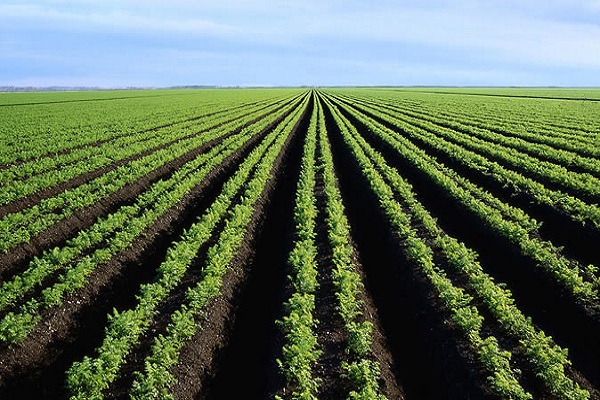 The Immediate challenge to the Ministry of Agriculture when the new Government had taken over, was to sustain the increasing agricultural output of the country in the face of impending deficit rainfall in this year 2014-15. All the requisite preparatory measures were made in coordination with the State governments to have the District-wise contingency action plans in place and to bring in flexibility in the various schemes in order that the States are enabled to cope with any desired changes in the Approved Action Plans for tackling the situation arising out of deficit rainfall.
With the perspective the Central Research Institute for Dry Land Agriculture (CRIDA) in collaboration with State Agricultural Universities and the State Governments has prepared crop contingency plans in respect of 576 districts across the country. Further, all necessary and appropriate steps have been taken to meet the seed and fertilizer requirement and to disseminate information and on suitable farming practices to be followed in such a situation.
INDIAN AGRICULTURE AT A GLANCE
* Agriculture continues to be the backbone of Indian economy.
* Agriculture sector employs 54.6% of the total workforce.
* The total Share of Agriculture & Allied Sectors (Including Agriculture, Livestock, forestry and fishery sub sectors) in terms of percentage of Gross Domestic Product is 13.9 percent during 2013-14 at 2004-05 prices. [As per the estimates released by Central Statistics Office]
* For the 12th Plan (2012-17), a growth target of 4 percent has been set for the Agriculture Sector
* As per the 4th Advance Estimates of Production of food grains for 2013-14, total food grain production is estimated to be 264.77 Million Tonnes.
GROWTH STRATEGY
In order to keep up the momentum gained during the 11th Plan and achieve the targeted growth rate of 4% during the 12th Five Year Plan as also the ensure focused approach and to avoid overlap, all the ongoing 51 schemes of the Department have been restructured into five missions viz. National Food Security Mission (NFSM), Mission for Integrated Development of Horticulture Mission (MIDH), National Mission on Oil Seed and Oil Palm (NMOOP), National Mission for Sustainable Agriculture (NMSA), and National Mission on Agricultural
Extension & Technology (NMAET); five Central Sector Schemes viz. National Crop Insurance Programme (NCIP), Intergrated Scheme on Agri-Census & Statistics (ISAC&S), Integrated Scheme of Agriculture Marketing (ISAM), Integrated Scheme of Agriculture Cooperation (ISAC) and Secretariat Economic Service; and one State Plan Scheme viz. Rashtriya Krishi Vikas Yojana.
Recognizing the importance of Agriculture Sector, the Government during the budget 2014-15 took a number of steps for sustainable development of Agriculture. These steps include enhanced institutional credit to farmers; promotion of scientific warehousing infrastructure including cold storages and cold chains in the country for increasing shelf life of agricultural produce; Improved access to irrigation through Pradhan Mantri Krishi Sichayee Yojana; provision of Price Stabilisation Fund to mitigate price volatality in agricultural produce; Mission mode scheme for Soil Health Card; Setting up of Agri-tech Infrastructure fund for making farming competitive and profitable; provide institutional finance to joint farming groups of “Bhoomi Heen Kisan” through NABARD; development of indigenous cattle breeds and promoting inland fisheries and other non-farm activities to supplement the income of farmers.
Details of the Initiatives are as follows:
* Rashtriya Gokul Mission
India ranks first among the world’s milk producing Nations are such 1998 and milk production peaked at 137.97 million tonnes in 2013-14. India has the largest bovine population in the world. The bovine genetic resource of India is represented by 37 well recognized indigenous Breeds of cattle and 13 breeds of buffaloes. Indigenous bovines are robust and resilient and are particularly suited to the climate and environment of their respective breeding tracts. Rashtriya Gokul Mission a project under the National Program for Bovine Breeding and Dairy Development is being launched with the objective of conserving and developing indigenous Breeds in a focused and scientific manner. The potential to enhance the productivity of the indigenous breeds through professional farm management and superior nutrition, as well as gradation of indigenous bovine germplasm will be done with an outlay of Rs. 550 crores.
* Rail Milk Network
In order to promote Agri Rail Network for transportation of milk, overs have been placed by AMUL and NDDB on behalf of Dairy Cooperative Federations for procurement of 36 new Rail Milk Tankers and will be made available by Railways. This will help in movement of milk from milk surplus areas to areas of demand providing dairy farmers with greater market areas.
* An allocation of Rs. 50 crore for development of indigenous cattle breed has been provided.
* ‘Blue Revolution’ for development of inland fisheries being initiated with a sum of Rs. 50 crore
* Target for providing institutional agricultural credit to farmers during 2014-15 has been enhanced to Rs. 8 lakh crore which is expected to surpass.
* Agriculture credit at a concessional rate of 7% with an interest subvention of 3% for timely repayment will continue during 2014-15.
* An allocation of Rs. 5,000 crore for 2014-15 has been made for scientific warehousing infrastructure for increasing shelf life of agricultural produce and thereby increasing the earning capacity of farmers.
* A higher allocation of Rs. 25,000 crore has been made to the corpus of Rural Infrastructure Development Fund during 2014-15 which helps in creation of infrastructure in agriculture and rural sectors.
* An initial corpus of Rs. 4,000 crore is being created to set up long term rural credit fund in NABARD to give a boost to long term investment credit in agriculture.
* For ensuring increased and uninterrupted credit flow to farmers and to avoid high cost market borrowings by NABARD an amount of Rs. 50,000 crore during 2014-15 has been made for Short Term Cooperative Rural Credit (STCRC-refinance fund).
* To improve access to irrigation, Pradhan Mantri Krishi Sichayee Yojana has been initiated with a sum of Rs. 1,000 crore in the year 2014-15.
* To mitigate price volatility in the agricultural produce a sum of Rs. 500 crore has been provided for Price Stabilization Fund.
* Government has initiated a scheme for Soil Health Card for every farmer in a mission mode with an initial allocation of Rs. 100 crore in 2014-15.
* An additional amount of Rs. 56 crore has been made to set up 100 mobile soil testing laboratories countrywide.
* National Adaptation Fund for climate change has been established with an initial allocation of Rs. 100 crore.
* To protect landless farmers from money lenders 5 lakh joint farming groups of Bhoomiheen Kisan will be financed through NABARD in the current financial year.
* A Kisan TV - Channel dedicated to agriculture will be launched with the initial allocation of Rs. 100 crores in the current financial year.
* An initial allocation of Rs. 200 crore has been allocated for establishing Agriculture Universities in Andhra Pradesh and Rajasthan and Horticulture Universities in Telangana and Haryana.
* An allocation of Rs. 100 crore has been made in the current financial year for setting up of two institutions of excellence in Assam and Jharkhand which will be at par with Indian Agricultural Research Institute, Pusa.
* An allocation of Rs.100 crore is made for 2014-15 for setting up Agri-tech Infrastructure Fund with a view to increasing public and private investments in agriculture and making farming competitive and profitable.
* Various initiatives taken by Government to support agriculture and allied sectors is to sustain the growth rate at 4%.
* In order to increase profitability for small and marginal farmers, Rs. 200 crore has been earmarked for setting up of 2000 Farmer Producer Organisations.
* Wage employment under MGNREGA will be mainly used for more productive asset creation substantially linked to agriculture & allied activities.
* Sum of Rs. 14,389 crore for Pradhan Mantri Gram Sadak Yojana for 2014-15 which will improve access for rural population including farmers.
* With a view to promoting farmers and consumers interest setting up of a national market will be accelerated by encouraging States to modify their APMC Act and other market reforms.
* With a view to develop commercial organic farming in the North Eastern Region a sum of Rs. 100 crore has been allocated.
Central Government recognizes and discharges its responsibility to assist State Governments in overall development of Agriculture sector.
Effective policy measures are in position to improve agricultural production and productivity and address problems of farmers. State Governments are also impressed upon to allocate adequate funds for development of agriculture sector in State plan, as well as initiate other measures required for achieving targeted agricultural growth rate and address problem of farmers.
AgriCon 2014 Conference on Farm Mechanization & Post Harvest Technologies
 I take pleasure in informing that the Tamil Nadu Technology Development & Promotion Center of CII is organizing the third edition of AgriCon 2014: Conference on Farm Mechanization & Post Harvest Technologies on 19th December 2014 at Hotel Hilton, Chennai.
In the context of increasing commercialization of agriculture, farm mechanization has been helpful to bring about a significant improvement in agricultural productivity. The factors that justify the strengthening of farm mechanization in the country can be numerous. The present trend in agricultural mechanization is for high capacity machines through custom hiring and for contractual field operations. The pace of farm mechanization in the country accelerated with the manufacture of agricultural equipment by the local industries. However, mechanization of horticulture, plantation crops and commercial agriculture is yet to be introduced in the country. In future this calls for developing appropriate technologies for mechanization.
The conference attempts to support this growth and understand the trends in farm mechanization and post harvest management. The conference aims to focus on key growth parameters like technology innovation, new products, new markets, next-generation technology, & implications for allied industries.
We have invited Thiru. Agri SS Krishnamoorthy, Hon’ble Minister for Agriculture, Government of Tamil Nadu to deliver the Inaugural Address at the conference Inaugural Session.
Prominent speakers already confirmed includes
· Mr. Rajesh Lakhoni, IAS, Secretary & Agricultural Production Commissioner, Government of Tamil Nadu
· Mr. A Padmasingh Isaac, Chairman & Managing Director, AACHI Group of Companies
· Mr. Menahem Kanafi, Consul General of Israel – Bengaluru
· Mr. TR Kesavan, Chief Operating Officer, TAFE Limited
· Mr. KVSN Raju, President, ELICO Limited
· Mr. Sirish Batchu, Head - Infotronics Technology & Advance Electronics, Automotive & Farm Sectors, Mahindra & Mahindra
· Dr. S Narayanan, Senior Vice President, Jain Irrigation Systems Limited
· Mr. Gopinath Koneti, Executive Vice President & Head - South India, Food & Agribusiness Strategic Advisory & Research, YES Bank Limited
· Mr. Ashok Nair, Vice President – Operations, RML
· Lt. Col. Venkat Bollapragada, Associate Vice President & Zonal Head-South, Kirloskar Brothers Limited
· Mr. D Jayavijayan, Managing Director, Southern Agro Engines (P) Limited
· Mr. Prabhu Shankar, Managing Director, IAC Agro Engineering (P) Limited
Prominent speaker have been already invited includes Mr. Ashish Bahuguna, IAS, Secretary, Department of Agriculture & Cooperation, Ministry of Agriculture; Dr. K. Alagusundaram, Deputy Director General (Agricultural Engineering), ICAR; Mr. Satish Nadiger, Managing Director & CEO, John Deere India Private Limited; Mr. Sridar Narayanswami, Managing Director,
Emerson Climate Technologies; Dr. Lakshmi Narayanan, Whole Time Director, TStanes & Company Limited; Mr. Anil kumar Menon, Managing Director, GEA Farm Technologies; Mr. Rakesh Malhotra, Managing Director, New Holland Fiat (India) Pvt. Limited; Mr. Dinesh Khanna, Director (Marketing & Sales), KSB Pumps Limited; Mr. P Sudhir Kumar, Vice President, Frick India Limited; Mr. Harbans Lal, Director, Pennwalt; Mr. Ramachandran Sridhar, Whole Time Director, SHRIRAM Capital Limited; Mr. Randhir Chauhan, Managing Director, Netafim Irrigation India Pvt. Limited; Mr. Gurmeet Singh Grewal, Country Head, Kubota Agricultural Machinery India Pvt. Ltd
The conference aims to cover the key areas in the following sessions:
· Session I Water and Soil Management
· Session II: Emerging Technologies in Mechanized Agriculture
· Session III: Structure and Control Environment Technology
· Session IV: Smart Farming
Around 200 senior management personnel representing Industry leaders & senior executives of leading manufacturers of agriculture machinery companies, ICT Companies, agro based companies, agricultural universities, central universities and labs, fresh produce exporters; progressive farmers; retail chains and government agencies are expected to attend this conference.
I am writing you to invite you to participate and also nominate senior colleagues from your organization to attend this important conference. Please confirm your participation / nominations by completing the enclosed registration form and sending it to us by fax/email at the earliest.
Click here to register online : http://tntdpc.com/agricon_2014/register.php
For more details about conference registration and sponsorship please contact Mr. Hariharan TP @ Mob. 09788790347 / hariharan.tp@cii.in
I look forward to your participation.
With regards,
S Chandramohan
Conference Chairman – AgriCon 2014
President & Group CFO
TAFE Limited
SOIL CONSERVATION ENABLES INCREASING AGRICULTURE PRODUCTION
Bhopal, 5th Dec’14: Soil is linked to everything around us and performs many important roles in sustaining life on Earth. All soils support biomass production, whether it is natural vegetation or planted for agriculture and forestry. From the smallest seedling to the largest tree, all land-based vegetation depends on soil to provide them with nutrients, water and root support. In turn, this vegetation supports animal life on land. Soil and water quality are very closely linked and, to a significant extent, soil properties determine water quality. As water passes through soil it is filtered and purified which helps to generate clean and wholesome groundwater. Soil organic matter is an extremely important component of soil. It improves nearly all soil properties (e.g. moisture retention, soil structure, drainage, nutrient storage) and therefore plays a vital role in many functions of soil. Afforestation programmes will help to avoid soil erosion. Contour bunding is one the methods for effective soil conservation. World Soil Day is celebrated on 5th December across the year every year.
Soil biodiversity
Soil biodiversity refers both to the relationship of soil to biodiversity and to aspects of the soil that can be managed in relation to biodiversity. Soil biodiversity relates to some catchment management considerations. Biodiversity and soil are strongly linked, because soil is the medium for a large variety of organisms, and interacts closely with the wider biosphere. Conversely, biological activity is a primary factor in the physical and chemical formation of soils. Soil provides a vital habitat, primarily for microbes (including bacteria and fungi), but also for microfauna (such as protozoa and nematodes), mesofauna (such as microarthropods and enchytraeids), and macrofauna (such as earthworms, termites, and millipedes). The primary role of soil biota is to recycle organic matter that is derived from the "above-ground plant-based food web". Soil is in close cooperation with the wider biosphere. The maintenance of fertile soil is "one of the most vital ecological services the living world performs", and the "mineral and organic contents of soil must be replenished constantly as plants consume soil elements and pass them up the food chain". The correlation of soil and biodiversity can be observed spatially. For example, both natural and agricultural vegetation boundaries correspond closely to soil boundaries, even at continental and global scales.
Effects of climate change on soil
Although the earth’s climate has been slowly evolving over millions of years, rapid changes have occurred in recent times due to the activities of humans. Climate change is now recognised as something which is affecting all our lives. Soil is a part of the natural world that is both affected by and contributing to global warming. Soil is the one of the largest sources of carbon in the world. It is primarily accumulated through plants which ‘fix’ the carbon from carbon dioxide in the air; the soil then directly absorbs the carbon as the plants decay. Additionally, dead leaves and animals are broken down by microbes in the soil and carbon is accumulated. The change in temperature and rainfall patterns is also damaging the physical structure of soils. The organic matter in particular is being affected, its balance being crucial to the nutrient balance of the soil, its stability, the amount of water it can hold, and the populations of soil organisms. Additionally, the changes are likely to leave some soils more vulnerable to damage by erosion.
Soil quality
Soil quality is a measure of the condition of soil relative to the requirements of one or more biotic species and or to any human need or purpose. According to the United States Department of Agriculture Natural Resources Conservation Service, "Soil quality is the capacity of a specific kind of soil to function, within natural or managed ecosystem boundaries, to sustain plant and animal productivity, maintain or enhance water and air quality, and support human health and habitation." The European Commission's Joint Research Centre defined that "Soil quality is an account of the soil's ability to provide ecosystem and social services through its capacities to perform its functions under changing conditions." Soil quality reflects how well a soil performs the functions of maintaining biodiversity and productivity, partitioning water and solute flow, filtering and buffering, nutrient cycling, and providing support for plants and other structures. Soil management has a major impact on soil quality.
Factors for deterioration of soil quality
Soil quality is at risk from a number of threats driven by a range of man-made and natural pressures including climate change, land use change and land management practices. Human activities have changed the character and quality of our soils over time. We have destroyed protective vegetation cover and have kept soil bare for long periods of time. We also actively add nutrients and pesticides to soils and cover them with housing and infrastructure. All of these activities can impair, or even destroy, the ability of soil to carry out its essential functions. Climate change is a long-term change of weather patterns including temperature, wind and rainfall. Global warming is enhanced by human activities that increase atmospheric concentrations of greenhouse gases that trap the sun’s heat and warm Earth’s surface. Sealing is the permanent covering of soil with hard surfaces such as roads and buildings. The impacts that the sealing of soils can have are- loss of all soil functions; loss of high quality agricultural land; loss of natural habitat; increased flood risk by making run-off more rapid and peak discharge greater; habitat fragmentation. Compaction is the process by which soil particles are forced closer together reducing soil porosity. This is caused by heavy machinery traffic and, to a lesser extent, by animals trampling on wet soils.
Soil erosion and nutrient Losses
Soil erosion is the washing or blowing away (by wind or water) of the top layer of soil (dirt). This is a serious problem for people who want to grow crops. Crops are the foods that farmers grow. If the soil has eroded, the crops will not grow very well. Soil erosion was a big problem in the Midwestern United States in the 1930s dust bowl. Erosion also leaves large holes in the earth, which can weaken buildings and even cause them to collapse. Soil erosion can be conserved in several ways. Planting wind breaks can be effective. A wind break is a line of plants that are planted to stop or slow the wind. A thick row of bushes planted next to a field of plants can stop the wind from blowing the soil away. This method also helps against water erosion, as the soil gets caught up against the roots of the bushes, rather than washing away. Terrace farming can also be effective. Terraces are level places that have been made by people on hill sides. People can cut level sides into the side of hills to create a place to grow crops. If the crops are growing on a slope, then one should plant them in lines that run across, the slope, rather than up and down. So, if the slope goes downhill to the south, then the plants should be in rows that run from east to west. To prevent decomposition the government can put up groynes (wooden planks) along the beaches, or they could build sea walls against the cliffs. 5% in Australia is caused by rainfall. Contour bunding is a proven sustainable land management practice for marginal, sloping, and hilly land where the soil productivity is very low. Farmers use a multi-step process to promote the formation of rough terraces along contour lines on sloping land. First the vegetation on the shifting cultivation plot (mostly fodder and forage trees and bushes) is cut down and the leaves and small twigs removed from the branches by slashing. All the material is left on the surface to dry. The leaves and twigs gradually decompose. After a few weeks, the remaining dry material is rolled into bundles and arranged along contour lines. The material is anchored with pegs, stones, and (where possible) tree stumps. This is the beginning of the contour bund. The farmers then incorporate the remaining leaf litter and decomposed organic matter into the soil between the bunds and plant crops. Over time, as the soil gradually deposits above each bund and is eroded below, rough terraces are formed. The process is labour intensive and farmers need to regularly check and maintain the bunds to allow the soil to collect.
Agriculture and Soil Health
Agriculture and other users of land are challenged to develop strategies for sustainability that conserve non-renewable natural resources such as soil. Much attention has been paid in recent decades to mitigating soil erosion through physical conservation measures and to providing supplementary nutrients and water to meet crop needs. Less consideration has been paid to the soil as a dynamic living resource, although its condition is vital to both the production of food and fibre and to global balance and ecosystem function. The quality and health of soil determine agricultural sustainability, environmental quality and as a consequence of both plant, animal and human health. A healthy soil has the ability to perform or function according to its potential, and to change over time due to human use and management or to natural events. Soil health is enhanced by management and land-use decisions that consider the multiple functions of soil and that take into account that soil is a living organism. Without maintenance of biodiversity, the soil's capacity to recover from natural or anthropogenic perturbations may well be reduced. Similarly, maintenance of the soil's capacity to perform functional processes, such as those associated with nutrient cycling and the breakdown of organic matter, is important in order to sustain plant growth in the long-term.
Impact of synthetic fertilizers
Agriculture has relied on the use of natural fertilizers -- substances that increase the nutrient levels of soil for most of human history. Synthetic fertilizers made an entrance at the end of the 19th century and paved the way for modern agricultural production. Their use increased crop yields and brought on an agricultural revolution, the likes of which the world had not seen before. Synthetic fertilizers continue to have far-reaching effects, both positive and negative, and are likely to remain a part of human life for some time to come. Synthetic fertilizers have long-term negative effects. Synthetic fertilizers kill beneficial microorganisms in the soil that convert dead human and plant remains into nutrient-rich organic matter. Nitrogen and phosphate-based synthetic fertilizers leach into groundwater and increase its toxicity, causing water pollution. Fertilizers that leach into streams, rivers, lakes and other bodies of water disrupt aquatic ecosystems. Synthetic fertilizers increase the nitrate levels of soil. Plants produced from such soil, upon consumption, convert to toxic nitrites in the intestines. These harmful nitrites react with the hemoglobin in the blood stream to cause methaeglobinaemia, which damages the vascular and respiratory systems, causing suffocation and even death in extreme cases (when blood methaemoglobin level is 80 percent or more). Synthetic fertilizers damage the natural makeup of soil in the long term. Plants that grow in overly fertilized soil are deficient in iron, zinc, carotene, vitamin C, copper and protein.
Organic Farming Helping Soil Health
Organic farming relies heavily on the natural breakdown of organic matter, using techniques like green manure and composting, to replace nutrients taken from the soil by previous crops. This biological process, driven by microorganisms such as mycorrhiza, allows the natural production of nutrients in the soil throughout the growing season, and has been referred to as feeding the soil to feed the plant. Organic farming uses a variety of methods to improve soil fertility, including crop rotation, cover cropping, reduced tillage, and application of compost. By reducing tillage, soil is not inverted and exposed to air; less carbon is lost to the atmosphere resulting in more soil organic carbon. This has an added benefit of carbon sequestration which can reduce green house gases and aid in reversing climate change. Plants need nitrogen, phosphorus, and potassium, as well as micronutrients and symbiotic relationships with fungi and other organisms to flourish, but getting enough nitrogen, and particularly synchronization so that plants get enough nitrogen at the right time (when plants need it most), is a challenge for organic farmers. Crop rotation and green manure ("cover crops") help to provide nitrogen through legumes (more precisely, the Fabaceae family) which fix nitrogen from the atmosphere through symbiosis with rhizobial bacteria. Intercropping, which is sometimes used for insect and disease control, can also increase soil nutrients, but the competition between the legume and the crop can be problematic and wider spacing between crop rows is required. Crop residues can be ploughed back into the soil, and different plants leave different amounts of nitrogen, potentially aiding synchronization. Organic farmers also use animal manure, certain processed fertilizers such as seed meal and various mineral powders such as rock phosphate and green sand, a naturally occurring form of potash which provides potassium. All together these methods help to control erosion. In some cases pH may need to be amended. Natural pH amendments include lime and sulfur, but in the U.S.A. some compounds such as iron sulfate, aluminum sulfate, magnesium sulfate, and soluble boron products are allowed in organic farming.
Integrated Nutrient Management
Integrated Nutrient Management refers to the maintenance of soil fertility and of plant nutrient supply at an optimum level for sustaining the desired productivity through optimization of the benefits from all possible sources of organic, inorganic and biological components in an integrated manner. The main concept of INM is to provide regulated nutrient supply for optimum crop growth and higher productivity, improvement and maintenance of soil fertility and zero adverse impact on agro – ecosystem quality by balanced fertilization of organic manures, inorganic fertilizers and bio- inoculants.
Vermicompost
Vermicomposting is the process of turning organic debris into worm castings. The worm castings are very important to the fertility of the soil. The castings contain high amounts of nitrogen, potassium, phosphorus, calcium, and magnesium. Castings contain: 5 times the available nitrogen, 7 times the available potash, and 1 ½ times more calcium than found in good topsoil. Several researchers have demonstrated that earthworm castings have excellent aeration, porosity, structure, drainage, and moisture-holding capacity. The content of the earthworm castings, along with the natural tillage by the worms burrowing action, enhances the permeability of water in the soil. Worm castings can hold close to nine times their weight in water. “Vermiconversion,” or using earthworms to convert waste into soil additives, has been done on a relatively small scale for some time. A recommended rate of vermicompost application is 15-20 percent. Vermicompost is nothing but the excreta of earthworms, which is rich in humus and nutrients. We can rear earthworms artificially in a brick tank or near the stem / trunk of trees (specially horticultural trees). By feeding these earthworms with biomass and watching properly the food (bio-mass) of earthworms, we can produce the required quantities of vermicompost.
IISS
The Indian institute of Soil Science (ICAR-IISS) was established on 16th April, 1988 at Bhopal with a mandate of “Enhancing Soil Productivity with Minimum Environmental Degradation”. In order to accomplish the mandate of the institute, it has given the priority to soil health related issues faced by farmers and other stakeholders. IISS has emerged as a leader in basic and strategic research on soils in the country. It has achieved significant success in the areas of integrated nutrient management, impact on soil under long-term cropping, technology for preparation of enriched composts, soil test based nutrient prescriptions, generation of district-wise GIS based soil fertility maps, organic farming practices, carbon sequestration in soils, sink capacity of soils for heavy metal pollutants, recycling of wastes, soil microbial diversity and biofertilizers, quality standards for municipal solid waste composts etc. The institute has to take up the emerging challenges of increasing food-grain production and ensuring food and nutritional security from shrinking land resources, characterizing and conserving large soil-biodiversity for appropriate deployment in agriculture, achieving self reliance in crop fertilization through indigenous mineral and by-product sources, developing efficient technologies for waste recycling, maintaining soil quality and ecological balance, and developing energy efficient agriculture and sequestering carbon by reorienting it's research pursuits addressing the emerging issues viz., enhancing nutrient and water use efficiency; sustaining soil and produce quality; soil biodiversity and genomics, climate change and carbon sequestration; minimizing soil pollution etc.
* World Soil Day is celebrated on 5th December across the year every year.
 FARMER WELFARE FUND WILL BE CREATED
FARMER WELFARE FUND WILL BE CREATED
Shivraj Singh Chouhan
CM of MadhyaPradesh Reviews Agriculture development and Farmer welfare department.
|

